Your vote counts! Remember to vote




the Legislative Black Caucus of Maryland.





the Legislative Black Caucus of Maryland.
By Ashlee Banks Special to the AFRO
The Congressional Black Caucus Foundation (CBCF) will hold its 53rd Annual Legislative Conference at the Walter E. Washington Convention Center in Washington, D.C. Sept. 11-15.
The convention, which is themed “From Vision to Victory: Amplifying Black Voices,” will focus on issues facing the Black community such as affordable housing, voting rights and the use of artificial intelligence.
The CBCF defines the conference as a “unique platform” that provides leaders, legislators,
influencers and citizens with a stage to address issues and “promote the political, economic, and social advancement of Black communities.”
U.S. Rep. Glenn Ivey (DMd.) told the AFRO that he is looking forward to this year’s conference.
“It’s great for CBC members to have a chance to really highlight a particular issue or issues of importance to them that might not get the spotlight that these issues deserve, especially when we’re in the minority,” said Ivey.
“It’s also great to have it happen at a time when so many people are coming together from around the country for CBC weekend.
It’s a party and a celebration,
By Ariyana Griffin AFRO Staff Writer agriffin@afro.com
but it’s kind of a party with a purpose,” added the Democratic lawmaker.
U.S. Rep. Lisa Blunt Rochester (D-Del.) told the AFRO that the CBCF conference historically propels the Black community forward.
“The CBCF legislative conference is where members of Congress, along with local public officials, community and religious leaders, creatives, influencers and the private sector intersect for the uplift and advancement of our communities and country,” said Rochester.
“Our caucus has been at the forefront of some of the biggest wins of this administration,” she added.
“From infrastructure funding, the Safer Communities Act,
The Congressional Black Caucus Foundation (CBCF) will host its 53rd annual legislative conference on Sept. 11-15 at the Walter E. Washington Convention Center, located at 801 Allen Y. Lew Place in Northwest, Washington, D.C. The multi-day convention will host over 80 events around Washington, D.C. providing networking opportunities, and a chance to hear from leaders in everything from agriculture and artificial intelligence to politics and more.
Each year, the organization hosts a variety of signature events such as the Phoenix Awards and the Day of Healing, which serves as a time for legislators and stakeholders in the Black community to come together with a message of unity and strength as they chisel away at challenges facing the African-American community.
Special musical guests for the 2024 day of Healing include both Zacardi Cortez and Pastor Beverly Crawford. Bishop Paul S. Morton will deliver a keynote address at the event, which
“The CBCF legislative conference is where members of Congress, along with local public officials, community and religious leaders, creatives, influencers and the private sector intersect for the uplift and advancement of our communities and country.”
supporting small businesses, the CHIPS and Science Act, to advocating for student debt relief, CBC delivers.”
U.S. Rep. Kweisi Mfume (D-Md.) told the AFRO that the conference is a muchneeded experience that drives
policy to advance political, economic and social agendas.
“The [conference] is an unrivaled forum that gathers thousands of thought leaders, legislators, influencers and citizens together to champion causes and find solutions to
takes place on Sept. 14 at 7:30 a.m. inside of the convention center. Take a look at some of the other social events that will take place during the week below!
Networking opportunities, mixers and receptions
2024 Presidential Election Debate Busboys and Poets’, 2021 14th St NW Washington, D.C., will broadcast the 2024 presidential debate with VP Kamala Harris and former President Donald Trump on Sept. 10. The watch party is free and open to the public from 9 p.m. - 11 p.m.
ALC Welcome Reception
On Sept. 11 the ALC Welcome Reception will be hosted by the American Investment Council (AIC) and the National Association of Investment Companies (NAIC) from 4 to 6 p.m. inside of the Walter E. Washington Convention Center, Room146.
Hip Hop Caucus
On Sept. 11 the Hip Hop Caucus will celebrate
issues that deeply affect the overall Black community,” said Mfume.
He added that this year is historic because “America has the opportunity to elect its first female, AfricanAmerican president in Kamala Harris” and this conference will “help steer this momentum forward.” Rep. Rochester told the AFRO that “everything is at stake” as it pertains to the November election and that this year’s conference could impact the election results.
“As my dear friend Congressman Jim Clyburn reminds us, this election is not just the most important of our lifetime, it’s the most consequential,” said Rochester. “CBC is rising to meet this moment together.”
its 20th year in operation at Howard University’s Blackburn Center. The Hip Hop Caucus has a full day of events planned, including a town hall and reception where speakers like Dr. Roger Mitchell Jr., Lita Rosario-Richardson, Dawn Richard and Paige Hurd will be in attendance.
The Respect My Vote! Block Party will take place from 2 to 5:30 p.m., featuring DJ Akademiks on the ones and twos.
Alpha Phi Alpha Fraternity, Omicron Lambda Alpha Chapter
The men of Alpha Phi Alpha Fraternity’s Omicron Lambda Alpha Chapter will host their annual Congressional Black Caucus mixer on Sept. 11 at The Park at Fourteenth, located at 920 14th Street Washington, D.C. The event begins at 5 p.m., with legislators such as Congresswoman Nikema Williams (GA-5), Congressman Al Green (TX-9), and Congressman Bobby Scott (VA-3) all confirmed to be in attendance.

By Renata Sago Word in Black
As students at four colleges in New York, Ohio and Pennsylvania head back to campus this fall, they will have access to a new resource where they can learn how to dismantle false beliefs about racial hierarchies.
Seven years after launching its Truth, Racial Healing and Transformation program in colleges, the American Association of Colleges and Universities has expanded the program, opening centers at Antioch University and Bard College, Cuyahoga Community College and Elizabethtown College.
The new centers give professors, administrators, faculty members and students a dedicated space to learn and guide discussions around race, gender, age, class and spiritual beliefs. It’s part of a concerted effort to bring healing dialogues throughout the United States within higher education institutions.
“We don’t dictate to any institution how they are implementing, how they will implement and realize the goals of TRHT or how they would implement the TRHT areas within their institutional context,” says Tia McNair, senior consultant with the American Association of Colleges and Universities. “They look at their strategic priorities, their student population, their community relationships,
and partnerships to develop what we call an action plan. So each institution does it differently.”
The campus centers began in 2017 as a concept that was part strategic, part organic. The ten initial host institutions — a mix of public and private schools — introduced various approaches for dismantling racial bias on campus, including racial healing circles and special dinners intended to create safe spaces for sensitive dialogue.
Since then, schools have continued to embrace virtual and in-person conversations that provide gentle reassurance — and sometimes uncomfortable exposure — to past and present-day events that have shaped views on race in society.
The host institutions range from liberal arts colleges and historically black colleges and universities to faith-based institutions and community colleges. The selection process for colleges includes training on how to speak the language of racial healing within the Institute on Truth, Racial Healing and Transformation’s framework.
The former executive director for the TRHT Campus Centers, McNair says the TRHT program is essential now more than ever.
“There are attacks happening on the work

At a time when some campuses are
and
programs, four select colleges are opening Truth, Racial Healing and Transformation centers.
of diversity, equity, and inclusion, and our institutions within our communities, within our states, across the board,” says McNair. “I think that knowing that the growing majority of undergraduate students in this country are from racially minoritized groups…is critical for us to maintain and expand resources to help the success of all students.”
In its tracking of 196 campuses in 29 states, The Chronicle of Higher Education found that colleges throughout the United States have eliminated their DEI programs due to political pressure, establishing an “inconsistent and confusing landscape.”
The effects of these changes are unclear, which is why McNair, who is also a partner at SOVA, a higher education consulting firm in Washington, D.C., would like for campus centers to

be fully prepared — not at a fault of your own, but just because of circumstances – not fully prepared to succeed in the same way as others, then how do we help you? How do we make sure that we actually live our commitment? That we fulfill our commitment to you as being part of this educational journey so that everyone has the opportunity to thrive?” said McNeir.
create some opportunities for personal and professional development for marginalized students.
“Whether you are the student who is coming into the environment that may not
When education reform takes place at the federal, state, or local level, it can have predictable consequences, undoing decades of important work. This is why McNair is hoping that the campus centers will serve as a springboard for repairing old wounds and sustaining supportive principles for community
building beyond campus.
The vision is to encourage ways of thinking that transcend the present political uncertainty, inviting ongoing dialogue and action.
“I think we as educators within higher education play a critical role in preparing the next generation of leaders to build more just and equitable communities,” says McNair.
“This work is not about trying to get anyone to think in the same way we think, but to actually value each and every person’s human dignity, their contributions, their lived experiences in a way where we can transcend what has been causing division and conflict within our communities.”
This article was originally published by Word in Black.
By Quintessa Williams Word In Black
When Vice President Kamala Harris replaced President Joe Biden at the top of the Democratic presidential ticket, she became the first woman of color with a realistic shot at the presidency and an instant inspiration to Black women — some of whom raised $1.3 million on her behalf in just a few hours.
Harris’s groundbreaking campaign has now spearheaded another phenomenon: young Black women are currently leading the recent surge in voter registrations.
According to data from TargetSmart, the voter registration rate for young Black women in 13 key battleground states has skyrocketed to 175 percent — nearly triple the rate from the last presidential election four years ago.
The registration rate for Black women in general, experienced similar growth — increasing by 98 percent, while the overall Black voter rate also rose by 85 percent, according to TargetSmart data.
Since Harris’ nomination, Democrats have significantly out-registered Republicans, highlighting the effectiveness of the Democratic National Committee’s targeted efforts to engage young Black voters.
The civic origins of young Black women
Public education has long been critical to nurturing the civic identities of Black students. After the landmark Brown v. Board of Education decision in 1954, centered on Linda Brown, a Black girl — the ruling enabled Black students to attend better-funded, previously all-White schools.
Black girls and young women were integral in organizing and participating in civil rights protests during the Civil Rights movement, such as the Birmingham Children’s

alyssasieb
The role of public education in civic engagement for Black girls should begin in early grades, well before the legal voting age.
Crusade in 1963. Black girls like Ruby Bridges, who became the first African American child to attend a formerly Whites-only school, risked physical and psychological harm to move the United States closer to its democratic principles. However, the quality of civic education in these integrated schools often varied, with Black students receiving less emphasis in the classroom on African American history and political engagement.
Civic education as a pathway to national political participation
A 2022 report from Child Trends found that Black students were more likely than their peers to report an interest in civic engagement and activities. Drawing on this history and experiences with racism, Black students continue to spearhead civic efforts to promote racial and social justice in the United States. Today, Black children are more likely to use pathways such as social media to engage in activism and promote political awareness and participation among their peers.
Programs like Black Girls Lead and Girls Who Vote have been instrumental in increasing political engagement among Black girls and fostering civic responsibility. These programs provide mentorship and civic
education, which are essential in preparing Black girls to become active voters and community leaders.
In addition, Black youth activism is expressed not only at the local level, such as when a group of girls at Pretoria High School for Girls held a protest earlier in July to highlight alleged racism they experienced, — but also in national movements such as those sparked by the murder of George Floyd when 17-yearold Daniella Fraizer took out her cell phone and recorded his murder in 2020. Such incidents speak to young Black children —particularly Black girls— civically advocating for social justice in their schools and communities.
Surging ahead Black girls, who account for 7.8 percent of the overall K-12 student population in the United States, have led a trend of civic engagement, contributing to increased voter registration among young Black women. Additionally, experts say Harris’ groundbreaking run for the White House has captured the imagination of Black women and girls who see themselves in her.
However, the surge is not an isolated incident but rather a culmination of years of civic education and empowerment initiatives that have prepared these young women to take their place as influential voters.
Hilary Wilson, a doctoral student studying education in Louisiana, believes that the historical cultivation of civic engagement will likely have a lasting impact on Black K-12 education and voter registration turnout moving forward.
“As these young girls and women continue to assert their political power, their influence could extend into shaping educational policies, like more civic education in the classroom, that will benefit predominantly Black schools and communities.”
By AFRO Staff
According to information released by the Congressional Black Caucus Foundation (CBCF), the Congressional Black Caucus (CBC) was founded in 1971, by a total of 13 brave members of the 92nd United States Congress. By 1976, the legislators knew they needed a sister organization to help with their advocacy efforts. The CBCF was created to serve as a “nonprofit, nonpartisan public policy research and educational institute.”
The National Archives reports that the mission of the CBC in the early 70s was to “put forth policy and legislation that ensured equal rights, opportunity, and access to Black Americans and other marginalized communities.”
Still today, members of the organization are living up to their original vision. This week, in honor of CBCF’s 53rd Annual Legislative Conference, the Afro Charities
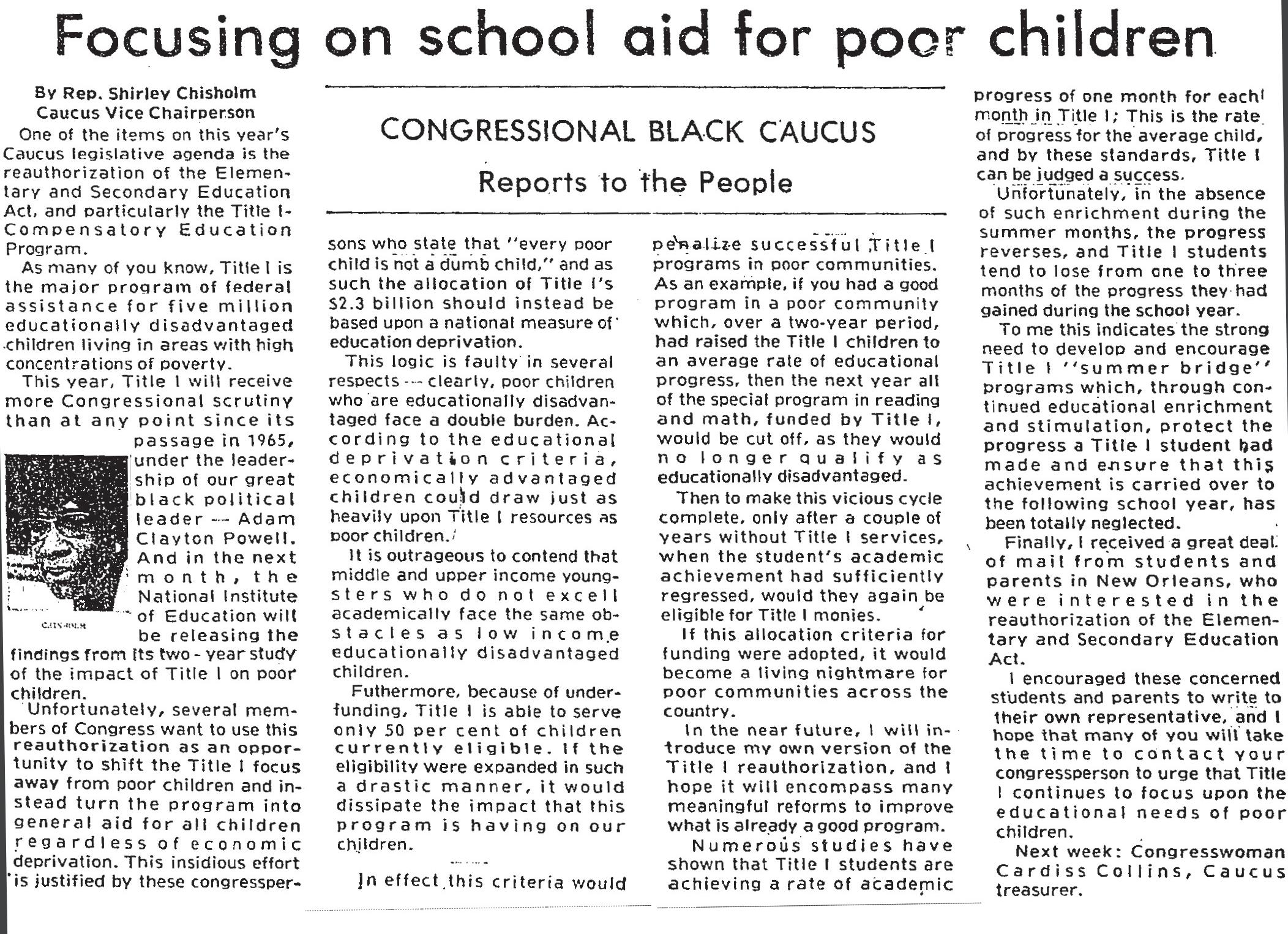

History
Your Community • Your News The Afro-American Newspapers
Baltimore Office • Corporate Headquarters 233 E. Redwood Street 6th Floor, Suite 600G Baltimore, Maryland 21202
410-554-8200 • Fax: 410-554-8213 afro.com
Founded by John Henry Murphy Sr., August 13, 1892
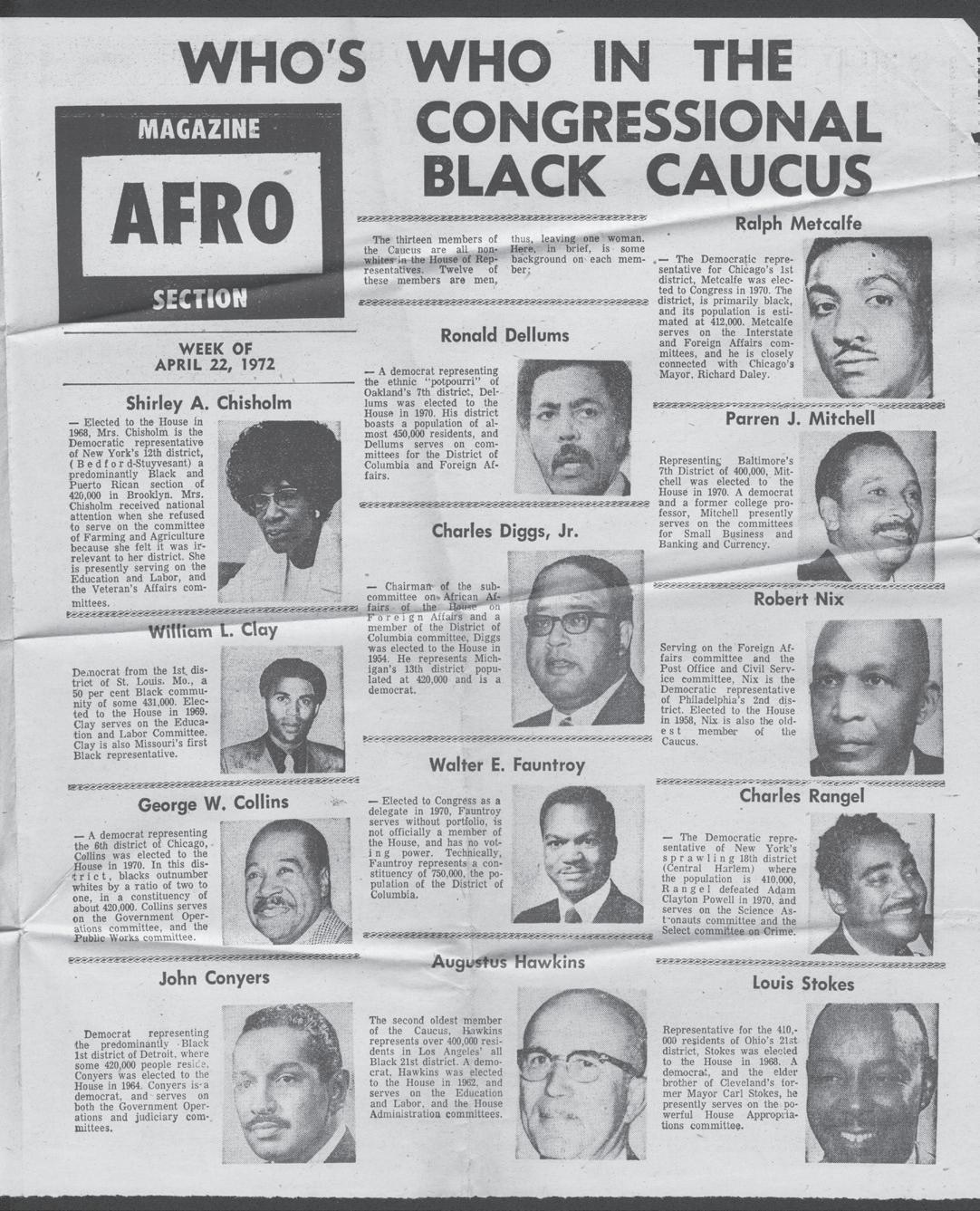
team took a walk through the archives in search of the valiant work of legislators who have made up the Congressional Black Caucus of yesterday and today. Check out the articles and photos below to see how CBC members have advocated for the Black community over the years!
Continued from A1
Black Caucus of the Young Democrats of America
The Black Caucus of the Young Democrats of America will organize a networking event for Black young professionals with an interest in lobbying, advocacy, public service and politics. The event will also raise money for their Joseph L. Kitchen Memorial Scholarship, which awards first generation students who are dedicated to public service. The event will take place at Lost Society, 2001 14th St NW, Washington, D.C. on Sep. 12 at 5:30 p.m. Tickets begin at $10.
Black 2 the Future Action Fund
Black 2 the Future Action Fund will hold the Black Economic Agenda Reception on Sep. 11 from 5 p.m. - 8 p.m. Location will be provided after interested attendees RSVP. The organization seeks to inform elected officials and political candidates about the economic priorities of Black communities nationwide.
Thrive 365
Thrive 365 will raise awareness surrounding the many issues that Black farmers and communities are dealing with regarding food access and security. There will be discussions and actionable recommendations for policies to combat this issue. They are calling for journalists, community leaders, policy experts and people who are interested in fighting against food insecurity and racial equity to attend this free event on Sept. 13 at 600 F Street NW from 1 p.m. - 3 p.m.
Planned Parenthood
Planned Parenthood will host “Our Freedom, Our Futures: Planned Parenthood Celebrates the CBCF ALC,” on Sept. 14. The event will take place at the Ciel Social Club, located at 601 K St NW from 11 a.m. to 2 p.m.
CBC Weekend Social Mixer Come out to Shanklin Hall in NW Washington D.C, for the 2024 CBC Weekend Social Mixer. The event will be a networking opportunity complete with discussions on topics such as business and unity
Chairman of the Board/Publisher - Frances Murphy Draper
(Publisher Emeritus - John J. Oliver Jr.)
President - Benjamin Murphy Phillips IV
VP of Marketing and Technology - Kevin E. Peck
Director Digital Solutions - Dana Peck
Receptionist - Wanda Pearson - 410-554-8200, ext. 246
Director of Operations
Andrè Draper - 410-554-8200
Director of Finance
Bonnie Deanes - 410-554-8242
Executive Director/Director of Advertising Lenora Howze - 410-554-8271 - lhowze@afro.com
Director of Community & Public Relations
Diane W. Hocker - 410-554-8243
Editorial
Managing Editor - Alexis Taylor - 410-554-8257
Special Projects Editor - Dorothy Boulware - 410-554-8231
Editorial Assistant - Ama Brown-Parson
Archivist - Savannah Wood- 410-554-8277
Baltimore Circulation/Distribution Manager Andrè Draper - 410-554-8200
Production Department - 410-554-8200
Washington Office 1140 3rd Street, N.E., 2nd Floor Washington, D.C. 20002-6723
202-332-0080 • Fax: 410-554-8213
(Washington Publisher Emerita - Frances L. Murphy II)
Director of Operations - Andrè Draper - 410-554-8200
Customer Service, Home Delivery and Subscriptions: 410-554-8200
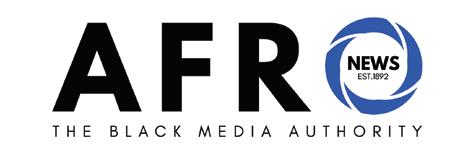
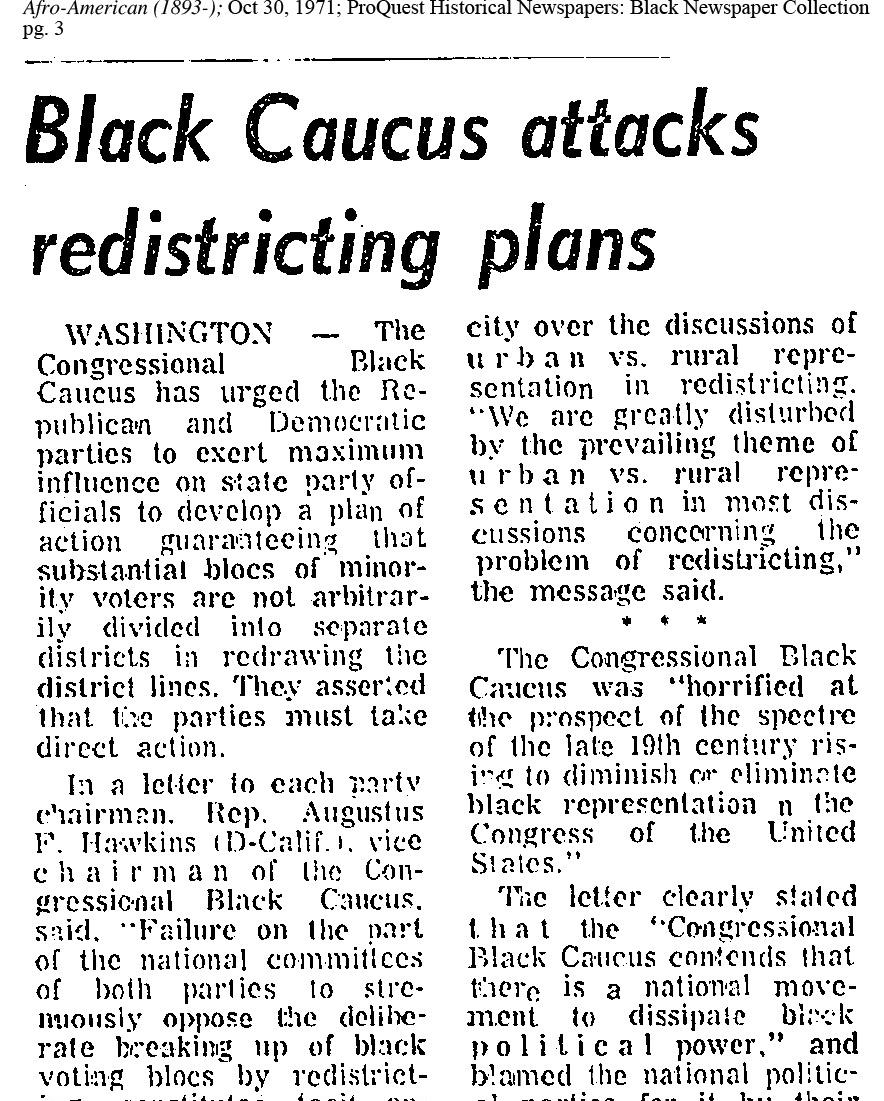
the ninth Annual Caucus Brunch and Day Party from 12 p.m. to 8 p.m. on Sept. 15. Award Shows The National Newspaper Publishers Association The National Newspaper Publishers Association will host their National Leadership Awards Reception. This year’s theme is “Saluting Excellence in Leadership.”
Awards Dinner
highlighting the work of trailblazing advocates and legislators who have done the work of pushing the race forward. This year’s event will take place in Hall E of the Walter E. Washington Convention Center on Sept. 14 from 7 to 9 p.m.



By Henry Beecher Hicks III
“I love my Black job.”
- Simone Biles, three time Olympian, most decorated gymnast in history
In recent weeks, the discussion around what constitutes a “Black job” has reignited a critical conversation about race, identity and the workforce. The term has been used to describe jobs perceived as lower-paying or less desirable, typically occupied by Black workers. However, it is vital to shift this narrative and recognize the substantial contributions Black professionals make across all sectors. Let’s talk about what a “Black job” is - and isn’t.
It is true that, historically, Black professionals have been the backbone of the labor market in the U.S. This country has grown and became a capitalistic global force because of the invaluable, unpaid (until 1863) and still underpaid work of Black citizens. Today, a “Black job” is not about the type of work African Americans are limited to, but rather the opportunities available to Black individuals across all sectors. Unfortunately, there is still a false narrative around the skill and capability of Black professionals and the value of our jobs. Yes, too many Black professionals hold jobs that are lower-paying, and yes, Black professionals have fewer opportunities for advancement.
This has nothing to do with skill, work ethic, or desire. Rather, this stereotype is born out of the cyclical results of poor education options, historical efforts to stifle Black participation in the economy and racism driven disruptions to Black communities and families. More importantly, the same stereotype ignores the achievements of countless Black leaders who have broken barriers and excelled in high-paying jobs and leadership positions.
In fact, in The National Black MBA Association (NBMBAA), our membership of greater than 12,000 continues to defy the stereotype of the recently denigrated “Black job.” More than half of our membership holds MBAs and another 40 percent hold a bachelor degree or masters. With more than 15 years of work experience under their belts, nearly 60 percent of our membership are veterans in their fields.
These are Black professionals who are committed to professional and personal advancement. These are also Black professionals who seek and secure more advanced career opportunities in management and senior leadership. With more than 40,000 professionals in our network and 35 chapters nationwide, NBMBAA plays a crucial role in dismantling the outdated notions of what jobs Black people should or should not hold by providing the resources, networks and opportunities necessary to
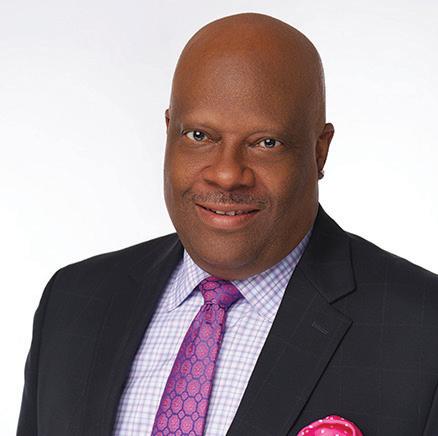
Courtesy photo
Henry Beecher Hicks III is president and CEO of the National Black MBA Association. Hicks is an accomplished executive with a background as an investment banker, private equity investor, working in the executive branch of government, and as an entrepreneur. A lifetime member of the National Black MBA Association (NBMBAA), Hicks stepped into the role of president and CEO in October 2023. This week, he discusses the importance of Black professional organizations.
achieve success in any field.
One place where Black professionals excel is in entrepreneurship. According to a 2022 Annual Business Survey, Black-owned firms employed about 1.4 million people. These businesses collectively paid $53.6 billion in annual payroll. More than 45,000 of these
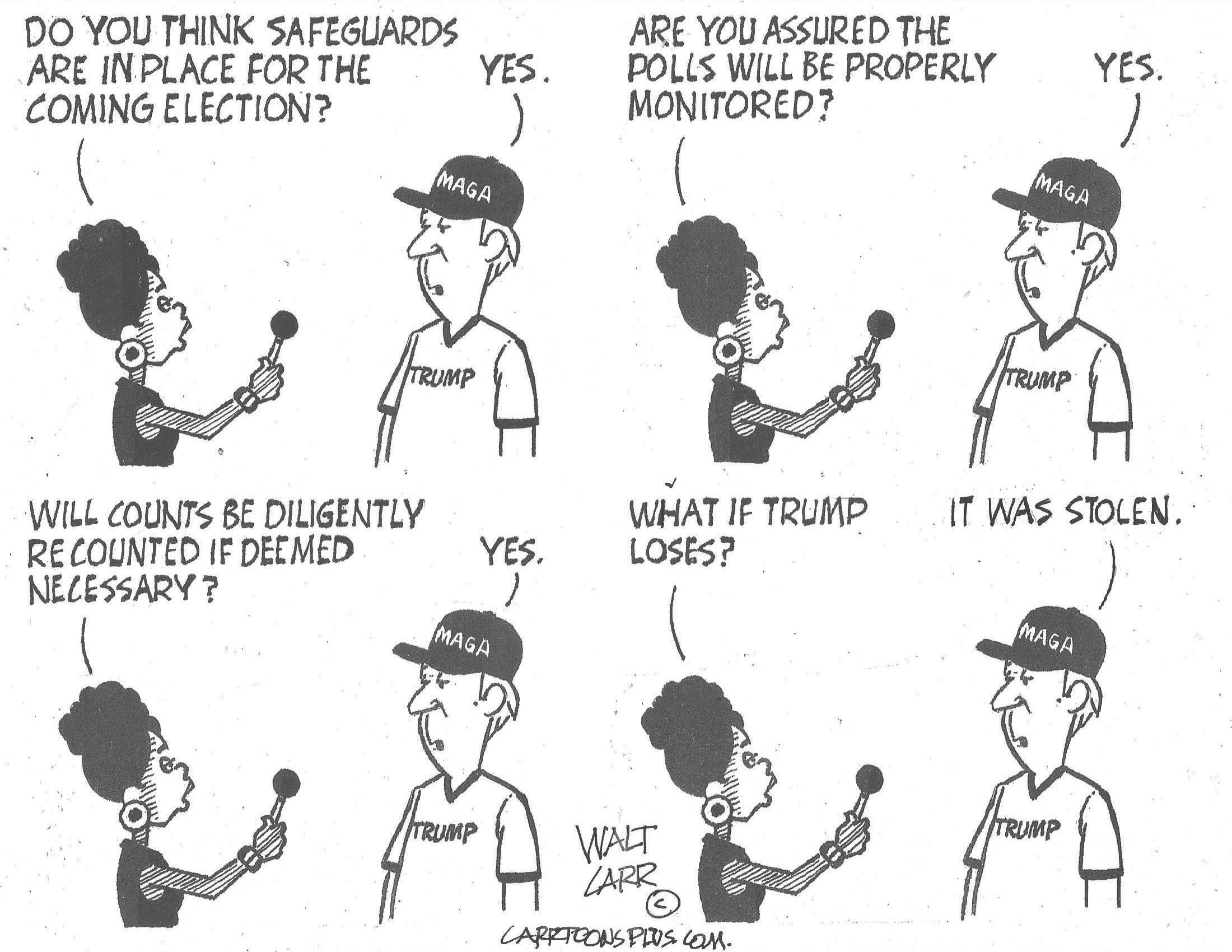
businesses were in the Health Care and Social Assistance sector. The second-largest sector was the professional, scientific and technical services sector.
The conversation around “Black jobs” must evolve. It is not enough to simply reject the term; we must actively work to change the narrative by highlighting the success stories of Black professionals who are breaking barriers and setting new standards in their respective fields. From medical practices and healthcare services
to sanitation and the C-suite, Black representation in a variety of industries continues to grow.
Black people are governors, local, state and federal legislators and vice president and president of the United States. We serve as lawyers, doctors, district attorneys, judges and U.S. Supreme Court justices. Black people are educators, college professors and administrators and school board members nationwide. We are also Olympic gold medalists. Name an industry and Black professionals are there
By Aja’ Mallory
When was the last time you talked with your family about money? If it’s been a while, it’s time to start. Money can be an emotional topic, especially with family, but avoiding these discussions can leave heirs unprepared for financial responsibilities, like a reverse mortgage. Open, honest conversations are key to preventing future surprises.
Maryland Volunteer Lawyers Service (MVLS) often helps clients facing foreclosure after discovering their parents took out a reverse mortgage on the family home. Many heirs, often older adults on fixed incomes or social security, find themselves living in the home
with no other housing options or plans for the property.
Reverse mortgages let homeowners aged 62 and older tap into their home equity without needing to make payments until they move out or pass away. This financial tool provides cash for living expenses, often when other savings have been depleted. However, not everyone who takes out a reverse mortgage is struggling financially. Some simply want to ease their financial burdens and enjoy a more comfortable lifestyle.
While older homeowners may have different reasons for taking out a reverse mortgage, it’s crucial they discuss their decision with their heirs and explain what it will mean for the house after they pass away.
Consider the Smith family who sought advice on their reverse mortgage dilemma. John, the family patriarch, took out a $30,000 reverse mortgage for home repairs and extra income, promising to leave the house to his children in his will. However, when John consulted MVLS for estate planning, a volunteer attorney warned him about the reverse mortgage’s impact on his heirs.
A reverse mortgage often requires the home to be sold to repay the debt, complicating the process of passing it on to heirs. To inherit a home with a reverse mortgage, heirs must pay off the debt, either the full loan balance or 95 percent of the home’s appraised value, whichever is less. Over time, accumulating interest, insurance
and fees can turn a small loan into a hefty obligation, leaving little or no equity for heirs. If there’s equity left, it goes to the homeowner’s estate. If the loan exceeds the home’s value, heirs aren’t liable for the difference, but refinancing can be challenging.
The Smith family was shocked to learn they would need to come up with $30,000 – or possibly more – to repay their father’s reverse mortgage. Many heirs find themselves in a similar situation, often with poor credit and unable to qualify for a loan. This news often arrives only when they receive a foreclosure notice.
While using home equity can be a smart decision, it’s essential to understand the potential impact on heirs. Many
By Algernon Austin and Dedrick Asante-Muhammad
As we consider the recent 61st anniversary of the 1963 March on Washington for Jobs and Freedom on Aug. 26, where Dr. Martin Luther King delivered his famed “I Have A Dream” speech, Black Americans are experiencing the most positive economic conditions in generations. Record low unemployment rates, record low poverty rates, record high income levels and new heights of wealth paint a picture of prosperity. One could easily think that this data means African Americans are experiencing broad prosperity. Yet, deeper investigation reveals that despite these recordbreaking economic numbers, African Americans are still mired in great economic insecurity. This ongoing economic challenge is reflected in their low opinion of the economy, widespread asset poverty and ongoing Black/white economic inequality. The best Black economy in generations isn’t enough when on the horizon is near never-
ending inequality and insecurity.
As the nation goes through a historic election that could have long-term ramifications on its political direction, it is clear that African-American voters continue to have economics at the core of their concerns versus the social issues that most often dominate the headlines.
From 1972 to 2022, the annual Black unemployment rate averaged 11.6 percent. In July of 2024, it was at 6.3 percent, nearing historic lows. But those figures look different in context; in 2023, for instance, the annual Black unemployment rate was nearly 1.7 times the White rate. On average, the Black unemployment rate between 1972 and 2022 was 2.1 times that of Whites, showing that bridging the Black/White unemployment gap remains a work in progress.
Other indicators tell us a similar story. The annual Black prime-age employment rate is at a record high: For the first half of 2024, it has averaged 78.0 percent, slightly above
where it stood the previous year. Black median household income is also at its highest point in a generation, growing from about $41,000 in 2011 to nearly $53,000 in 2022 – a nearly 30 percent increase. That same year, median Black wealth or net worth (assets minus debts) also reached a new high of nearly $45,000, more than double the post-Great Recession low of about $17,000 seen in 2013.
Despite these positive trends, the economic reality for many African Americans remains precarious. In 2023, there would have needed to be over 1.4 million more Black people working to reach the same employment rates as White people. This joblessness cost Black America roughly $60 billion. And while Black median income has risen, it is still nearly $30,000 lower than the White median – and still even below the White median income of 1972.
The average Black median wealth of approximately $45,000 keeps a large majority of African Americans distant from the $190,000 to $570,000 estimated
as the wealth necessary to reach middle-class status. As noted in the 2023 report “Still A Dream,” with all of the advances made since 1960, the nation is still moving at a glacial pace bridging Black/White economic inequality. If the country continues at the rate it has been moving since about the 1960s, it will take over 500 years to bridge Black/White income inequality, and nearly 800 years to bridge Black/White wealth inequality. These statistics underline a crucial point: while Black Americans are experiencing significant economic gains, these advances are insufficient to overcome the entrenched inequalities that persist. The economic progress we see today is a foundation, not a finish line. It speaks to the need for comprehensive policies that address ongoing barriers to economic security and wealthbuilding.
Investment in quality education, access to affordable healthcare, affordable housing, new means of government financing of asset building
MVLS clients lack the funds to repay or refinance the loan, leaving them with no choice but to sell the home or hand it over to the lender.
For many, homeownership is the foundation for building generational wealth. While reverse mortgages can help older homeowners manage finances and secure housing, they may leave heirs in financial hardship and unstable housing situations. It’s crucial for homeowners considering a reverse mortgage to have open and honest conversations with their families. Both the homeowner and heirs should understand the potential consequences and be prepared to either pay off the loan or surrender the home after the homeowner’s passing.
leading the way. The challenges we face are significant, but so too are the opportunities. By continuing to invest in our community, NBMAAA, and organizations like ours, will continue to reframe the narrative around “Black jobs.” It will no longer carry any negative connotations. Instead, it will be a term synonymous with leadership, excellence and success.
I’m glad Simone Biles loves her Black job. Let us know if you love yours too!
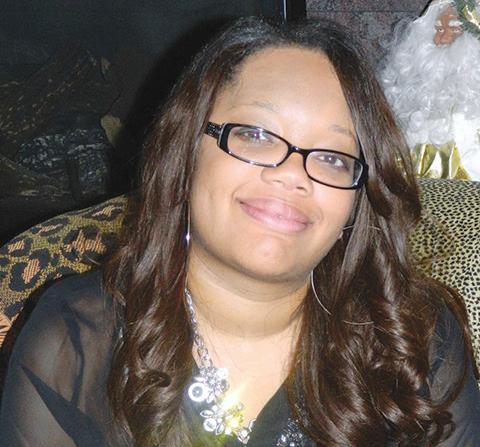
is a staff attorney at Maryland Volunteer Lawyers Service. Her practice focuses on housing and consumer issues for Marylanders of limited means. This week, she discusses how descendants and beneficiaries can best handle an unanticipated reverse mortgage.
opportunities like Baby Bonds are essential. These measures can help ensure that the economic gains of today translate into sustained prosperity and security for future generations.
As we approach the 2024 presidential election, much has been made of the historic possibility of electing the nation’s first woman president. But let us not make this
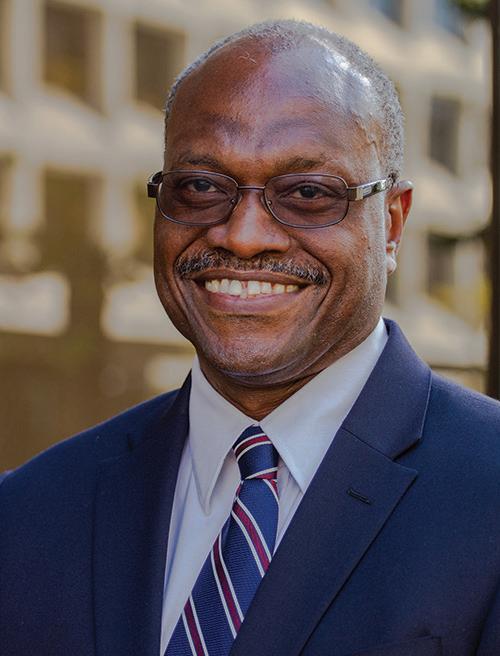

By Catherine Pugh Special to the AFRO
Each year the Congressional Black Caucus Foundation (CBCF) hosts the Annual Legislative Conference (ALC), bringing together thousands of people from across the country to discuss challenges and solutions in the Black community. Attendees listen and respond to the various speakers, participate in workshops and discuss the issues in Braintrust meetings led by Congressional Black Caucus (CBC) members and stakeholders.
The agenda this year, as it has been for decades, is filled with so many topics. It is truly impossible to attend them all! As the AFRO prepares for another CBCF legislative conference, we take a look back at some of the 2023 attendees who shared what they believe should be on the Black agenda.
David Nwaneri, 19, Austin, Texas
“I think the Black agenda should put an emphasis on fully funding education— specifically in inner city areas. Education is the building block that we go off of. We have to fully fund education because as we secure our education we begin the movement towards building generational wealth. A good education is where we start.”
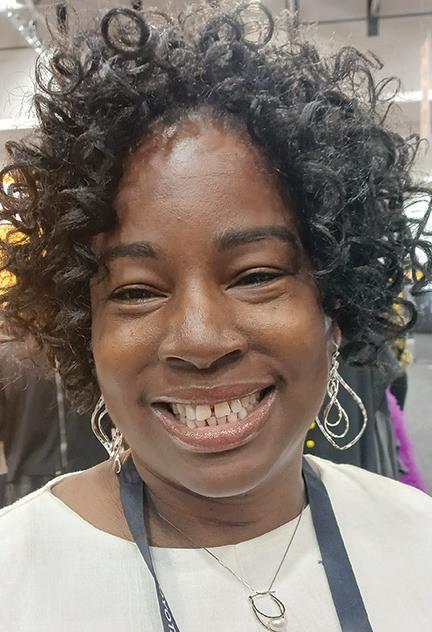
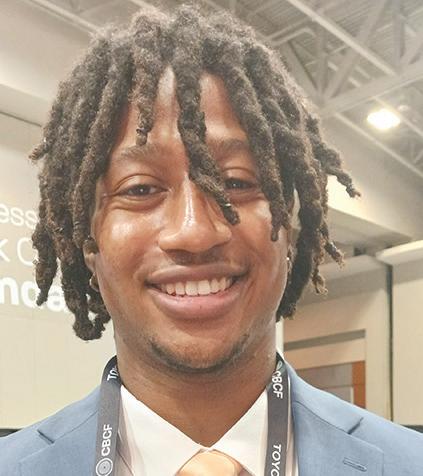
Karla May, 53, St. Louis
“I believe hemp should be on the Black agenda. I’m talking about hemp in terms of the garment industry and textile industry. In 2019, the top fashion designers put on a fashion show using hemp textiles in all their garments. Nike has tennis shoes made from hemp. I believe it is up to the Congressional Black Caucus to push the Black community in the direction of growers of HEMP-a carbon negative product because of the many uses–including paper. I don’t want the Black community to miss out on the opportunities this natural product will yield.”
Chandler Glover, 24, Orangeburg, South Carolina
“I think the Black agenda should provide support for the family. Keeping families together helps us to be a healthier community. Families that support each other leave room for achieving goals and building strong families. Programs should include support for low-income families and providing child-care and homeownership opportunities.”
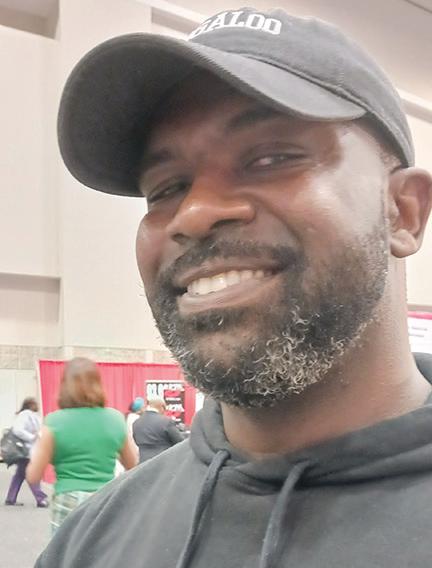
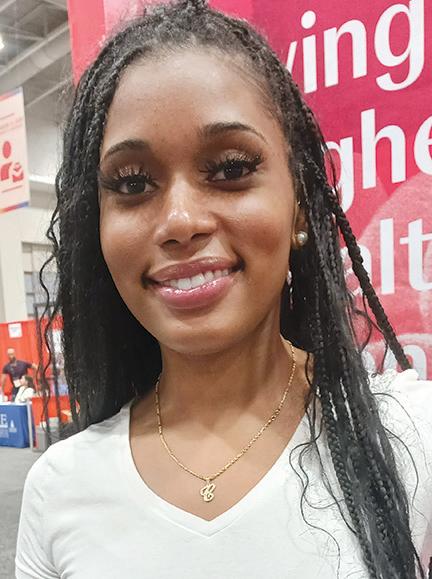
Tyson Jackson, 42, Washington, D.C.
“Digital equity, broadband reach ought to be a focus of the Black agenda. We need top tier internet in every community, rural and urban. We found–especially during the pandemic– that in many Black communities our students were not able to access broadband. The CBC must put pressure on these telecom companies to provide affordable services throughout our country. Connectivity is important for personal and professional growth and usage.”
Laura Hall, 80, Huntsville, Ala.
“I am a retired educator. Having taught for 40 years, it is my opinion nothing is more important than the Congressional Black Caucus continuing to apply pressure on Congress to make a college education affordable for all who want to attend and we must make sure. Our public school systems need to provide equality and quality education for all school systems– not shortchange our urban schools in resources.”
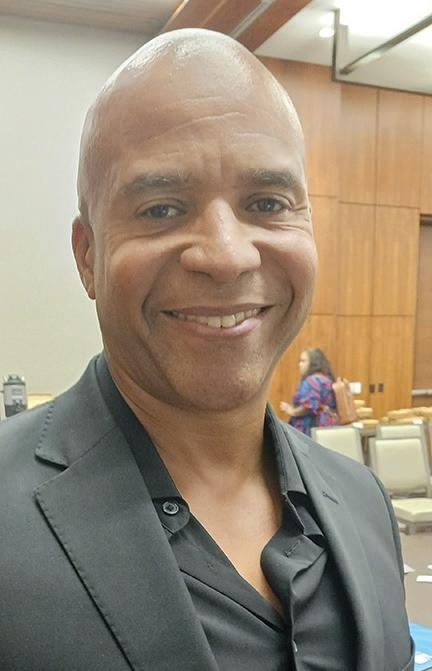
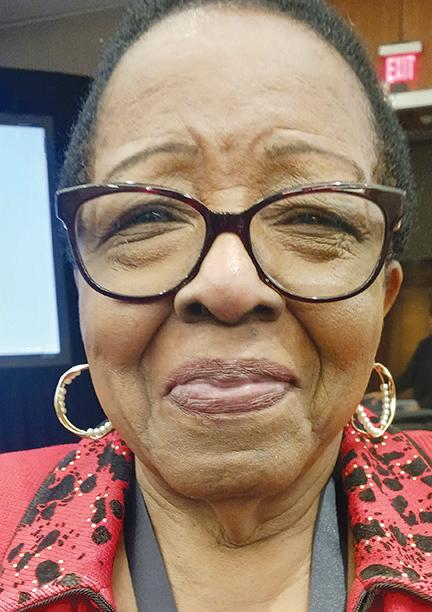
Atiba Madyun, 51, living in Miami
“Voting is important. We must focus on how we seize the power we have. We cannot be distracted by the noise of others. We must keep our faith, keep our hope, and keep our eyes on the prize. The CBC must continue its discussions on voting and how we maximize and mobilize our voting power across the country. We have seen when we vote in large numbers we win.”
Shelton Walker, 19, Texas
“In my opinion what should be on the Black agenda is advancing economic prosperity and closing the wage gap. In 2023, Black workers [made] 21 percent less than the median White worker. Since the Emancipation Proclamation we have not grown much in overall wealth.”
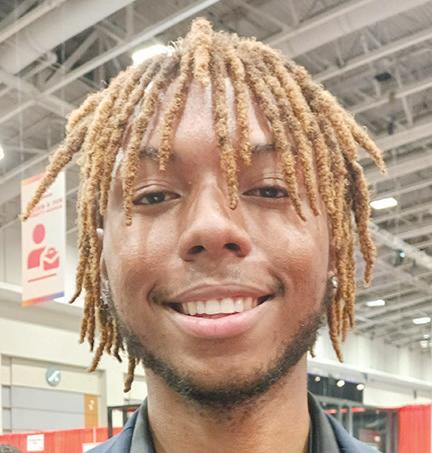
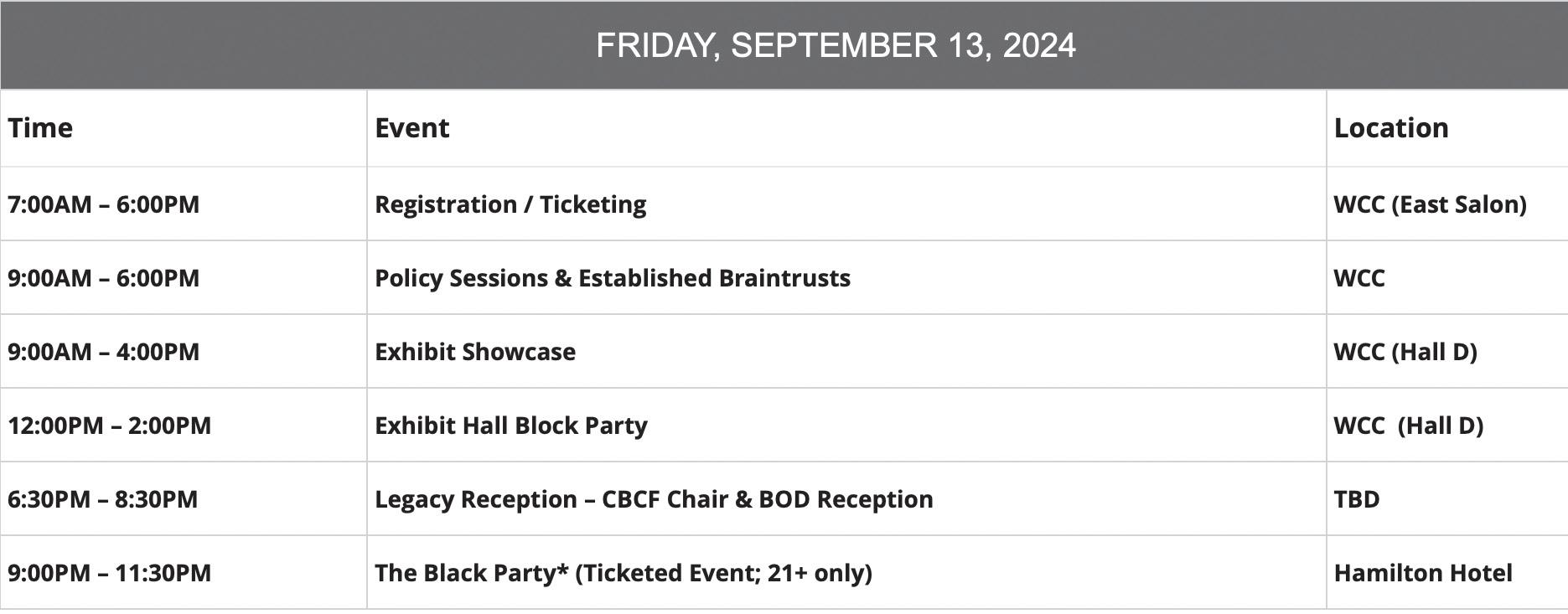
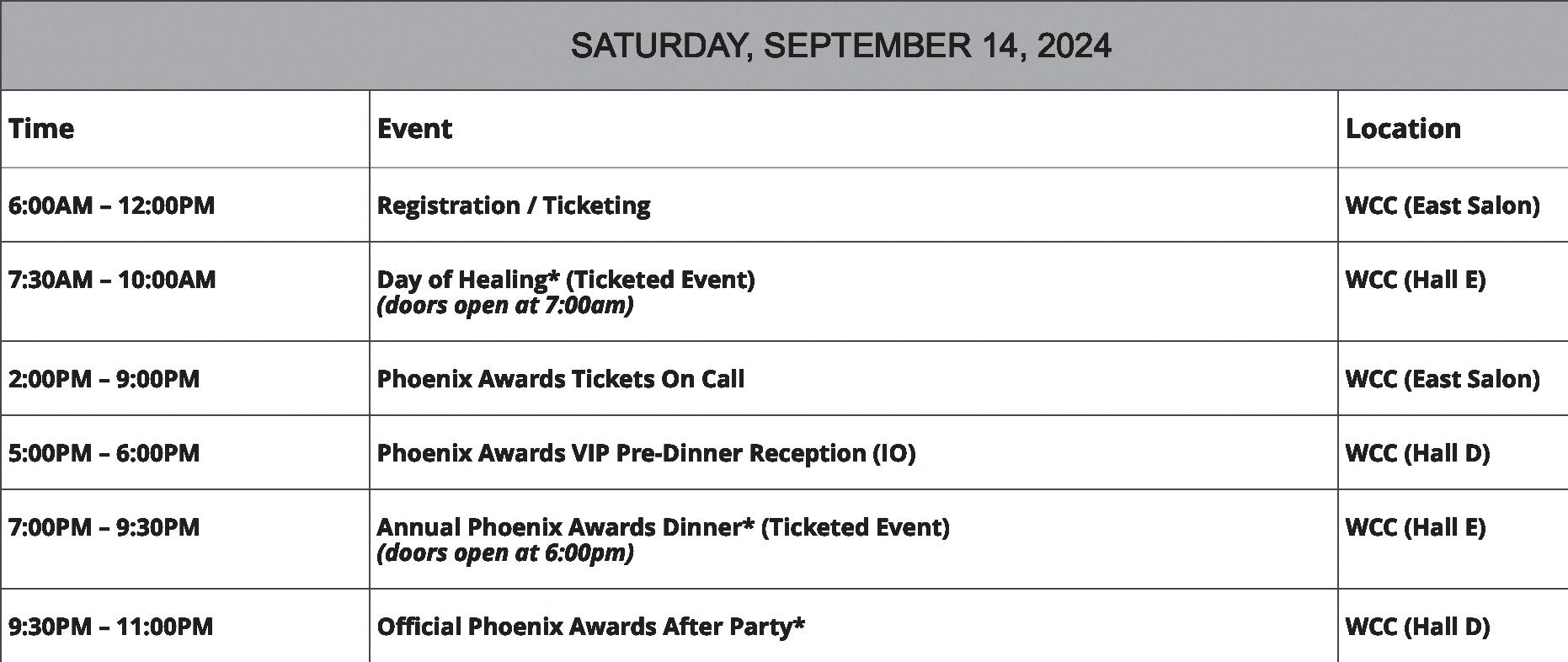




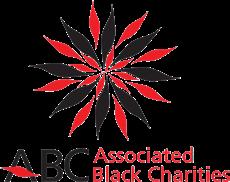

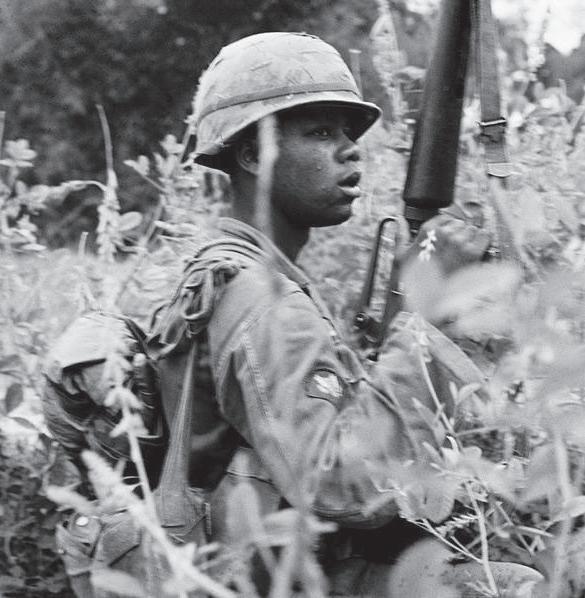

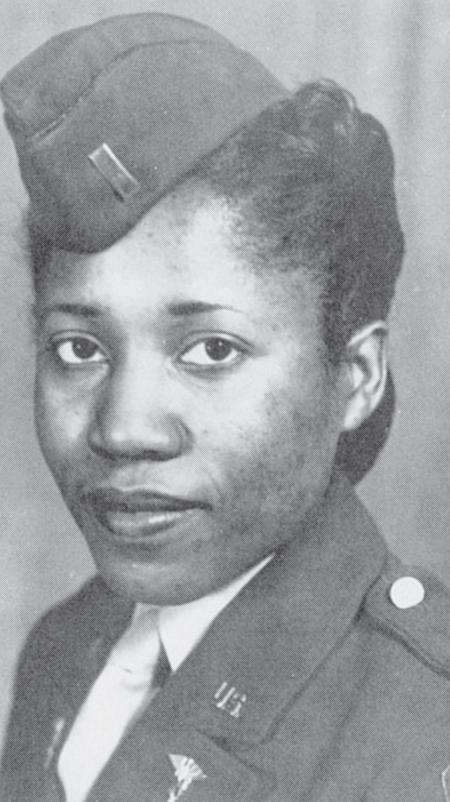









Learn how to play within your limits at mdlottery.com/playresponsibly. For help, call 1-800-GAMBLER. Must be 18 years or older to play.









By The Associated Press
A former police officer in the nation’s capital was sentenced Aug. 29 to five years in prison for fatally shooting a 27-year-old man who had been sleeping in the driver’s seat of a car stopped at a traffic light.
Former Metropolitan Police Department Sgt. Enis Jevric, 42, pleaded guilty in February to involuntary manslaughter and using unconstitutional, excessive force in the August 2021 shooting death of 27-year-old An’Twan Gilmore.
U.S. District Judge Randolph Moss also sentenced Jevric to five years of supervised release after his prison term, according to Justice Department prosecutors.
More than a dozen officers were on the scene when Jevric arrived at the intersection in Washington, D.C., where Gilmore was sleeping in the stopped car with a handgun in his waistband.
Jevric had a ballistics shield when he approached the driver’s side door. He told another officer to knock on the car’s windows, which jolted Gilmore awoke with a confused look on his face.
Video from police body cameras shows both of Gilmore’s hands on the steering wheel. When the car inched forward, Jevric fired four times into the car and then fired six more shots as it rolled down the closed-off street, prosecutors said. No
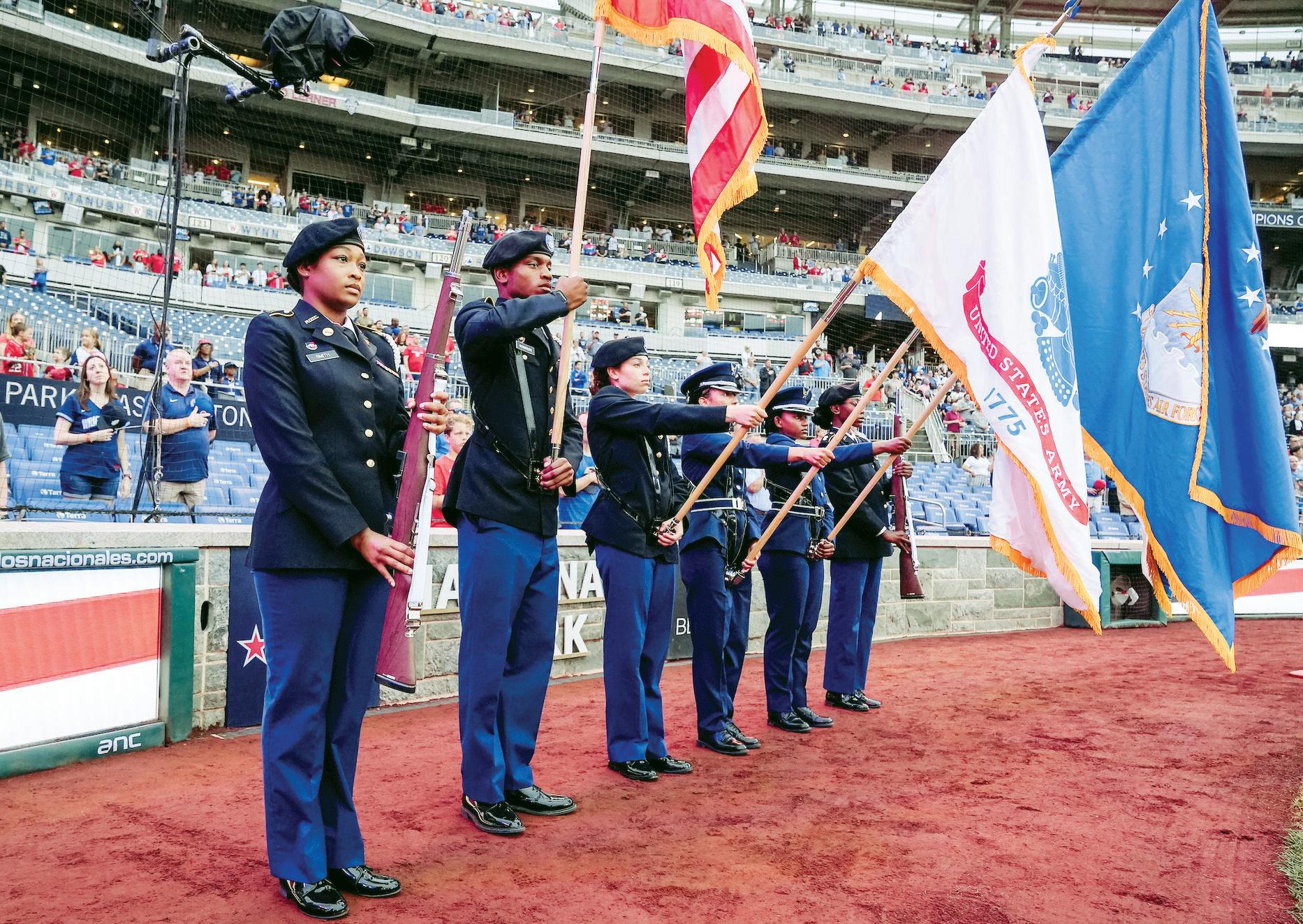

By Reginald Williams Special to the AFRO
Nick Arrington, a Woodbridge, Va. native and prominent cast member on Bravo network’s “Summer House: Martha’s Vineyard,” threw out the ceremonial first pitch for the Nationals versus Chicago Cubs game on Aug. 30. The Nationals honored the legacy of historically Black colleges and universities and the National Pan-Hellenic Council, an umbrella organization for Black sororities and fraternities, which are colloquially known as the “Divine Nine.”
“I’m throwing out the first pitch to celebrate my fraternity and my HBCU,” explained Arrington, a 2008 graduate of Tuskegee University in Alabama.
The pitch arrived just about waist-high. It caught the corner of the plate and had a little heat on it, based on the pop of Washington Nationals pitcher Joe La Sorsa’s glove.
As part of HBCU/Divine Nine Night, the Nationals also welcomed Howard University’s Army Bison Battalion and Air Force
Detachment 130 to serve as Color Guard for the game.
Additionally, hundreds of fans who attended the special event received a commemorative majorette bobblehead. Proceeds from the special ticket sales were donated to the D.C. Metro HBCU Alumni Alliance, which works to raise awareness, provide resources and offer programs aimed at supporting atrisk individuals and the communities where they live.
Arrington, a standout player at Gar-Field High School and a four-year player at Tuskegee, stood atop the mound and demonstrated a pitching form that suggested he hadn’t lost any skills from his past playing days as a catcher and relief pitcher.
“Nick threw an awesome pitch. It was awesome to be a part of it,” said Ryan Stowers, a fan from Utah. “I told him I heard some serious snap on his pitch. I loved being a part of it, and I love the mission of HBCUs. I love what he was doing here. We need more of it.”
Surrounded by his mother, Linda Arrington, and
his brother, Norman, a North Carolina A&T University graduate, Arrington lived out a childhood dream of one day throwing a baseball on a Major League Baseball diamond. Norman Arrington had the honor of helping his brother warm up before the first pitch and handing him the ceremonial ball.
A rising star in the entertainment space, Arrington was humbled by the opportunity to participate in the Nationals’ annual HBCU/Divine Nine Day.
“I’m here for a number of reasons,” explained Arrington. “We are celebrating historically Black colleges—so if you know, you know. It’s HBCU Night here at National Park and I’m super excited about that. I’m a proud graduate of Tuskegee University. We’re also celebrating tonight the Divine Nine—Black fraternities and sororities.”
In the spring of 2007, Arrington pledged with the Gamma Epsilon Chapter of the Kappa Alpha Psi Fraternity at Tuskegee.
Throughout the game, which the Nationals lost 7-6, the scoreboard showed scores of HBCU alumni
(Howard, Bowie State, Jackson State, Virginia State) throughout the park, rocking their school’s merch, and the sororities of Alpha Kappa Alpha and Delta Sigma Theta represented well.
Fred Watson, a 1997 A&T graduate and Cubs fan, arrived at the game wearing a Cubs fitted cap and a shirt representing N.C. A and T, but had no idea that the Nationals were celebrating HBCU/Divine Nine Day.
“I came out because I’m a Cubs fan,” explained Watson, who is not part of a fraternity. “My guy who went to FAMU got the tickets. Hey, this is perfect, I get to celebrate HBCUs, and my team is winning.”
In the top of the second inning, the Cubs scored seven runs and never relinquished their lead.
Arrington grew up in Woodbridge playing baseball, but today he is a growing television personality on the Bravo network and a brand ambassador for Fortune 500 organizations. The reality tv star says it’s all because of what he describes as “one random phone call.”
“We pivoted from
corporate America to TV and entertainment,” Arrington said. “It was one of those once-in-a-lifetime things when you get a random phone call for casting, and it’s like, hey, let’s do this. And the thing is, I’m blessed enough to have a strong support system behind me, so why not take a risk? It’s been fruitful. Now I’m here throwing out the first pitch. I go from a corporate office and a suit to lacing them up and being on the mound.”
In addition to being a reality star, Arrington models and styles A-list celebrities. He fancies himself as a style savant who opines “on menswear, lifestyle, travel and culture to elevate everyday life.”
Arrington’s journey from Woodbridge to Tuskegee to New York and Martha’s Vineyard has been lifechanging, but it was his journey from the sideline to the pitcher’s mound at Nationals Park that fulfilled a lifelong dream.
“It was exhilarating. Can you imagine? A Major League stadium! You dream of it as a kid…It’s incredible,” Arrington said. “Once in a lifetime.”
By D. Kevin McNeir Special to the AFRO
In this series the AFRO speaks to America’s incarcerated population, who face great physical hardship and emotional challenges– especially in states with little regard for inmate welfare. This series will examine the variety of reasons Black people face higher rates of incarceration and recidivism when compared to other ethnic populations. In addition, we speak with grassroots activists, returning citizens and advocates about being on the inside of the prison industrial complex and the impact of its revolving door.
On a warm August night, several dozen citizens from the Greater Washington Area, mostly AfricanAmerican men, gather at the Busboys and Poets

the Southeast D.C. community of Anacostia. The topic of discussion: the ongoing challenges facing the formerly incarcerated and the need for more programs that support their successful reentry into society.
During the two-hour session, returning citizens share stories of resilience, redemption and success, hoping to empower and motivate others as they seek to break barriers imposed by society and to realize their dreams.
This is just one outlet for those seeking relief from their experiences in the criminal justice system.
For Ahmar “Brother Khan” Mustikhan, a writer and community activist, it is crucial work.
Mustikhan served as moderator for the Aug. 3 Busboys and Poets event, titled “If You Have a Dream You Can Make It: Formerly
Incarcerated Share Success Stories.” Several D.C. legends including Tyrone Parker and Roach Brown joined the conversation, speaking as both returning citizens and advocates for others who survived years and even decades behind bars.
Khan described the event as an opportunity to connect with a community that believes in second chances and to show support for those who have managed to
overcome adversity. No testimony without a test Parker, 76, a native Washingtonian who now lives in Laurel, Md., spent 38 years in prison. The conviction on two counts of robbery cost him nearly four decades in prison–most of it spent at Lorton Reformatory, a former prison complex in Lorton, Va., located about 20 miles outside of the nation’s
Continued on B2

By Kevin McNeir Special to the AFRO
Four Red Line stations reopened on Sunday, Sept. 1, with MTA Purple Line construction continuing at Silver Spring. As crews replaced crossties along the Red Line during
Continued from B1
capital.
Also known as the Lorton Correctional Complex, the facility, which closed in November 2001, once served as a prison for nonviolent offenders from D.C. before coming under the control of the District of Columbia Department of Corrections in 1946.
Parker said he considers himself fortunate to have been sent to Lorton because it–unlike most penal institutions–promoted work programs that allowed inmates to regularly engage with the local community as volunteers.
“The first thing that helped me turn my life around was God – no question. But the second thing was my gaining an understanding of my own value and my importance to my community,” Parker said. “Lorton was a progressive facility that promoted sending its inmates–all 300 of us–to parts of D.C. and Virginia where we learned about responsibility.
“We were a volunteer movement that worked with the handicapped, supported youth in public schools and went wherever else we were needed. As a result of our day-to-day encounters, we not only helped to transform the greater community, but we underwent our own personal transformations,” he said.
Parker would use many of the skills he acquired and lessons learned while incarcerated to establish The Alliance of Concerned Men (ACM), a nonprofit he began in 1991 with former high school friends. Parker previously served as the executive director.
Now, more than 30 years later, ACM employs a “village approach” as they work to eradicate violence in local communities. The group has brokered more than 80 peace agreements and truces between rival gangs in areas identified as “hot spots” in D.C.
Brown, 80, was born and raised in D.C. but now lives in Suitland, Md. Today, he’s a successful host of “Crossroads,” a radio broadcast heard around the world. Today, he addresses problems faced by those returning citizens and those currently incarcerated.
Like Parker, Brown was sent to Lorton, after being sentenced to life in prison at the age of 20 in 1964 for being part of a trio of robbers whose actions led to the death of another man.
“I was physically attacked multiple times in prison,” he said. “I was paralyzed for a while, I was placed in solitary confinement and even sent to St. Elizabeths for three years after both my mother and father died and I was diagnosed as temporarily insane,” he said, speaking of the public psychiatric hospital located in Washington, D.C.
“After being returned to Lorton after my release from the [St. Elizabeths], I started writing to clear my head and wrote a Christmas story that evolved into a play,” Brown said. Soon, he found like-minded individuals, who wanted to express themselves using performance theatre.
“We called ourselves ‘Inner Voices’ and the play and our performances became so popular that we were allowed to go on tours – some locally and even a few in other parts of the country, including the Apollo Theater in New York City. We even did a show that was headlined by Richard Pryor.
“We were allowed to go out and perform more than 500 shows and we returned to Lorton every time
the summer construction, Metro riders were forced to either take shuttles or secure other means of transportation. After a summer of lengthened commute times for passengers, four stations along the Red Line, in Glenmont, Wheaton, Forest Glen and Silver Spring, have reopened. Silver Spring remains an active construction site for the Purple Line and scaffolding will remain on site until the conclusion of the
work, which has been extended to December 2027. At that time, Purple Line operations are slated to begin.
The MTA has reported that more than 850,000 trips were made on the shuttles during the construction work and issued a note of thanks to customers for their patience as MTA made progress on the connection between the Purple Line light rail and Metrorail.
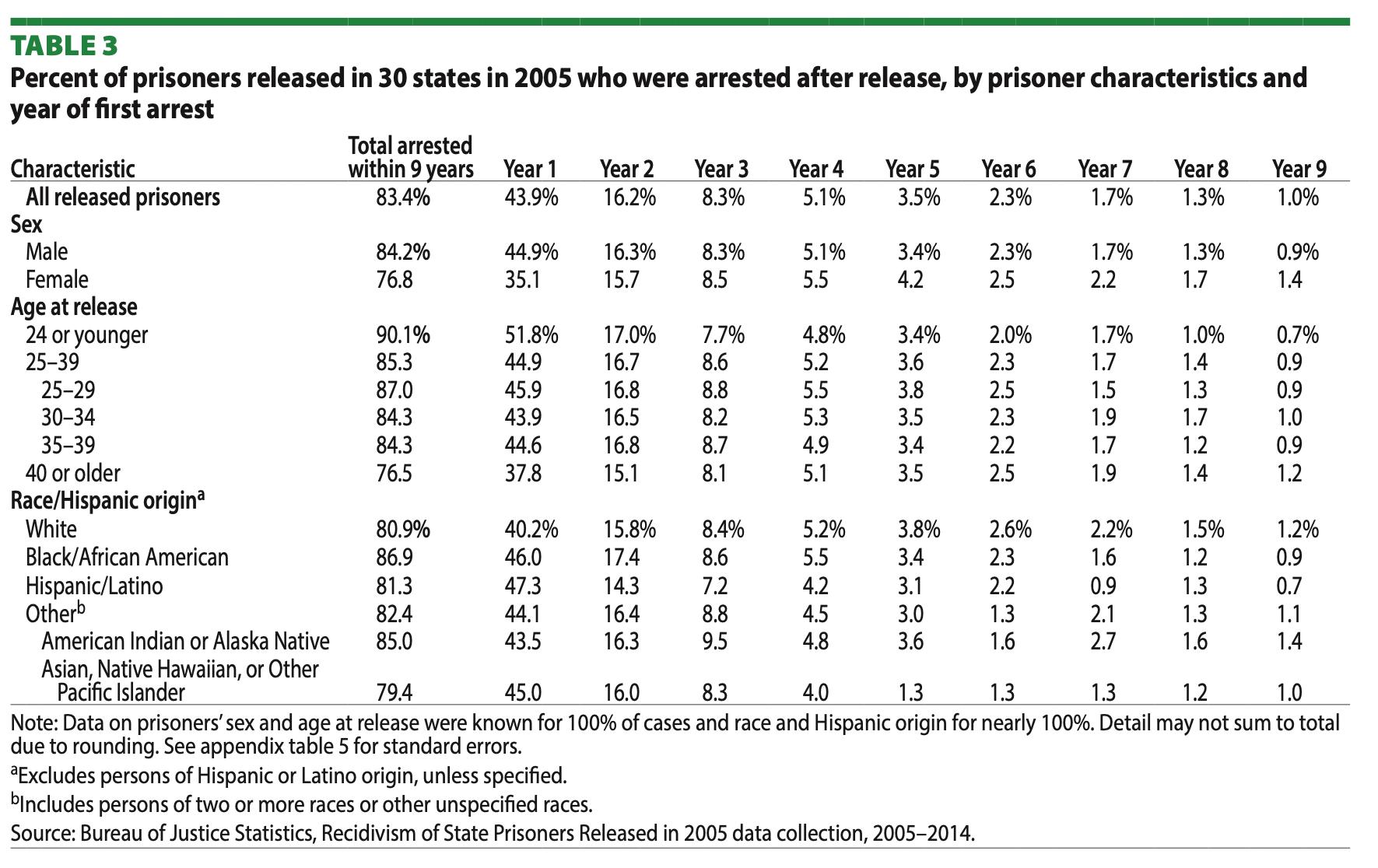
Data courtesy of the Bureau of Justice Statistics via Prison Policy Initiative Studies show that Black men return to prison at a rate higher than their White counterparts. Experts say resources and support are key in cutting the recidivism rate.
without any incidents. Then, in 1975, after first being turned down by former President Richard Nixon, former President Gerald Ford granted my request for a pardon and I was released from prison. I was determined to make the most of receiving a second chance,” he said.
Recidivism rates disproportionately high for Black men
By age 25, 15.9 percent of Black males, 6.3 percent of Hispanic males and 1.7 percent of White males are expected to have served some time in state or federal prison. By age 40, 26.6 percent of Black males, 12.7 percent of Hispanic males and 3.5 percent of White males will have served time.
The Department of Justice routinely conducts long-term studies on all things related to incarceration. In 2018 they released an updated report on recidivism rates for state prisoners in 30 different states. The report initially surveyed returning citizens from 2005 to 2009, to see how many were arrested after their release. Roughly 44 percent were re-arrested in the first year.
The report looked at how many people were rearrested year after year for nine years.
“Five years after release from prison, Black offenders had the highest recidivism rate (81 percent), compared to Hispanic (75 percent) and White (73 percent) offenders,” according to information released by the Bureau of Justice Statistics in 2014, year nine of the study.
The report found that a total of 83 percent of prisoners in the study were re-arrested within nine years of their 2005 release. By 2014, 86.9 of all Black prisoners in the study had been rearrested after their 2005 release. That number was 85 for the American Indian or Alaska Native Asian, Native Hawaiian or Other Pacific Islander prison population, and 81.3 for Hispanics / Latinos.
Still today, incarceration and recidivism rates remain high across all race and ethnicity groups. The U.S. Census reports that Black people
made up 12.4 percent of the population in 2020, and 12.6 percent of the population in 2010. Still, they show up disproportionately in the prison systems of America. The Federal Bureau of Prisons, for example, reports that 38.8 percent of prisoners were Black as of Aug. 24.
Both Parker and Brown represent the minority when it comes to Black men who once spent time behind bars.
When asked why they believe that Black men have a high recidivism rate among those formerly incarcerated, the two men differed in their responses.
“In D.C.’s Ward 8, where most of the inmates from this area lived before being arrested and convicted– and to where [they] are returned upon their release– it’s a community of mostly disenfranchised people,” Parker said. “The prison system feeds off of them. At the same time, Blacks continue to suffer from a lack of everything: lack of jobs, poor healthcare, inadequate education and lack of affordable housing.
“Returning citizens need a solid base – a family – to support them when they’re released. They need constructive programs to teach them how to be part of a family or in some cases, to lead their family,” said Parker. “For some young Black men, the only thing they know is based on a culture of self-destruction – they learn it as children and it’s passed on from one generation to another. Being incarcerated, and repeatedly returning to prison, is nothing more than a new form of slavery.”
Brown agreed and lamented that until America changes its priorities, far too many Black families will continue to be ravaged by disproportionate rates of incarceration.
“While I believe that Americans care about the injustices routinely faced by those in our nation’s prisons and jails, Black [people] in particular just have too many other things to worry about – things that take priority, like ensuring they have enough to eat, have a place to
live and have a job, not to mention racism in general,” Brown said.
“It’s rare to find a Black family that doesn’t have someone who is or has been incarcerated. At the least, they’ve gotten a call from someone they care about who has been arrested and needs help,” said Brown. “It’s wrong to consider all Black men as criminals. I think most brothers commit crimes of need, not crimes of greed.”
Brown continued, adding that “People who don’t have a job or a home – people who are broke, broken and homeless – will do whatever is necessary to survive. When I
was a little boy and D.C. was very segregated, even if you had a job, you had to hustle. You needed to supplement the family’s income just to survive. So, most of us, if we had a job, stole from that job. My take home pay wouldn’t take me home.” Over time, however, he knew he had to change.
“How did I get my life in order? I eventually got tired of getting in the ring and getting knocked down again and again. It was like fighting Mike Tyson seven days a week,” he said. “I reached the point where I was done with experiencing the overdose of pain and I wanted something else – something differ-
Continued from B1
other officer fired a shot.
The gun was still tucked into Gilmore’s waistband, underneath his buckled seat belt, when police entered the car.
Prosecutors recommended a seven-year prison sentence for Jevric. They said no other officer on the scene saw a basis to shoot Gilmore.
“Several described being ‘shocked’ that shots were fired,” prosecutors wrote in a court filing.
Jevric had been a police officer in Washington since 2007. His attorney, Christopher Macchiaroli, had requested a sentence of home confinement without prison time.
“Sgt. Jevric has spent the better part of his life helping people, not hurting people, protecting life, not taking life,” the defense lawyer wrote.
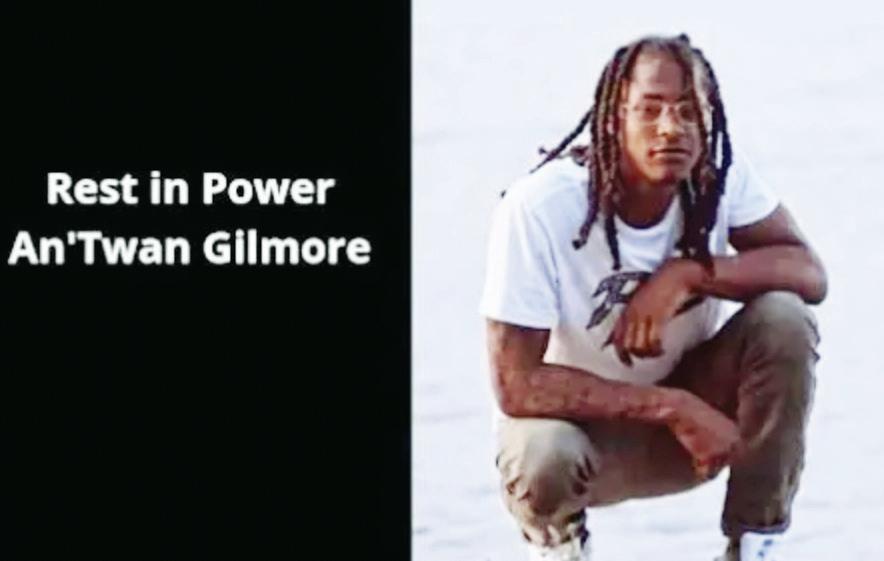
By Kevin D. McNeir Special to the AFRO
Narcan serves as a name brand version of a nasal medication used to quickly reverse an opioid overdose. And with the number of overdoses continuing to rise throughout the Commonwealth of Virginia, Loudoun County Public Schools is considering allowing students aged 16 and older to carry Narcan, or Naloxone, at school. The move would count as a revision to the current policy that deals with student medication.
The revisions, prompted at the request of Superintendent Aaron Spence, were discussed Aug. 22 by the Student Services Committee and includes a section about the proper training, storage and handling of Naloxone and requires students to alert a staff member if they use it on someone.
dents have to be at least 16. Kloman said the training and the dose of Naloxone given at the end of training is free and doesn’t cost the division anything. Student Services Director Kirk Dolson said the training would be provided only to students who volunteered to take it.
For now, only a handful of staff members in division schools are trained to administer Naloxone, including principals and nurses but those from the Sheriff’s Office, the Leesburg Police and other divisions including Fairfax and Arlington in Virginia and Montgomery County in Maryland, have varied policies that allow it in one way or another.
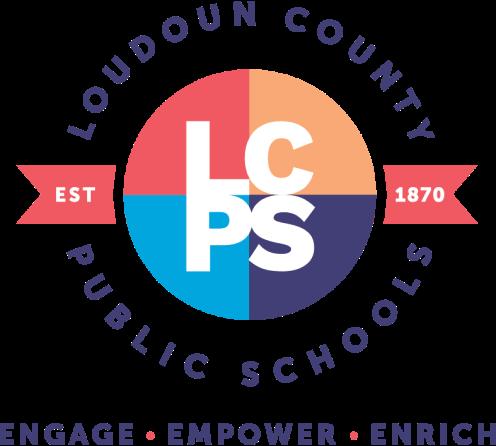
According to Student Health Services Supervisor Jeannie Kloman, in order to be trained to carry Naloxone, stu-
The committee will address the policy changes at its next meeting in September. The current policy came under fire last October after nine suspected student opioid-related overdoses involving fentanyl, a synthetic opioid that is 100 times more
potent than morphine, occurred at Park View High School.
Seven of those happened within the span of three weeks, according to the Loudoun County Sheriff’s Office.
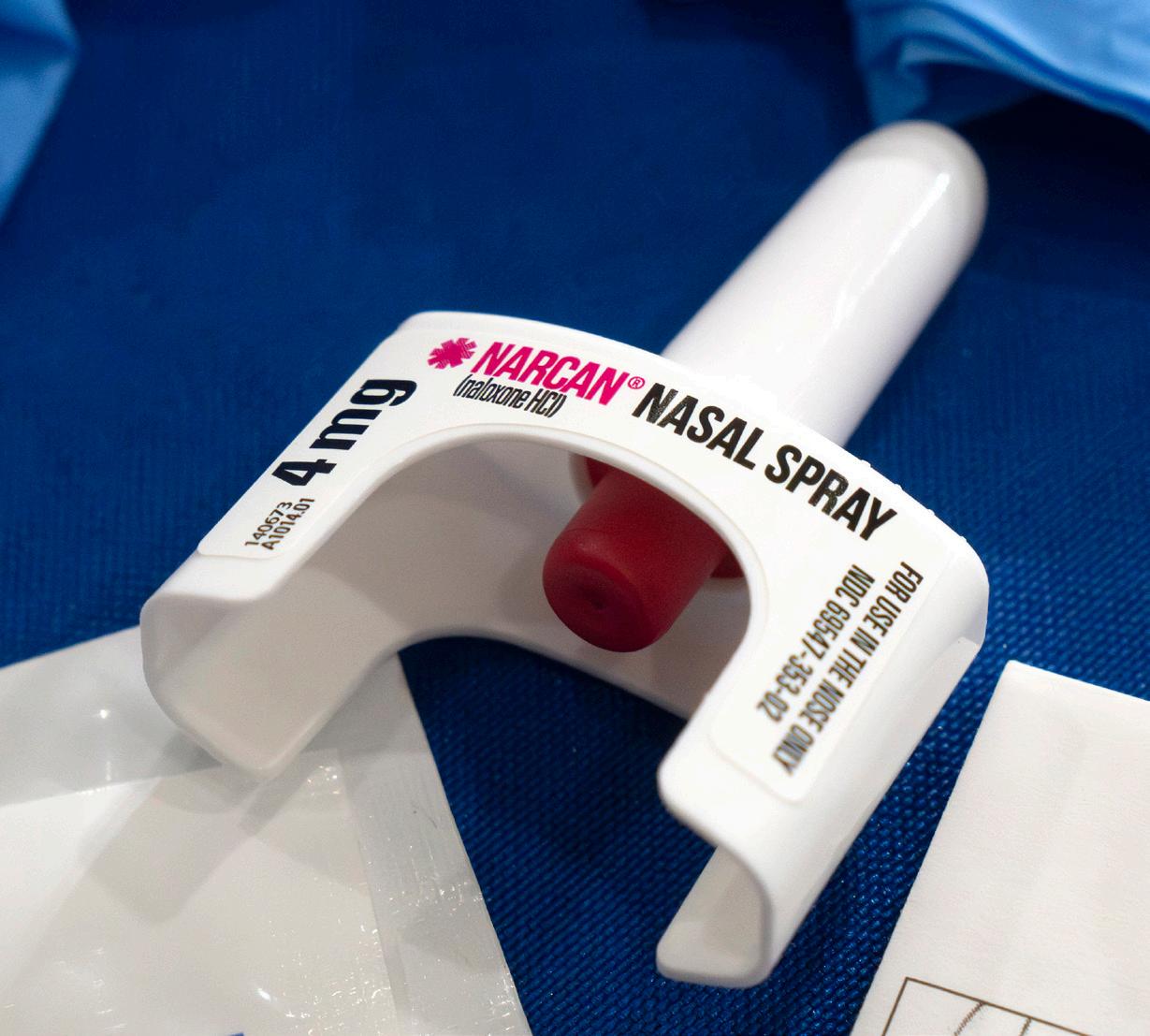
By Kevin D. McNair
Special to the AFRO
Members of the Maryland Legislative LGBTQ+ Caucus recently released a statement in response to reports about Larry Hogan allegedly dismissing the concerns of an LGBTQ+ Maryland voter who brought up his record of refusing to stand up for LGBTQ+ rights.
“Larry Hogan is no friend to the LGBTQ+ community,” said District 3 Delegate and Chair of the Maryland Legislative LGBTQ+ Caucus, Kris Fair. “As governor, he refused to take a stand on basic legislation to protect LGBTQ+ Marylanders from hate crimes, stop discrimination against LGBTQ+ students and patients, or eliminate the so-called ‘panic defense’ that allows criminals to evade culpability when they harm LGBTQ+ people.”
District 17 State Delegate Joe Vogel said he wants more than empty promises and an illusion of support.
“I want to know whether my next Senator will stand up for transgender Maryland and LGBTQ+ children against
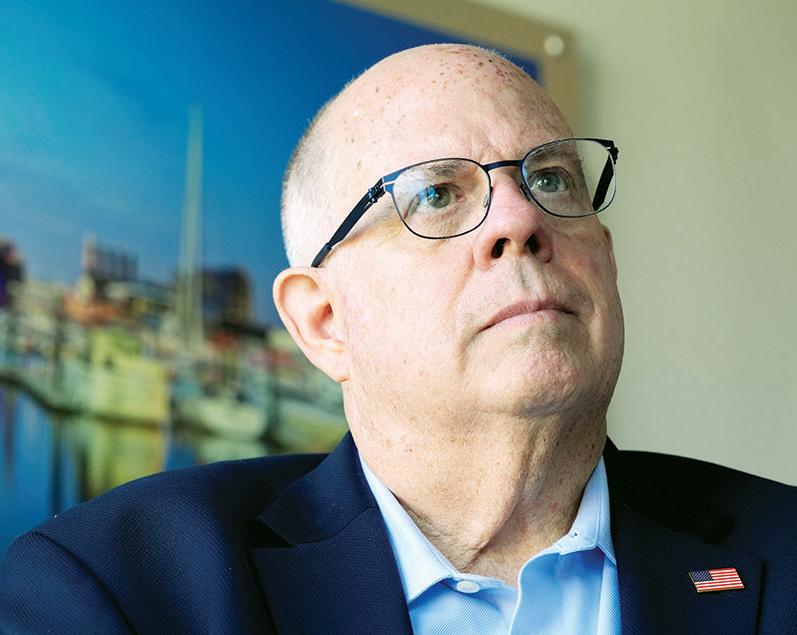
an onslaught of attacks from the far-right,” he said. “I want to know whether my next Senator will fight back against a Supreme Court intent on repealing the rights generations fought for — including the right to gay marriage.”
Hogan, the former Maryland governor, who’s running for U.S. Senate as a moderate Republican, says he can work across political divides. But he seemed to evade questions on his record about LGBTQ+ rights during a recent town hall via telephone.
Hogan said he didn’t know what bills were being questioned and added that he didn’t oppose any that he could recall and that they became law anyway. Several proLGBTQ+ bills did become law without his signature during his two terms in office (2015 – 2023) and he did in fact oppose others.
Hogan’s campaign website doesn’t include a section on LGBTQ+ issues. In contrast, his opponent, Angela Alsobrooks, does include on her site a section on “Equality,” which notes that as Prince George’s County executive, she appointed the county’s first LGBTQ+ liaison.






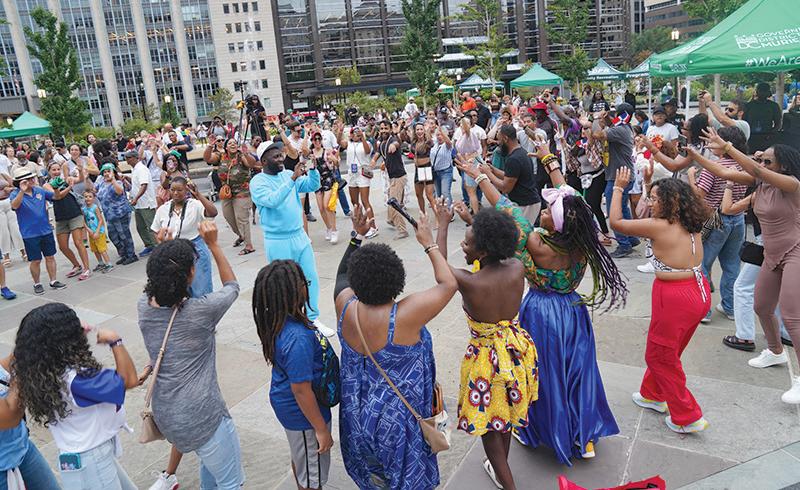
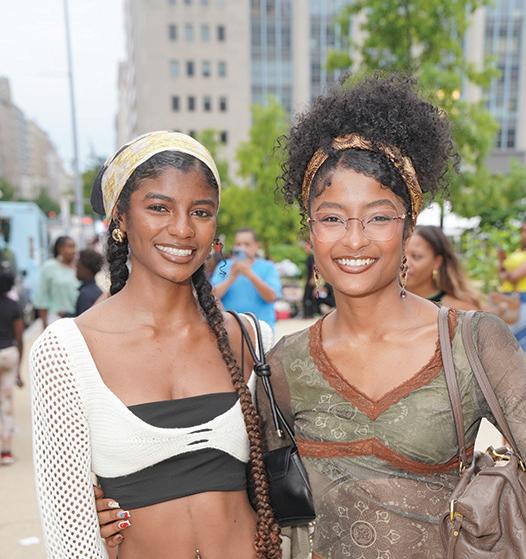
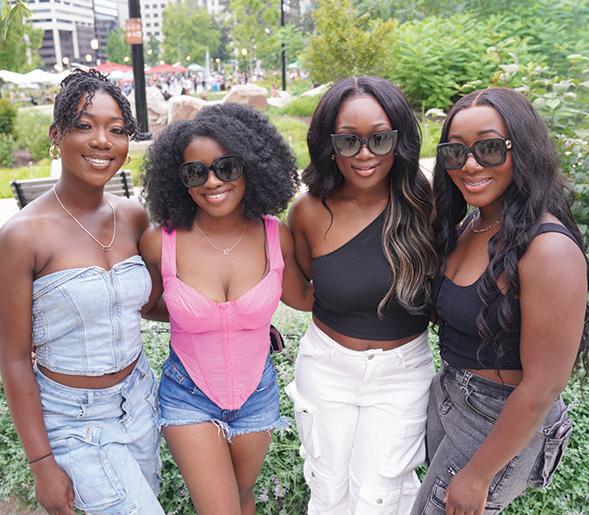


By Patricia McDougall
On Saturday, Aug. 31 the Mayor’s Office on Latino Affairs held its third annual D.C. Afro Latino Fest in the Franklin Park area of the nation’s capital. The Afro-Latino community put on a vibrant show, complete with live music, dance, food, face painting, vendors, artists and more. Families joined in on the festivities with picnic blankets and baskets of food. Others patronized the various vendor trucks that lined the street with food from the Afro-Latino community.
The event brings D.C.’s Afro-Latino community together for culture, live music and a day full of excitement.
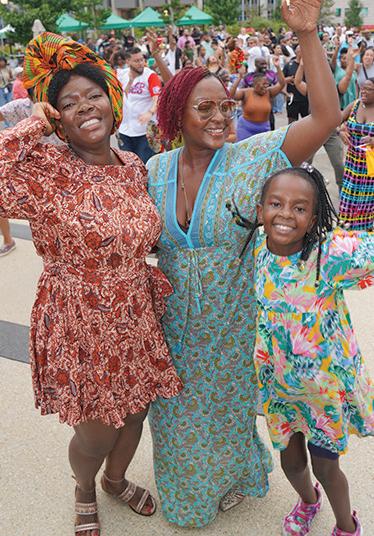
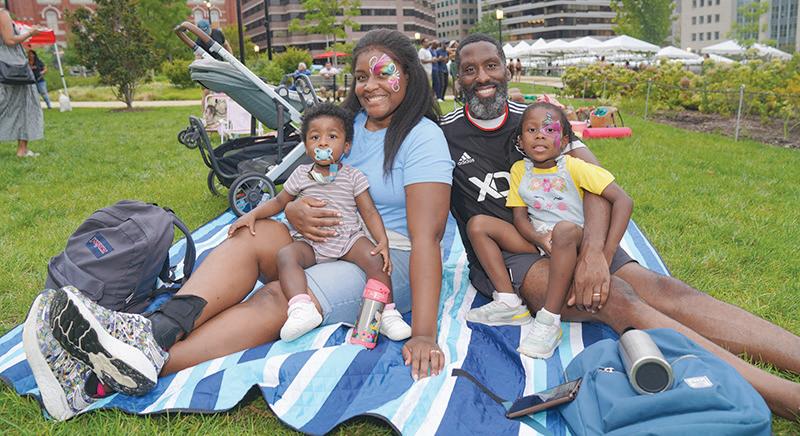
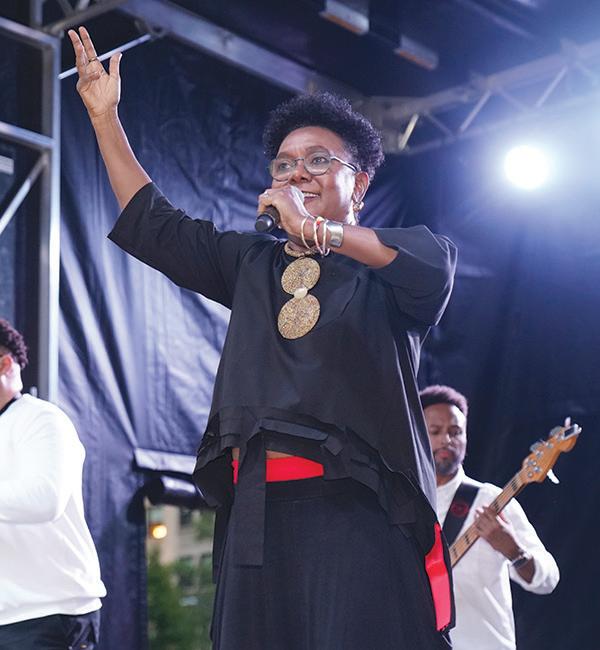
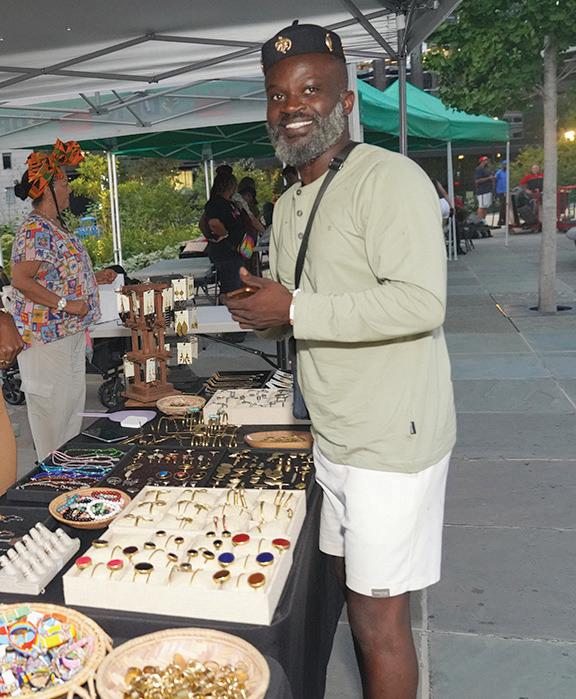

By Ericka Alston Buck Special to the AFRO
The hip-hop community was shaken to its core this weekend with the unexpected death of legendary rapper and hype man Fatman Scoop. The 53-year-old artist, whose real name was Isaac Freeman III, tragically collapsed on stage during a concert in Hamden, Conn. on Aug. 30.
Known for his booming voice and infectious energy, Fatman Scoop was a beloved figure in music, leaving behind a legacy that has inspired countless fans and fellow artists.
A tragic night
Fatman Scoop was performing at the Green and Gold Party, a highly anticipated summer concert that had been rescheduled due to weather, when the unthinkable happened. Midway through his set, as he hyped up the crowd in his signature style, he suddenly collapsed. Despite the best efforts of paramedics and onlookers who rushed to his aid, Freeman was transported to a local hospital, where he was later pronounced dead.
Hamden Mayor Lauren Garrett expressed her condolences, acknowledging the profound loss to the community.
“On behalf of the Town of Hamden, I offer my heartfelt condolences to the family and friends of Isaac Freeman, known as Fatman Scoop,” she wrote on Facebook. “He was a wonderful performer with a wide following, as evidenced by the thousands of fans that came to see what would be his last performance at Hamden Town Center Park.”
Remembering a radiant soul
Fatman Scoop’s family confirmed his death on Instagram, writing, “It is with profound sadness and very heavy hearts that we share news of the passing of the legendary and iconic FatMan Scoop. Last night, the world lost a radiant soul, a beacon of light on the stage and in life.”
The news has prompted an outpouring of tributes from fans and artists alike, all of whom recognized the significant impact Fatman Scoop had on the industry. His ability to energize a crowd was unparalleled, and his contributions to the genre have left an indelible mark.
As the hip-hop community grapples with this sudden loss, there has been an outpouring of condolences and well-wishes for his family and close friends, as well as tributes to the
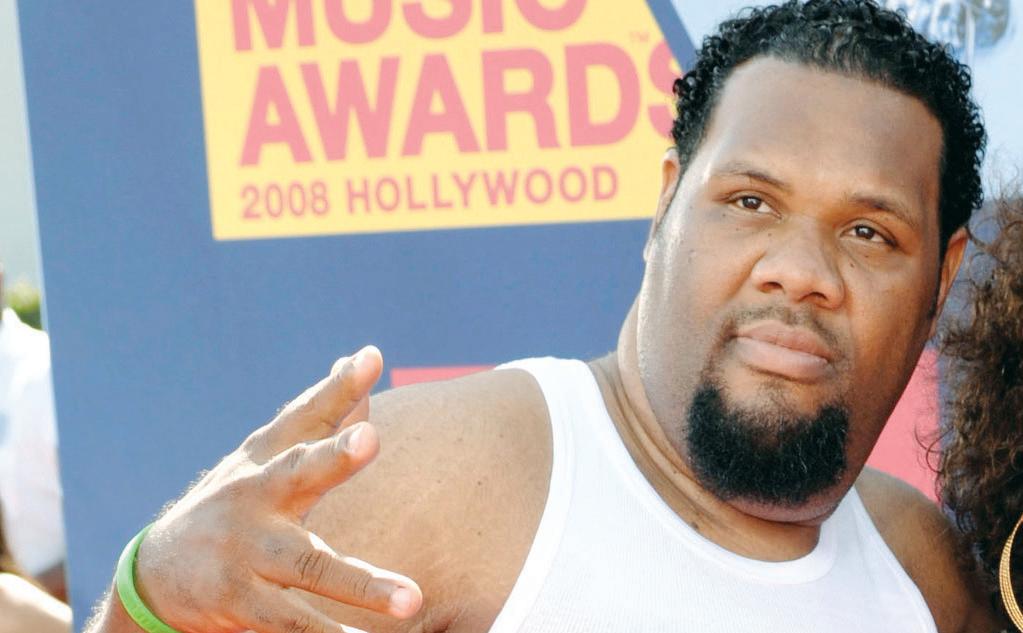
performer.
Megastar rapper Missy Elliot, one of several artists with whom Scoop collaborated, prayed for “strength” for the Harlem entertainer’s family, and praised Scoop’s “voice” and “energy” that made people feel happy and want to dance.
“Your impact is huge and will never be forgotten,” Elliot wrote on X, the social media platform formerly known as Twitter.
Baltimore radio personality, DJ and recording artist Pork Chop, who was often compared to Fatman Scoop, shared his deep sorrow upon hearing the news.
“Fatman Scoop was one of the greats, and he’ll be deeply missed,” the Charm City entertainer said.
“To me, he was always one of my mentors,” Pork Chop further reflected. “People used to call me the Fatman Scoop of Baltimore because of our voices. We even had people thinking I was him on tracks with Missy Elliott.”
Pork Chop continued, expressing the deep bond he felt with Scoop: “He was always supportive every time I saw him, always telling me to keep going, keep pushing. 53 is young, and it really hit me hard, especially after having a stroke myself recently. The news was devastating and hit home.”
A legacy that will live on Fatman Scoop’s death is a poignant reminder of the pressures that come with life in the spotlight and the importance of health and well-being.
“It’s scary,” said DJ Pork Chop, reflecting on the pressures of life as a performer. “We don’t know what health problems he might have had, but it makes you think about your own health. I’m definitely walking on eggshells now, trying to eat right and take care of myself.”
Despite the devastating news, however, fans are commemorating the performer’s larger-than-life persona and the joy he brought
to countless lives.
“His music made us dance and embrace life with positivity. His joy was infectious and the generosity he extended to all will be deeply missed but never forgotten,” relatives said in their Instagram post.
Fatman Scoop’s career spanned decades, marked by collaborations with some of the biggest names in music. His legacy as a cornerstone of hip-hop will endure as his voice continues to resonate through the anthems that defined a generation. He was known for his work on Missy Elliott’s “Lose Control,” Mariah Carey’s “It’s Like That,” Ciara’s “Level Up (Remix),” and Chingy’s “Let’s Ride.” His track “Be Faithful” became an anthem in clubs across the globe, securing his place as one of hip-hop’s most recognizable voices.
In the words of DJ Pork Chop, “He was a great guy, a mentor, and a legend. Rest in peace, Fatman Scoop. You’ll never be forgotten.”
Justice Ketanji Brown Jackson is hitting the road to promote her new memoir, ‘Lovely One’
By Mark Sherman
The Associated Press
Supreme Court Justice Ketanji Brown Jackson is embarking on a high-profile, nationwide tour to promote her new memoir, “Lovely One.” Jackson, 53, is using the book, publisher Random House says, to trace her family’s rise from segregation to her confirmation as the first Black woman on the nation’s highest court in the span of one generation.
“It is the story of the promise of America,” she said in a television interview that aired Sept. 1.
She also is the first public defender to serve as a justice and she delves into advancing in the legal profession as a woman of color and a mother balancing a demanding career and family life.
Since joining the court in June 2022, Jackson has been the most active participant in the argument sessions, according to the Empirical Scotus website. She has at times taken a liberal approach to originalism, a method of interpreting the Constitution more often used by the court’s conservatives.
In her appearances off the court, she has embraced her historymaking role, telling an audience on the day of her ceremonial swearing-
in that she has “a seat at the table now and I’m ready to work.”
Jackson kicks off the book tour Sept. 3 at New York’s Apollo Theater on the same day the book is published.
Just in the first week, Jackson will make stops at major entertainment venues in Washington, Atlanta, Miami, Seattle and San Francisco. The tour will make a stop in Baltimore at the Enoch Pratt Free Library’s Central Branch on Sept. 21.
Jackson reported receiving an advance of nearly $900,000 last year from Random House, putting herself in the company of two colleagues, Justices Clarence Thomas and Sonia Sotomayor, who each received advances of a million dollars or more for their memoirs.
The up-from-poverty accounts of Thomas’ “My Grandfather’s Son” and Sotomayor’s “My Beloved World” landed atop The New York Times’ bestseller list for nonfiction. Sotomayor has earned roughly $4 million for the memoir and children’s books she has written since joining the court in 2009.
Last year, The Associated Press reported that Sotomayor’s court staff was deeply involved in organizing speaking engagements to sell the books and also prodded colleges and universities to buy them.
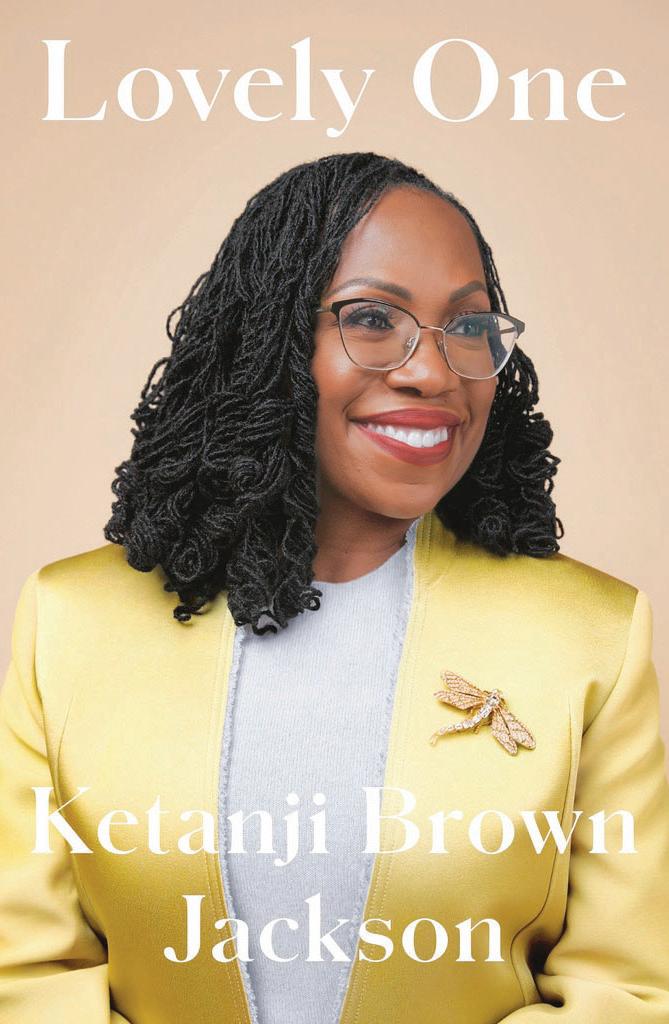
Photo courtesy of Random House Supreme Court Justice Ketanji Brown Jackson is on the road with her new book, “Lovely One.” The trailblazing judge and author will make a stop in Baltimore at the Enoch Pratt Free Library’s Central Branch on Sept. 21.
The court has referred questions about Jackson’s book tour to her publisher.
The Supreme Court adopted its first code of conduct last year in response to sustained criticism over undisclosed trips and gifts from wealthy benefactors to some
justices.
The code lacks a means of enforcement and it sets no limit on income justices can earn from books they write. Other outside income from teaching, for example, is capped at about $30,000 a year.
The justices are earning $298,500 this year for their work on the court, though Chief Justice John Roberts gets paid a little more.
“A binding code of ethics is pretty standard for judges,” Jackson told CBS’ Sunday Morning.” “And so I guess the question is, ‘Is the Supreme Court any different?’ And I guess I have not seen a persuasive reason as to why the court is different than the other courts.”
She said she does not “have any problem with an enforceable code” and is considering supporting an enforcement mechanism “as a general matter,” but would not comment on “particular policy proposals.”
Democratic President Joe Biden has proposed an enforceable code of ethics.
Jackson began work on the book shortly after joining the court. The book’s title comes from the English translation of Ketanji Onyika, the name suggested by an aunt who at the time was a Peace Corps worker in West Africa.
“My parents really wanted to
honor our heritage and asked her to send them a list of African names.
And they picked that one, Lovely One, Ketanji Onyika, which is my given middle name,” she told CBS. Jackson was born in the District of Columbia and grew up in Miami. She has traced her interest in the law to when she was in preschool and her father, Johnny Brown, was in law school and they would sit together at the dining room table, she with coloring books and he with law books. Her father became an attorney for the county school board and her mother, Ellery Brown, was a high school principal. She has a brother, nine years younger, who served in the Army, including in Iraq, and is now a lawyer.
Justice Neil Gorsuch also has been on the road this summer with his new book, “Over Ruled: The Human Toll of Too Much Law,” written with Janie Nitze, a former law clerk to Gorsuch. Gorsuch has reported receiving advances for the book totaling $500,000.
Yet another justice has a book in the works. Justice Amy Coney Barrett received $425,000 in 2021 as part of a book deal with Sentinel, a conservative imprint of Penguin Random House. This article was originally published by

By Jennifer Porter Gore Word in Black
Before he was old enough to start kindergarten, Heman Bekele began using dishwashing liquid and other household chemicals to see what concoctions he could whip up.
At age seven, Heman’s parents gave him a chemistry set for his birthday — and things got a bit more serious. He’d already started learning about chemical reactions online, so he got inventive and mixed the kit’s sodium hydroxide with aluminum to produce heat.
“I thought that this could be a solution to energy, to making an unlimited supply,” he told TIME magazine.
His curiosity and desire to make the world a better place through chemistry resulted in a first-place finish in the 3M Company’s 2023 Young Scientist Challenge — and made him the winner of TIME magazine’s 2024 Kid of the
Year. The rising 10th grader created a compound-based soap to treat skin cancer. The magazine said
“I’m really passionate about skincancer research. It’s absolutely incredible to think that one day my bar of soap will be able to make a direct impact on somebody else’s life.”
Heman’s “ambition” and “selflessness”earned him the recognition.
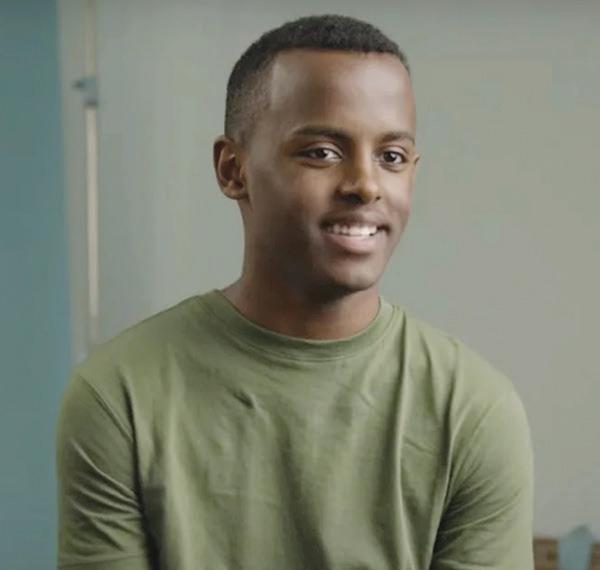
“I’m really passionate about skin-cancer research,” Heman told TIME. “It’s
absolutely incredible to think that one day my bar of soap will be able to make a direct
impact on somebody else’s life.”
Born in Addis Ababa, Ethiopia, Heman and his family emigrated to the U.S. when he was four years old. Even at that young age, the budding scientist remembers seeing laborers working in the hot African sun without skin protection.
In the U.S., Heman began hearing about the dangers of the sun’s ultraviolet rays and the damage it can cause — including skin cancer. It is the most common cancer in the United States, but the disease is treatable, especially if it’s caught early.
A few years ago, Heman read about imiquimod — a multi-use drug approved to treat one type of skin cancer — and wondered if it could be an effective, simple treatment for early-stage patients. His logic was simple: “Almost everyone uses soap and water.”
So, he got to work, developing an imiquimod soap, winning the 3M Young
Scientist Challenge (and a $25,000 prize) in the process.
This summer Heman worked part-time in a lab at the Johns Hopkins Bloomberg School of Public Health in Baltimore to refine the product. Over the next five years, he hopes to create a nonprofit organization that can distribute the soap to communities in need.
Deboarh Isabelle, a 3M engineer and Heman’s mentor during the Young Scientist Challenge competition, said the TIME Kid of the Year honor was well deserved.
“Heman is an incredibly charismatic, curious, intelligent, articulate young man,” Isabelle said. “But more than that, he’s compassionate and has a heart for people. He’s created an invention that has the potential to make the world better for so many people.”
This article was originally published by Word in Black.
By Aria Brent AFRO Staff Writer abrent@afro.com
Planned Parenthood Federation of America (Planned Parenthood) is focused on providing quality sexual and reproductive healthcare. From breast exams to cancer screenings, the organization does it all.
For decades, Planned Parenthood has been a light at the end of the tunnel, providing medical services and support to far too many women with little or no access to health care.
While the organization has acknowledged its unsavory roots in the eugenics movement, today, people like Dr. Megan Freeland work diligently to provide care and education to millions of women on an annual basis- regardless of race.
Freeland currently serves as the director of health communications for the non-profit organization and she’s making sure that marginalized communities are receiving the education and resources they deserve. The pharmacist turned communications specialist spoke with the AFRO about her goals in the role, challenges she’s faced and the Planned Parenthood initiatives aimed at increasing access to their services.
AFRO: How did you get involved with Planned Parenthood and how long have you been in this role?
Dr. Megan Freeland: I have been with Planned Parenthood for over three years and I have been in my current role for about two years. When I came to Planned Parenthood in 2021, I came in as the associate director of Black health media. I found myself in that position because I had been working independently as a freelancer focusing on health content writing and health content strategy. I was doing a lot of work with digital health and health tech companies. I was helping them develop content strategies that were going to be most impactful for Black communities and other communities of color.
As a pharmacist by training and someone who has experience in medical and health communications, I know that a lot of published health information is done for default communities–which typically means White communities. When it comes to health care it’s important that information be tailored to specific audiences so that it’s relevant to their lives. When I saw that Planned Parenthood was looking for someone to help with the development of health information for Black communities and to engage with Black outlets to make sure that information was getting out to those folks I was really excited about the opportunity. When I was promoted to my current position, I went from only focusing on Black health media to leading the team that focuses on Black health media, as well as other other things under that umbrella.
AFRO: What are some of the responsibilities that you have in this role ?
MF: One part of my job is making sure that patients and families and everyday people know about the incredible work that Planned Parenthood is doing across the country to provide sexual reproductive health care and education. The internal partners that we work with are spending their time innovating in digital health and health technology.They’re innovating in education and in health care. Oftentimes, because they are being forced to innovate by the landscape of sexual and reproductive health care in the U.S. right now, they are innovating in arts and entertainment.
It’s really exciting work. We collaborate with a lot of external partners to execute. We might engage with the media. We might work with conferences or people who are hosting in person events to make sure that Planned Parenthood experts are represented there, communicating about the work they’re doing. We might

show up at cultural events like ESSENCE Fest to make sure that we’re meeting people where they are.
Those are my responsibilities from a Planned Parenthood perspective. However, on a personal level, what is most important to me is beyond “Here’s the great work that Planned Parenthood is doing.” The question is “How can I help my team find creative ways to inform people about critical health care topics?”
Whether it’s abortion care, or cervical health, contraception, sex, education – any of those topics – what motivates me to do this work is my professional mission of fighting health misinformation.
AFRO: What are some of your goals for this position?
MF: What first comes to mind when I hear you ask that is stigma. Stigma related to sexual and reproductive health care is so pervasive across society. It’s not just something I come across in my work, it’s something that I see and hear every day whether I’m talking to loved ones in person or I’m scrolling through social media. Sometimes people think that stigma is just social in nature, like it doesn’t actually harm people. They think that it just
“Whether it’s abortion care, or cervical health, contraception, sex, education – any of those topics – what motivates me to do this work is my professional mission of fighting health misinformation.”
sounds bad or makes people feel bad, but stigma has very concrete consequences. It keeps people from talking about issues that are really important to discuss with trusted individuals. It keeps people from getting care.
It can be so easy to go to your local Planned Parenthood and get tested for sexually transmitted infections but there’s a stigma that often keeps people from doing that. For me, one of my goals in this work is to do everything we can to eliminate stigma in sexual and reproductive health care. Another goal of mine is making sure that sexual and reproductive health care isn’t being lost in the health equity movement. It has to be central to all of the work that we do because if we look at health outcomes across different racial and ethnic demographics, we consistently see minority communities getting the short end of the stick. We’re having health disparities that aren’t affecting White communities. The maternal health crisis is a perfect example of that.
AFRO: What has been your greatest challenge in this role thus far ?
MF: A part of “meeting people where they are” is community and collaboration. We enjoy working with other entities, whether they are corporate brands or reporters, journalists, artists or celebrities. Those collaborations are really important to getting info in front of different audiences and making sure the messages are getting there as well.
We’ve been very fortunate to have amazing collaborators that we’ve been able to work with. However, every now and then we’ll run into issues where an organization or entity is not able to collaborate because of preconceived notions or stigma about the types of care that Planned Parenthood provides. That’s always discouraging because you realize that the effects of stigma are still there. The other challenge that I run into is prioritization because there is so much work to be done. There’s never a shortage of work to be done. There’s never a shortage of communities that we want to do more outreach and engagement with. There’s never a shortage of misinformation that we need to correct in some way. Recognizing that we are people too and we have lives outside of work and we have families and priorities and loved ones.
AFRO: What is the communications team at Planned Parenthood being intentional about?
MF: You mentioned this word earlier: inclusiveness. I think that is something that our organization is being really intentional about. How do we make sure that we’re not overlooking communities or experiences that are commonly overlooked in the work that we do? Whether it’s communicating about sex education and not just in the context of standard heterosexual relationships, but also making sure LGBTQ plus communities are also reflected in our communications about sex education. That’s just one example, but it represents our approach to making sure that we’re not leaving people behind– especially people who live in the communities that are already facing the most barriers to care because of racism in the health care system.
We’re being intentional about what kinds of spaces our experts are showing up in. We know that in the world we live in today, there are endless ways of engaging with organizations.
People still go places in person, so there’s the in person experience, there’s the social experience and there’s the event experience. Within all of those buckets there are multiple categories and ways that people engage. Twenty years ago, people were able to get news and information differently than how they do today. We’re really committed to continuously learning about how people are getting information, how people want to get information and where they’re going. We then, in turn, take that information and adjust our strategy to make sure that we are getting into these new places.

By LaTricea D. Adams Word In Black
This summer, we witnessed weather transform from a mere inconvenience to a nationwide crisis in our Black communities. What was once a hot day or heavy rain now poses a direct threat to our health — particularly for our elderly, child-birthing people, pregnant mothers, and children — and it places a strain on our finances.
The Biden Administration has taken significant steps in the right direction, but the urgency of our situation demands more. The stakes are high, and the time is now for all of us to continue demanding more, pushing for stronger protections, and developing solutions within our communities. We cannot just prepare for the next heatwave, flood, or hurricane; we must be ready to overcome the extreme-weather impacts. But this is not just about weather — it’s about systemic inequities that leave Black neighborhoods more vulnerable to climate disasters and less likely to receive adequate support in their aftermath.
As a young Black environmental activist and founder of Young, Gifted and Green, I’m here to sound the alarm about the devastating impact that extreme weather has had on our communities this year, especially in Michigan, Georgia, and Pennsylvania. The scorching temperatures and flooding we faced were particularly disruptive for our elders and the most vulnerable. I also want to offer solutions that can provide a way out of what seems impossible.
The toll of climate change
In Michigan, the heart of Detroit faced catastrophic flooding. Houses that have stood for generations were suddenly filled with water, destroying belongings and displacing families. In Georgia, scorching heat waves made daily life unbearable, with older adults and children suffering the most. Meanwhile, Pennsylvania saw a terrifying mix of floods and heat, hitting communities like Philadelphia with a double whammy of climate chaos.
What happens in these states, all home to significant Black populations, highlights a grim reality: our communities are often hit first and worst by extreme weather.
This isn’t a coincidence. It’s the result of decades of underinvestment, environmental racism, and economic disparities. We’re talking about poor infrastructure, limited green spaces, and homes less likely to have air conditioning or proper insulation. When disasters strike, our neighborhoods often lack the resources to recover quickly, if at all.

The impact of the inflation reduction act
So, what can be done to address this? Let’s start with the Inflation Reduction Act at the federal level. This landmark new law, pushed through by the Biden-Harris administration, includes much-needed funding for climate resilience and infrastructure improvements. Across the country, communities are benefitting from the $369 billion in historic climate and clean-energy investments. These investments will help retrofit homes, improve energy efficiency, and support renewable energy projects — crucial for Black communities, which are more likely to consist of older, energy-inefficient homes and apartments.
The IRA also includes disaster preparedness and response funding, ensuring that communities have the resources to withstand extreme weather. But here’s the kicker: for these funds to make a real difference, they must be equitably distributed. Too often, federal aid bypasses the most vulnerable in favor of those with a safety net. We must ensure that Black communities are front and center in these initiatives.
But we can’t wait for the federal government to fix everything. Grassroots action, especially at the state and local levels, is equally essential.
By Willy Blackmore Word In Black
A federal judge in Louisiana has blocked the federal government from investigating whether race should be considered as a factor in the enforcement of environmental laws, including the issuing of pollution permits.
The ruling from the U.S. District Court for Western Louisiana, issued late last month, makes permanent a hold on disparate impact assessments that was put in place back in January.
The decision by Judge James Cain, an appointee of former President Donald Trump, effectively bars the Environmental Protection Agency from using Title VI of the Civil Rights Act, the agency’s best — and arguably only — enforcement mechanism for environmental justice issues.
At issue is the EPA’s action taken on a claim that Earthjustice, an environmental law organization, filed with the agency in 2022 on behalf of residents in St. John the Baptist parish — a community located in the heart of the state’s
infamous Cancer Alley. Earthjustice wanted the EPA to investigate whether petrochemical corporations deliberately located a vast network of industrial facilities in a predominantly Black community, disparately harming the residents.
The landscape for the claim looked much more favorable then: the Biden administration and the EPA
had taken a much more aggressive approach with environmental justice issues.
A draft plan negotiated between the EPA and the state of Louisiana showed that there was the possibility of overhauling the pollution permitting process, so that the cumulative effect of an industry on a given area would be considered. Things changed when
In Michigan, Young, Gifted and Green’s Flint Youth Environmental Justice Council is training youth on civic engagement and community service grounded in the environmental justice principles. Another organization providing solutions includes the Detroit Black Community Food Security Network, which works to build sustainable urban agriculture, ensuring that residents have access to fresh, affordable food even in times of crisis. They also advocate for better flood management systems and infrastructure improvements to prevent future disasters.
In Georgia, community cooling centers have become a lifeline. Churches, schools, and community centers are opening their doors, providing a haven from the oppressive heat. These centers offer physical relief while fostering a sense of solidarity and mutual aid. Meanwhile, advocacy groups are pushing for better enforcement of environmental regulations to protect vulnerable neighborhoods from industrial pollution and its exacerbating effects on climate change.
Pennsylvania’s Black communities are organizing around resilience, too. In Philadelphia, initiatives like the Philly Thrive movement fight for clean air and environmental justice. They’re demanding that the city invest in green infrastructure,
can’t
such as parks and community gardens. These spaces can mitigate the impacts of extreme weather. The spaces help manage stormwater and provide crucial cooling effects during heat waves.
Community resilience and the power of voting
Education and advocacy are critical components of community resilience. We must empower our communities with the knowledge and tools to advocate for their rights and demand action from local officials. Workshops on disaster preparedness, energy efficiency, and environmental justice can make a significant difference. When we understand the systems at play, we can better navigate and challenge them. This is our power, our voice, and our right to demand a better future for our communities.
On a broader scale, voting remains one of our most powerful tools. Climate change is a political issue, and the leaders we elect directly impact our ability to address it. We must support candidates who prioritize climate justice and are committed to equitable solutions. This means voting in both national and local elections, where decisions about infrastructure, zoning, and community resources are made. Your vote is not just a mark on a ballot; it’s a powerful tool that shapes the future of our communities.
Moreover, businesses and entrepreneurs in our communities can play a pivotal role. Investing in renewable energy projects, sustainable agriculture, and green building practices can create jobs and build resilience. Black-owned businesses, in particular, can lead the way in fostering a more sustainable and equitable future.
A call to action
The extreme weather of 2024 is a wake-up call, a stark reminder that climate change is here and hitting Black communities hard. But it’s also a call to action. By leveraging federal resources like the Inflation Reduction Act, working at the grassroots level, and voting for leaders committed to climate change and environmental justice, we can build resilience and protect our communities.
The fight for climate justice is inseparable from the fight for equal justice. We must continue to stand together, advocate for our rights, and build a future where our communities not only survive but thrive, creating better futures for all.
This article was originally published by Word In Black.
then-state Attorney General Jeff Landry sued the EPA over its use of the disparate impact framework. He argued that Title VI should come into play only if an investigation found clear proof of overt racial discrimination.
In Landry’s argument, the federal government essentially would need to find indisputable evidence that a Louisiana official pushed the

chemical companies to build in St. John’s Parish with the explicit intent of harming its Black residents.
After the lawsuit, the EPA dropped its investigation, as well as similar Title VI
license to poison Black and brown communities for generations, only to now have one court give it a permanent free pass to abandon its responsibilities,” Patrice Simms, Earthjustice’s
“Louisiana has given industrial polluters open license to poison Black and brown communities for generations, only to now have one court give it a permanent free pass to abandon its responsibilities.”
investigations in Republicancontrolled states across the country. An April letter from 23 Republican state attorneys general called disparate impact “racial engineering,” and made it clear that Louisiana is not alone in its desire to quash Title XI investigations.
While the new ruling only applies to Louisiana, other states will likely try to get similar protections from EPA investigations.
“Louisiana has given industrial polluters open
vice president for healthy communities, said about the August ruling in a statement.
“Louisiana’s residents, its environmental justice communities, deserve the same Title VI protections as the rest of the nation.” Now, it seems more a question of whether environmental justice communities outside of Louisiana will be able to keep their Title VI protections too.
This article was originally published by Word In Black.

SUPERIOR COURT OF THE DISTRICT OF COLUMBIA
PROBATE DIVISION
ADMINISTRATION NO. 2024ADM000947
CECIL W DIGGS AKA
CECIL WALTER DIGGS Name of Decedent Notice of Appointment, Notice to Creditors and Notice to Unknown Heirs
XIMENIA LAVERNE BROWN, whose address is 4331 BARKER ST SE WASHINGTON DC 20019 was appointed Personal Representative of the estate of CECIL W DIGGS AKA CECIL WALTER DIGGS, who died on JULY 01, 2024 with a Will and will serve without Court supervision. All unknown heirs and heirs whose whereabouts are unknown shall enter their appearance In this proceeding. Objections to such, appointment shall be filed With the Register of Wills, D.C., Building A, 515 5th Street, N.W., 3rd Floor, Washington, D.C. 20001, on or before MARCH 02, 2025. Claims against the decedent shall be presented to the undersigned with a copy to the Register of Wills or filed with the Register of Wills with a copy to the undersigned, on or before MARCH 02, 2025 or be forever barred. Persons believed to be heirs or legatees of the decedent who do not receive a copy of this notice by mail within 25 days of its publication shall so inform the Register of Wills, including name, address and relationship. Date of first publication: AUGUST 30, 2024 Name of newspaper and/or periodical: Daily Washington Law Reporter AFRO American Newspapers
ALEXANDRA CHERI RUCKER Personal Representative TRUE TEST COPY REGISTER OF WILLS 8/23, 8/30, 9/06/24
SUPERIOR COURT OF THE DISTRICT OF COLUMBIA PROBATE DIVISION ADMINISTRATION NO. 2024ADM000924 JOHN YOUNG Name of Decedent Notice of Appointment, Notice to Creditors and Notice to Unknown Heirs
MAGGIELENE YOUNG SMITH, whose address is 2327 PEMBERELL PLACE, DISTRICT HEIGHTS, MD 20747, was appointed Personal Representative of the estate of JOHN YOUNG, who died on APRIL 14, 2024 without a Will and will serve without Court supervision. All unknown heirs and heirs whose whereabouts are unknown shall enter their appearance In this proceeding. Objections to such, appointment shall be filed With the Register of Wills, D.C., Building A, 515 5th Street, N.W., 3rd Floor, Washington, D.C. 20001, on or before FEBRUARY 23, 2025. Claims against the decedent shall be presented to the undersigned with a copy to the Register of Wills or filed with the Register of Wills with a copy to the undersigned, on or before FEBRUARY 23, 2025 or be forever barred. Persons believed to be heirs or legatees of the decedent who do not receive a copy of this notice by mail within 25 days of its publication shall so inform the Register of Wills, including name, address and relationship. Date of first publication: AUGUST 23, 2024 Name of newspaper and/or periodical: Daily Washington Law Reporter AFRO American Newspapers
MAGGIELENE YOUNG SMITH Personal Representative TRUE TEST COPY REGISTER OF WILLS 8/23, 8/30, 9/06/24
SUPERIOR COURT OF THE DISTRICT OF COLUMBIA PROBATE DIVISION ADMINISTRATION NO. 2024ADM000938
PENNELLA BUCHANAN Name of Decedent NICKEY EARLINE PATTERSON 6710 OXON HILL ROAD, SUITE 210 OXON HILL, MD 20745 Notice of Appointment, Notice to Creditors and Notice to Unknown Heirs
EVERETT BUCHANAN, whose address is 12602 LAMPTON LANE, FORT WASHINGTON MD 20744, was appointed Personal Representative of the estate of PENNELLA BUCHANAN, who died on MARCH 22, 2024 without a Will and will serve without Court supervision. All unknown heirs and heirs whose whereabouts are unknown shall enter their appearance In this proceeding. Objections
XIMENIA LAVERNE BROWN Personal Representative
TRUE TEST COPY REGISTER OF WILLS 8/30, 9/06, 9/13/24
SUPERIOR COURT OF THE DISTRICT OF COLUMBIA PROBATE DIVISION ADMINISTRATION NO. 2024ADM000690
CARLOS ANTONIO FERNANDEZ Name of Decedent
WILLIAM A. BLAND, ESQUIRE 80 M STREET SE 3330 WASHINGTON DC 20003 Notice of Appointment, Notice to Creditors and Notice to Unknown Heirs MONICA THOMAS , whose address is 2224 36TH STREET SE WASHINGTON DC 20020 was appointed Personal Representative of the estate of CARLOS ANTONIO FERNANDEZ, who died on JANUARY 16, 2024 without a Will and will serve without Court supervision. All unknown heirs and heirs whose whereabouts are unknown shall enter their appearance In this proceeding. Objections to such, appointment shall be filed With the Register of Wills, D.C., Building A, 515 5th Street, N.W., 3rd Floor, Washington, D.C. 20001, on or before MARCH 02, 2025. Claims against the decedent shall be presented to the undersigned with a copy to the Register of Wills or filed with the Register of Wills with a copy to the undersigned, on or before MARCH 02, 2025 or be forever barred. Persons believed to be heirs or legatees of the decedent who do not receive a copy of this notice by mail within 25 days of its publication shall so inform the Register of Wills, including name, address and relationship.
Date of first publication: AUGUST 30, 2024
Name of newspaper and/or periodical: Daily Washington Law Reporter AFRO American Newspapers
MONICA THOMAS Personal Representative
TRUE TEST COPY REGISTER OF WILLS 8/30, 9/06, 9/13/24
SUPERIOR COURT OF THE DISTRICT OF COLUMBIA PROBATE DIVISION ADMINISTRATION NO. 2024ADM000834
EVELYN C. CRAIG
Name of Decedent Notice of Appointment, Notice to Creditors and Notice to Unknown Heirs
TERRENCE J. CRAIG, whose address is 3017 15TH NE WASHINGTON DC 20017 was appointed Personal Representative of the estate of EVELYN C. CRAIG, who died on MAY 10, 2013 without a Will and will serve without Court supervision. All unknown heirs and heirs whose whereabouts are unknown shall enter their appearance In this proceeding. Objections to such, appointment shall be filed With the Register of Wills, D.C., Building A, 515 5th Street, N.W., 3rd Floor, Washington, D.C. 20001, on or before MARCH 02, 2025. Claims against the decedent shall be presented to the undersigned with a copy to the Register of Wills or filed with the Register of Wills with a copy to the undersigned, on or before MARCH 02, 2025 or be forever barred. Persons believed to be heirs or legatees of the decedent who do not receive a copy of this notice by mail within 25 days of its publication shall so inform the Register of Wills, including name, address and relationship.
Date of first publication: AUGUST 30, 2024
Name of newspaper and/or periodical: Daily Washington Law Reporter
AFRO American Newspapers
TERRENCE J. CRAIG
Personal Representative
TRUE TEST COPY REGISTER OF WILLS 8/30, 9/06, 9/13/24
SUPERIOR COURT OF THE DISTRICT OF COLUMBIA
PROBATE DIVISION ADMINISTRATION NO. 2024ADM000487
SONIA M. CORMACK Name of Decedent
VICKEY A. WRIGHT-SMITH 1629 K STREET, NW #300
WASHINGTON DC 20006 Notice of Appointment, Notice to Creditors and Notice to Unknown Heirs
TAVON CORMACK , whose address is 1658 F ST. NE WASHINGTON DC 20002 was appointed Personal Representative of the estate of SONIA M. CORMACK, who died on OCTOBER 03, 2023 without a Will and will serve without Court supervision. All unknown heirs and heirs whose whereabouts are unknown shall enter their appearance In this proceeding. Objections to such, appointment shall be filed With the Register of Wills, D.C., Building A, 515 5th Street, N.W., 3rd Floor, Washington, D.C. 20001, on or before MARCH 02, 2025. Claims against the decedent shall be presented to the undersigned with a copy to the Register of Wills or filed with the Register of Wills with a copy to the undersigned, on or before MARCH 02, 2025 or be forever barred. Persons believed to be heirs or legatees of the decedent who do not receive a copy of this notice by mail within 25 days of its publication shall so inform the Register of Wills, including name, address and relationship. Date of first publication: AUGUST 30, 2024
Name of newspaper and/or periodical: Daily Washington Law Reporter AFRO American Newspapers
TAVON CORMACK Personal Representative
TRUE TEST COPY REGISTER OF WILLS 8/30, 9/06, 9/13/24
SUPERIOR COURT OF THE DISTRICT OF COLUMBIA PROBATE DIVISION ADMINISTRATION NO. 2024ADM000944
VIRGINIA WILSON Name of Decedent Notice of Appointment, Notice to Creditors and Notice to Unknown Heirs
ELIZABETH DOZIER , whose address is 1900 3RD STREET N.E WASHINGTON DC 20002 was appointed Personal Representative of the estate of VIRGINIA WILSON, who died on MARCH 03, 2024 without a Will and will serve without Court supervision. All unknown heirs and heirs whose whereabouts are unknown shall enter their appearance In this proceeding. Objections to such, appointment shall be filed With the Register of Wills, D.C., Building A, 515 5th Street, N.W., 3rd Floor, Washington, D.C. 20001, on or before MARCH 02, 2025. Claims against the decedent shall be presented to the undersigned with a copy to the Register of Wills or filed with the Register of Wills with a copy to the undersigned, on or before MARCH 02, 2025 or be forever barred. Persons believed to be heirs or legatees of the decedent who do not receive a copy of this notice by mail within 25 days of its publication shall so inform the Register of Wills, including name, address and relationship. Date of first publication: AUGUST 30, 2024 Name of newspaper and/or periodical: Daily Washington Law Reporter AFRO American Newspapers
ELIZABETH DOZIER Personal Representative
TRUE TEST COPY REGISTER OF WILLS 8/30, 9/06, 9/13/24
SUPERIOR COURT OF THE DISTRICT OF COLUMBIA
PROBATE DIVISION
ADMINISTRATION NO. 2024ADM000983
JUWAUN ROBERT SMITH Name of Decedent
NATALIE S. WALKER ESQ. 1101 CONNECTICUT AVENUE NW SUITE 402 WASHINGTON DC 20036
Notice of Appointment, Notice to Creditors and Notice to Unknown Heirs
JAKIA SMITH, whose address is 3541 JAY STREET, NE, #101 WASHINGTON DC 20019 was appointed Personal Representative of the estate of JUWAUN ROBERT SMITH who died on OCTOBER 22, 2019 without a Will and will serve without Court supervision. All unknown heirs and heirs whose whereabouts are unknown shall enter their appearance In this proceeding. Objections to such, appointment shall be filed With the Register of Wills, D.C., Building A, 515 5th Street, N.W., 3rd Floor, Washington, D.C. 20001, on or before MARCH 06, 2025. Claims against the decedent shall
PROBATE DIVISION ADMINISTRATION NO. 2024ADM000976 PAMELA BAYLOR Name of Decedent Notice of Appointment, Notice to Creditors and Notice to Unknown Heirs ASHLEY SIMMONS, whose address is 500 21ST STREET NE WASHINGTON DC 20002 was appointed Personal Representative of the estate of PAMELA BAYLOR who died on MAY 16, 2024 without a Will and will serve without Court supervision. All unknown heirs and heirs whose whereabouts are unknown shall enter their appearance In this proceeding. Objections to such, appointment shall be filed With the Register of Wills, D.C., Building A, 515 5th Street, N.W., 3rd Floor, Washington, D.C. 20001, on or before MARCH 06, 2025. Claims against the decedent shall be presented to the undersigned with a copy to the Register of Wills or filed with the Register of Wills with a copy to the undersigned, on or before MARCH 06, 2025 or be forever barred. Persons believed to be heirs or legatees of the decedent who do not receive a copy of this notice by mail within 25 days of its publication shall so inform the Register of Wills, including name, address and relationship. Date of first publication: SEPTEMBER 06, 2024 Name of newspaper and/or periodical: Washington Law Reporter AFRO American Newspapers
ASHLEY SIMMONS Personal Representative


CITY OF BALTIMORE
DEPARTMENT OF PUBLIC WORKS
OFFICE OF ENGINEERING AND CONSTRUCTION
NOTICE OF LETTING

Payment Policy for legal notice advertisements.
Effective immediately, The Afro American Newspapers will require prepayment for publication of all legal notices
Payment will be accepted in the form of checks, credit card or money order. Any returned checks will be subject to a $25.00 processing fee and may result in the suspension of any future advertising at our discretion.
LEGAL NOTICES
MBE/WBE Subcontractors and Suppliers
Ulliman Schutte Construction, LLC, Chantilly, VA is interested in receiving quotes from qualified MBE/WBE subcontractors and suppliers for the Miscellaneous Facility Upgrade – Phase 8, Pre- Dewatering Centrifuges Nos.1 & 12 Upgrades bidding on September 19, 2024. Opportunities are available for Specifications Divisions
1 ,3, 5, 7, 9, 10, 26, 40, 43 and 44. Please Fax quotes to 703-434-3714. Contact Phone : 703-972-6053. Ulliman Schutte Construction, LLC 14420 Albemarle Point Place Chantilly, VA 20151 www.ullimanschutte.com Equal Opportunity Employer
CITY OF BALTIMORE
DEPARTMENT OF PUBLIC WORKS
OFFICE OF ENGINEERING AND CONSTRUCTION
NOTICE OF LETTING
Sealed Bids or Proposals, in duplicate addressed to the Board of Estimates of the Mayor and City Council of Baltimore and marked for WATER CONTRACT NO. 1354R-Ashburton Washwater Lake Dredging will be received at the Office of the Comptroller, Room 204 City Hall, Baltimore, Maryland until 11:00 A.M on October 16, 2024. Positively no bids will be received after 11:00 A.M. Bids will be publicly opened by the Board of Estimates and can be watched live on CharmTV’s cable channel 25/1085HD; charmtvbaltimore.com/watch-live or listen in at (443) 984-1696 (ACCESS CODE: 0842939) from City Hall at Noon. The Contract Documents may be examined, without charge, at Contract Administration 4 South Frederick Street Baltimore, Maryland 21202 on the 3 rd floor (410) 396-4041 as of September 6, 2024 and copies may be purchased for a non-refundable cost of 150.00. Conditions and requirements of the Bid are found in the bid package. All contractors bidding on this Contract must first be prequalified by the City of Baltimore Contractors Qualification Committee. Interested parties should call (410) 3966883 or contact OBC at 4 S Frederick St., 4 th Floor, Baltimore, MD 21202. If a bid is submitted by a joint venture (“JV”), then in that event, the document that established the JV shall be submitted with the bid for verification purposes. The Prequalification Category required for bidding on this project is G90013 Dredging. Cost Qualification Range for this work shall be $5,000,000.01 to $10,000,000.00
A “Pre-Bidding Information” session will be conducted via Microsoft Teams. Vendor can call 1 667-401-2804 Phone Conference ID: 493 020 472# or Microsoft Teams Meeting ID: 254 328 680 671 Passcode: eSBYWt on September 11, 2024 at 10:00 AM
A site visit to the Ashburton Wash Water Lake will be conducted on September 20, 2024 at 10:00 am. For any Prebid questions contact Mr. Farid Sikander at farid.sikander@ baltimorecity.gov). Contractor questions shall be submitted (in writing only) by October 4, 2024, 4:00 PM
To purchase a bid book, please make an electronic request at: https://publicworks.baltimorecity.gov/dpw-construction-projectsnotice-letting and dpwbidopportunities@baltimorecity.gov. For further inquiries about purchasing bid documents, please contact the assigned Contract Administrator Doreen.diamond@baltimorecity.gov
Principal items of work for this contract include, but are not limited to: Mobilization and furnishing of all labor, material, equipment, and incidentals necessary for the removal of alum sludge and filter backwash solids from the Washwater Lake and final disposal of the sludge and filter backwash solids in an approved disposal site. The solids will need to be removed from the Washwater Lake, dewatered on site to reduce the amount of water to be hauled and disposed, and trucked to a final disposal site. After the work is completed, site restoration of all disturbed areas will be performed.
The MBE goal is 27% The WBE goal is 14% APPROVED: APPROVED: Clerk, Board of Estimates Khalil Zaied Acting Director Department of Public Works
CITY OF BALTIMORE
DEPARTMENT OF PUBLIC WORKS
OFFICE OF ENGINEERING AND CONSTRUCTION
Sealed Bids or Proposals, in duplicate addressed to the Board of Estimates of the Mayor and City Council of Baltimore and marked for WATER CONTRACT NO. 1418-Small Water Main Replacement at Yale Heights will be received at the Office of the Comptroller, Room 204 City Hall, Baltimore, Maryland until 11:00 A.M on October 16, 2024. Positively no bids will be received after 11:00 A.M. Bids will be publicly opened by the Board of Estimates and can be watched live on CharmTV’s cable channel 25/1085HD; charmtvbaltimore.com/watch-live or listen in at (443) 984-1696 (ACCESS CODE: 0842939) from City Hall at Noon. The Contract Documents may be examined, without charge, at Contract Administration 4 South Frederick Street Baltimore, Maryland 21202 on the 3 rd floor (410) 396-4041 as of September 6, 2024 and copies may be purchased for a non-refundable cost of 100.00. Conditions and requirements of the Bid are found in the bid package. All contractors bidding on this Contract must first be prequalified by the City of Baltimore Contractors Qualification Committee. Interested parties should call (410) 396- 6883 or contact OBC at 4 S Frederick St., 4 th Floor, Baltimore, MD 21202. If a bid is submitted by a joint venture (“JV”), then in that event, the document that established the JV shall be submitted with the bid for verification purposes. The Prequalification Category required for bidding on this project is B02551 – Water Mains. Cost Qualification Range for this work shall be $5,000,000.01 to $10,000,000.00
A “Pre-Bidding Information” session will be conducted via Microsoft Team Meeting. Vendor can call 1 667- 228-6519 Phone Conference ID: 941 621 589# on September 11, 2024, at 1:00 PM. Contractors questions shall be submitted via email to Latonia Walston at Lwalston@baltimorecity.gov by September 18, 2024 at 4:30 PM.
Questions submitted after the deadline may not be responded to and Contractors will be required to submit their bids based on the available information.
To purchase a bid book, please make an electronic request at: https://publicworks.baltimorecity.gov/dpw-constructionprojects-notice-letting and dpwbidopportunities@ baltimorecity.gov. For further inquiries about purchasing bid documents, please contact the assigned Contract Administrator LWalston@baltimorecity.gov
Principal items of work for this contract include, but are not limited to: Abandonment and/or removal of existing water mains and installation of various sized new ductile iron pipes, valves, fittings and appurtenances, pipe restraints, replacement/ installation of fire hydrants, small (residential) meter settings and meter vaults, renew and replacement of existing water services, temporary bypass piping, erosion and sediment control measures, maintenance of traffic measures, sidewalks restoration, curb and gutter, and roadway paving, as required.
This project is a recipient of the WIFIA program
The MBE goal is 30% The WBE goal is 15% APPROVED: APPROVED: Clerk, Board of Estimates Khalil Zaied Acting Director Department of Public Works
CITY OF BALTIMORE
DEPARTMENT OF PUBLIC WORKS
OFFICE OF ENGINEERING AND CONSTRUCTION NOTICE OF LETTING
CITY OF BALTIMORE DEPARTMENT OF PUBLIC WORKS OFFICE OF ENGINEERING AND CONSTRUCTION NOTICE OF LETTING
Sealed Bids or Proposals, in duplicate addressed to the Board of Estimates of the Mayor and City Council of Baltimore and marked for WATER CONTRACT NO. 1449-Repaving Utility Cuts and Sidewalk Restoration at Various Locations will be received at the Office of the Comptroller, Room 204 City Hall, Baltimore, Maryland until 11:00 A.M on October 16, 2024. Positively no bids will be received after 11:00 A.M. Bids will be publicly opened by the Board of Estimates and can be watched live on CharmTV’s cable channel 25/1085HD; charmtvbaltimore.com/watch- live or listen in at (443) 984-1696 (ACCESS CODE: 0842939) from City Hall at Noon. The Contract Documents may be examined, without charge, at Contract Administration 4 South Frederick Street Baltimore, Maryland 21202 on the 3rd floor (410) 396-4041 as of September 6, 2024 and copies may be purchased for a non-refundable cost of 100.00
Conditions and requirements of the Bid are found in the bid package. All contractors bidding on this Contract must first be prequalified by the City of Baltimore Contractors Qualification Committee. Interested parties should call (410) 396-6883 or contact OBC at 4 S Frederick St., 4 th Floor, Baltimore, MD 21202. If a bid is submitted by a joint venture (“JV”), then in that event, the document that established the JV shall be submitted with the bid for verification purposes. The Prequalification Category required for bidding on this project is A02602-Bituminous Concrete Paving. Cost Qualification Range for this work shall be $5,000,000.01 to $10,000,000.00
A “Pre-Bidding Information” session will be conducted via Conference Call. Vendor can call 443-984-1696 Passcode: 4250406# on September 13, 2024, at 10:00 AM.
To purchase a bid book, please make an electronic request at: https://publicworks.baltimorecity.gov/dpw-construction-projectsnotice-letting and dpwbidopportunities@baltimorecity.gov. For further inquiries about purchasing bid documents, please contact the assigned Contract Administrator LWalston@baltimorecity.gov
Principal items of work for this contract include, but are not limited to:
* Prepare as required and repave, utility cuts performed by others, with bituminous concrete or Portland cement concrete, milling and resurfacing, and installation of pavement markings, within Baltimore City streets, alleys, and roadways.
* Restoration of various size and types of concrete and masonry sidewalks, replacement of concrete curb, combination curb and gutter, and monolithic medians, at various locations in Baltimore City.
NOTICE OF LETTING
Sealed Bids or Proposals, in duplicate addressed to the Board of Estimates of the Mayor and City Council of Baltimore and marked for WATER CONTRACT NO. 1418-Small Water Main Replacement at Yale Heights will be received at the Office of the Comptroller, Room 204 City Hall, Baltimore, Maryland until 11:00 A.M on October 16, 2024. Positively no bids will be received after 11:00 A.M. Bids will be publicly opened by the Board of Estimates and can be watched live on CharmTV’s cable channel 25/1085HD; charmtvbaltimore.com/watch-live or listen in at (443) 984-1696 (ACCESS CODE: 0842939) from City Hall at Noon. The Contract Documents may be examined, without charge, at Contract Administration 4 South Frederick Street Baltimore, Maryland 21202 on the 3 rd floor (410) 396-4041 as of September 6, 2024 and copies may be purchased for a non-refundable cost of 100.00. Conditions and requirements of the Bid are found in the bid package. All contractors bidding on this Contract must first be prequalified by the City of Baltimore Contractors
JV shall be submitted with the bid for verification purposes. The Prequalification Category required for bidding on this project is B02551 – Water Mains. Cost

Sealed Bids or Proposals, in duplicate addressed to the Board of Estimates of the Mayor and City Council of Baltimore and marked for WATER CONTRACT NO. 1445-Loch Raven Drive Over Unnamed Tributary-LRD Culvert No. 11 will be received at the Office of the Comptroller, Room 204 City Hall, Baltimore, Maryland until 11:00 A.M on October 16, 2024. Positively no bids will be received after 11:00 A.M. Bids will be publicly opened by the Board of Estimates and can be watched live on CharmTV’s cable channel 25/1085HD; charmtvbaltimore. com/watch-live or listen in at (443) 984-1696 (ACCESS CODE: 0842939) from City Hall at Noon. The Contract Documents may be examined, without charge, at Contract Administration 4 South Frederick Street Baltimore, Maryland 21202 on the 3 rd floor (410) 396-4041 as of September 6, 2024 and copies may be purchased for a non-refundable cost of 200.00 Conditions and requirements of the Bid are found in the bid package. All contractors bidding on this Contract must first be prequalified by the City of Baltimore Contractors Qualification Committee. Interested parties should call 410) 396-6883 or contact OBC at 4 S Frederick St., 4 th Floor, Baltimore, MD 21202. If a bid is submitted by a joint venture (“JV”), then in that event, the document that established the JV shall be submitted with the bid for verification purposes. The Prequalification Category required for bidding on this project is B02554 Drainage Structures. Cost Qualification Range for this work shall be $100,000,000.01 to $500,000,000.00.
A “Pre-Bidding Information” session will be conducted virtually on September 12, 2024 at 10:00 a.m.. Vendor can access this Microsoft Teams virtual meeting by utilizing the following ID and passcode: Meeting ID: 226 501 988 667 Passcode: twWA65 or Vendors can call Phone Conference ID: 1 667-401-2804 Passcode: 303530332#._
A site visit will be held on September 19, 2024 at 10:00 a.m
Contractor questions will be accepted (in writing only) until October 4, 2024. For any bid questions, please contact Mr. Farid Sikander at farid.sikander@baltimorecity.gov
To purchase a bid book, please make an electronic request at: https://publicworks.baltimorecity.gov/dpw-construction-projectsnotice-letting and dpwbidopportunities@baltimorecity.gov. For further inquiries about purchasing bid documents, please contact the assigned Contract Administrator Cynthia.Harry@baltimorecity.gov
Principal items of work for this contract include, but are not limited to: Construction of culvert improvements and washout area at Culvert No. 11 per the Plans.
The MBE goal is 30% The WBE goal is 15%
APPROVED: APPROVED: Clerk, Board of Estimates Khalil Zaied Acting Director Department of Public Works
The MBE goal is 30% The WBE goal is 15%
APPROVED: APPROVED: Clerk, Board of Estimates Khalil Zaied Acting Director Department of Public Works
NOTICE OF CONSTRUCTION INDUSTRY OUTREACH TOWN OF HAMPSTEAD HAMPSTEAD, MARYLAND HAMPSTEAD PFAS TREATMENT/CENTRALIZATION PROJECT WATER TREATMENT PLANT CONSTRUCTION
The Town of Hampstead, Maryland is planning to design and construct four (4) new water treatment plants (WTPs) that will remove PFAS and nitrate from its groundwater sources. The WTPs will employ granular activated carbon and ion exchange processes. The designs of these WTPs are approaching completion.
The Town will soon be seeking proposals from Contractors to construct the WTPs. In order to further inform the construction industry, the Town will conduct a meeting to present the scope and timing of the Project. The meeting will take place as follows:
Date and Time: October 10, 2024 at 10:00 am Location of Meeting: Coppermine Pantherplex Auditorium Address: 1400 Panther Dr, Hampstead, MD 21074
The Project is being funded, in part, by grants issued by the Maryland Department of the Environment State Revolving Loan Fund and the United States Environmental Protection Agency Emerging Contaminants in Small or Disadvantaged Communities Grant Program. Qualified minority business enterprises (MBE’s) and women’s business enterprises (WBE’s) are especially encouraged to participate.
To be added to the attendee list for subsequent advertisements, please contact:
Judy Rang Town of Hampstead 410-239-7408 jrang@hampsteadmd.gov
City of Baltimore Department of Finance Bureau of Procurement
Sealed proposals addressed to the Board of Estimates of Baltimore will be Received until, but not later than 11:00 am local time on the following dates for the stated requirements. October 2, 2024
* SOUND SYSTEM for SHAKE and BAKE FAMILY FUN CENTER RFQ-000630
* CITIWATCH CCTV MAINTENANCE, SUPPORT and EXPANSION RFQ-000638 October 16, 2024
* HVAC MAINTENANCE REPAIR and INSTALLATION RFQ-000598
* BOOK BINDING SERVICES RFQ000590
ENTIRE SOLICITATION CAN BE VIEWED AND DOWNLOADED BY VISITING THE WEBSITE: https://wd1.myworkdaysite.com/supplier/baltimorecity/SupplierSite

By Dr. Frances Murphy “Toni” Draper Word In Black
For baseball fans, the popularity of the game
overshadows a more disturbing trend: the number of Americanborn Black players in MLB is at a historic low of 6 percent, despite many efforts to reverse the declining trend. And the question is, why?
I asked AI, and it came up with several theories: a shift in sports preferences among young Black athletes, lack of access and exposure to baseball, few youth baseball programs and the high cost of playing the game.
While these reasons may be valid (who’s to argue with AI?), most sound like the same excuses we’ve all heard about the lack of Black people in boardrooms and C-suites: “We just can’t find anyone qualified,” or “All the eligible, talented players go to college, and “That’s where most of our recruits come from.” Or, “We’re doing the best we can.”
There was a time, however, when Black baseball players in the Negro Leagues themselves were ambivalent about playing in the major leagues, as evidenced by the article below written by AFRO sportswriter Sam Lacy nearly 85 years ago. Eight years before Jackie Robinson broke the color barrier, Lacy not only highlighted the issue at hand, but his writing also reminds us why an independent Black press who tells the whole story was needed then and is still needed today.
“Although there has been much agitation for the inclusion of colored players in major league baseball, it occurred to me recently that few people, if any, seem to care a rap about what the players themselves think of the idea,” Lacy wrote. While journalists, fans and others spoke out in favor of integrating the whites-only major league, he wrote, “no one seems to give a tinker’s damn about the ideas of the guys they’re trying to boot into the organized game.”
Lacy then interviewed four then-active Negro League players — Vic Harris, Jud Wilson, Felton Snow, and Dick Lundy — about what they thought. Some doubted if Negro League players could make it in the bigs; others wondered what would happen to their league if they did.
“We do have some good ball players among us but not nearly as many fit for the majors as seems to be the belief,” Harris said. “But if they start picking them up, what are the remainder going to do to make a living?”
“Our crowds are not what they should be now,” he said.
“And suppose our stars — the fellows who do draw — are gobbled up by the big clubs. How could the other 75 or 80 percent survive?”
Wilson was worried about Black men eating, sleeping, and playing alongside pro players born and bred in the South.
“It will never be because the big-league game, as it is now, is overrun with Southern blood,” he said. “Fellows from the South are in the majority on almost every

team in the major leagues … The training camps are in the South; the majority of minor leagues are located in the South and there’s a strong Southern sentiment in the stands. There’d be trouble for sure.”
Snow, on the other hand,
thought some of the Negro League players “just wouldn’t act right,” if they made it to the majors.
“Some of these fellows who are pretty good out there on the diamond would give you a heartache elsewhere,” he said.
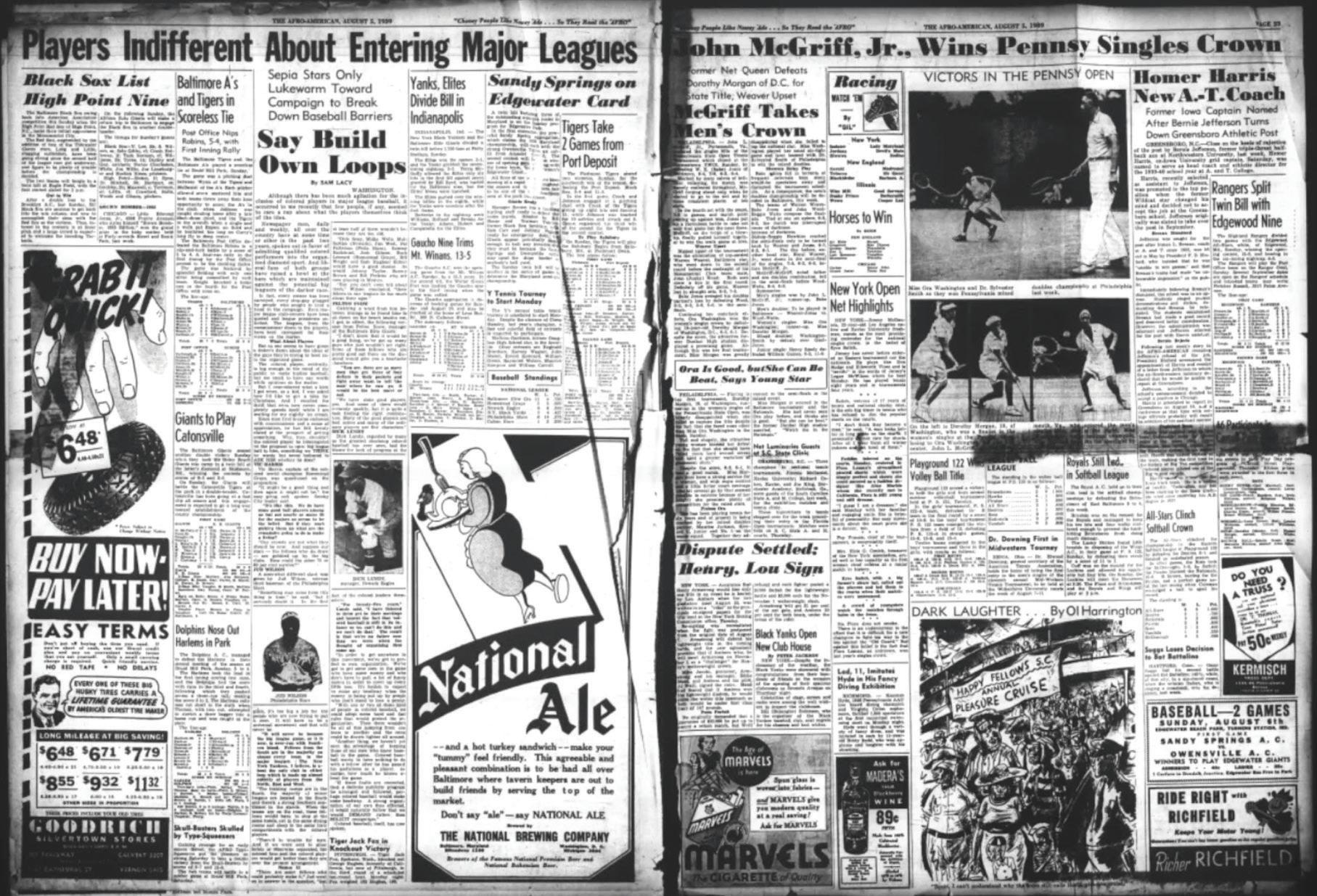
“You see, there are so many men that get three or four dollars in their pockets and right away want to tell ‘the man’ where he can go. I don’t know if it would be the best move or not.”
And Lundy thought the Negro League owners should get their house in order first. “We’ve got to get some men in the game who have some money and who don’t have to pull a lot of funny moves in order to cover up every little loss.”
Lacy summed it up himself: “Colored baseball, itself, has now spoken,” he wrote.
The question, however, remains: “What saith the Black MLB player — or the Black MLB general manager, or the Black MLB manager, or the Black MLB majority baseball owner — about the dismally low number of Black players, general managers, managers, and owners?”
Oh, that’s right: It’s 2024 and there are not a lot of people with first-hand knowledge because only 6 percent of MLB players are Black, there’s only one Black general manager, two Black managers, and ZERO Black majority owners. I wonder what Sam Lacy and those who fought so hard to integrate MLB would have to say about this 85 years later.
Sam Lacy was the sportswriter for the Baltimorebased AFRO for more than five decades. He became the first Black sportswriter to join the Baseball Writers’ Association of America and was inducted into the Baseball Hall of Fame on July 26, 1998. Sam Lacy died March 14, 2014, a few months before his 100th birthday.
This article was originally published by Word In Black.
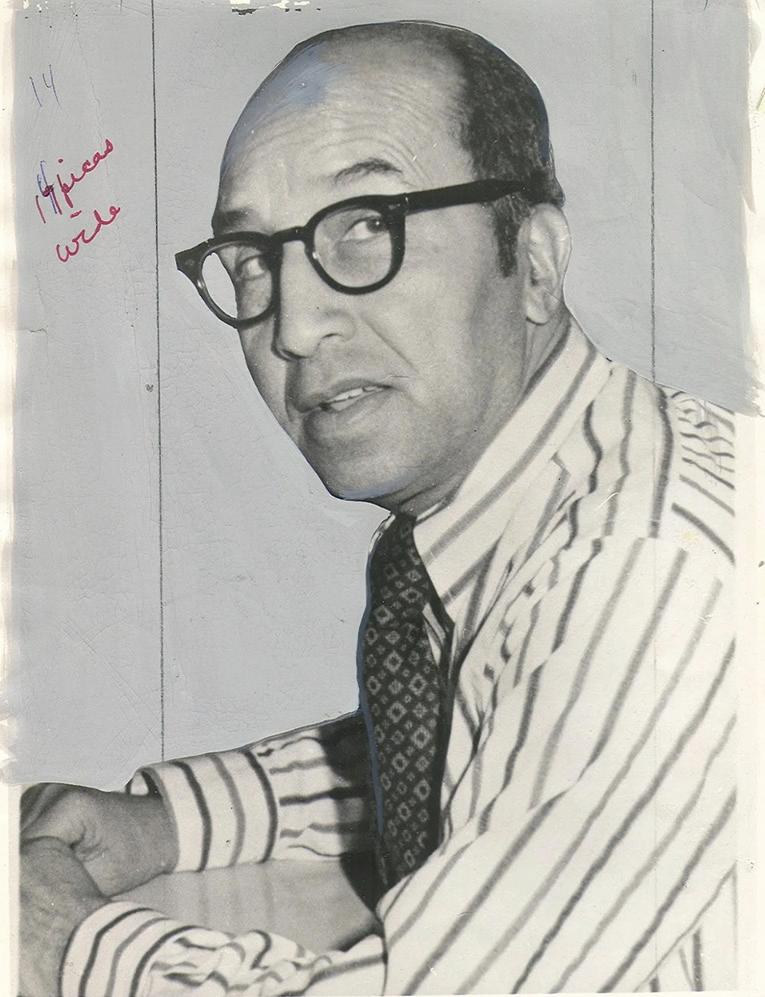
By Dylan Barnes
After completing my first year of college soccer, I have learned the importance of nutrition in my performance on the field and overall function throughout the day. In high school, I did not have as deep an understanding of how much I should be eating and what exactly my meals and snacks should look like throughout the day. Thanks to the team’s nutritionist at Middle Tennessee State, Lindsay Opie, we know how to fuel our bodies on a day-to-day basis properly. I now know different kinds of healthy food choices I should be making and how different my plate looks on a day to day basis especially in season.
Nutrition plays a crucial role in the cognitive and physical performance of students. As high schools prepare students for the challenges of college and beyond, it is essential to implement effective nutrition strategies that support their overall well-being and academic success. High schools should take several key steps to enhance their nutritional programs.
Address the issue of skipping meals
Breakfast is often portrayed as the most important meal of the day, yet many students skip it due to time constraints or lack of access to healthy options. Skipping meals, particularly breakfast, is a common issue among high school students who often sleep in and rush to school without eating. This habit can lead to decreased concentration, lower energy levels and poor academic performance. For athletes, skipping meals is particularly dangerous as they require extra calories to fuel their activities. Schools can address this by offering nutritious breakfast programs that provide balanced meals, including whole grains, proteins, and fruits. Ensuring that all students, especially those from low-income families, have access to a healthy breakfast can improve concentration, memory, and overall academic performance.
Revamp school cafeteria menus
School cafeterias often offer meals that are high in calories, but low in essential nutrients. To address this, schools should collaborate with nutritionists to design menus that include a variety of fruits, vegetables, whole grains, lean proteins and healthy fats. Offering nutritious, tasty and visually appealing meals can encourage students to choose healthier options. Additionally, schools should minimize the availability of sugary drinks and snacks, replacing them with healthier alternatives like water, milk, and whole-food snacks. Athletes need balanced meals to perform their best. The concept of the “athlete plate” can be an effective tool, ensuring that meals include appropriate portions of protein, carbohydrates, and vegetables. According to Opie,
students leave out essential food groups, leading to unbalanced and non-filling meals. Schools should educate athletes on how to build their plates to ensure they are getting the necessary nutrients for energy and recovery.
Promote hydration and healthy snacking Adequate hydration is critical for cognitive function and overall health. Schools should ensure that students have easy access to clean drinking water throughout the day. Installing water fountains and providing reusable water bottles can encourage students to stay hydrated.

Educational campaigns highlighting the benefits of water over sugary drinks can further promote healthy hydration habits. That said, high school students must be educated on the risks of energy drinks. Energy drinks, while popular among teens, can be unhealthy and even dangerous. Many energy drinks raise heart rates and contain elevated levels of caffeine, which can be especially harmful if consumed on an empty stomach. Dependence on these drinks can create problems when students enter college, where they might not have the same access if they are an athlete due to NCAA rules and regulations around these drinks. Schools should educate students on the risks and encourage healthier alternatives for maintaining energy levels. Snacking throughout the day can help maintain energy levels, especially for athletes who have afternoon games and practices. However, finding time for snacks can be challenging due to class schedules. Schools should allow students to have small, nondistracting snacks during class and provide access to healthy options such as protein bars, fruits like apples and clementines, peanut butter crackers and trail mix with nuts and dried fruit.
Involve parents and community
Parental involvement and community support are vital in reinforcing healthy eating habits. Schools should engage parents through workshops, newsletters and events that emphasize the importance of nutrition to their kids and them. Collaborating with local farms and food suppliers to provide fresh produce and hosting farmers’ markets on school grounds can also promote a culture of healthy eating within the community. Teachers, coaches, and school staff play a significant role in influencing students’ behavior. Providing professional development opportunities focused on nutrition can help staff understand the importance of healthy eating and how to support students in making better choices. Staff training can include identifying signs of poor nutrition and understanding how to create a supportive environment for healthy habits.
This article was originally published by County Sports Zone. See more on afro.com
The opinions of these articles are those of the writers and not necessarily those of the AFRO. Send letters to The Afro-American ∙ 233 E. Redwood Street, Suite 600G Baltimore, Md. 21202 or fax to 1-877-570-9297 or e-mail to editor@afro.com
Commentary
Navigating the new normal of cannabis dispensaries in our neighborhoods
By Senator Cory V. McCray
In recent years, Maryland’s landscape has undergone a profound transformation with the rapid proliferation of cannabis dispensaries and smoke shops. Today, more than 100 licensed establishments operate across the state, and with a new wave of licenses recently approved, this number is set to rise. As our government continues to pave the way for more cannabis businesses, we stand on the threshold of an even greater influx into our communities.
Just a year ago, my colleagues and I, in Annapolis, cast our votes in favor of the Cannabis Reform Act with the best of intentions. This legislation, which legalized recreational marijuana in Maryland, allowed individuals 21 and older to possess, use, or grow a small amount of cannabis. We viewed the legalization of recreational marijuana as a bold, progressive step forward—a necessary correction to the inequities of past policies that disproportionately targeted Black communities. I have witnessed firsthand the devastating impact of these penalties on families and neighborhoods, which is why I felt a deep sense of gratitude when the MooreMiller Administration pardoned 175,000 cannabis possession convictions in Md. It was a powerful moment of redemption, a step toward righting historical wrongs.
Yet, as we debated the legalization of recreational cannabis, I found myself grappling with concerns about the potential emergence of problematic businesses. Under the medical cannabis framework, each legislative district was restricted to just two dispensaries. In my district, while one dispensary upheld the standards of the neighborhood, the other became a source of constant concern, generating a flood of emails and phone calls to my office. Despite my efforts
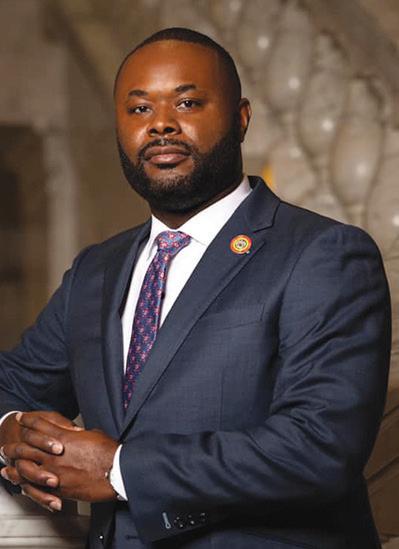
Courtesy photo
Senator Cory V. McCray represents Maryland’s 45th Legislative District, which encompasses Northeast and East Baltimore City. Senator McCray is dedicated to advocating for equitable policymaking, public safety and community development. This week, he discusses cannabis dispensaries in Maryland’s neighborhoods.
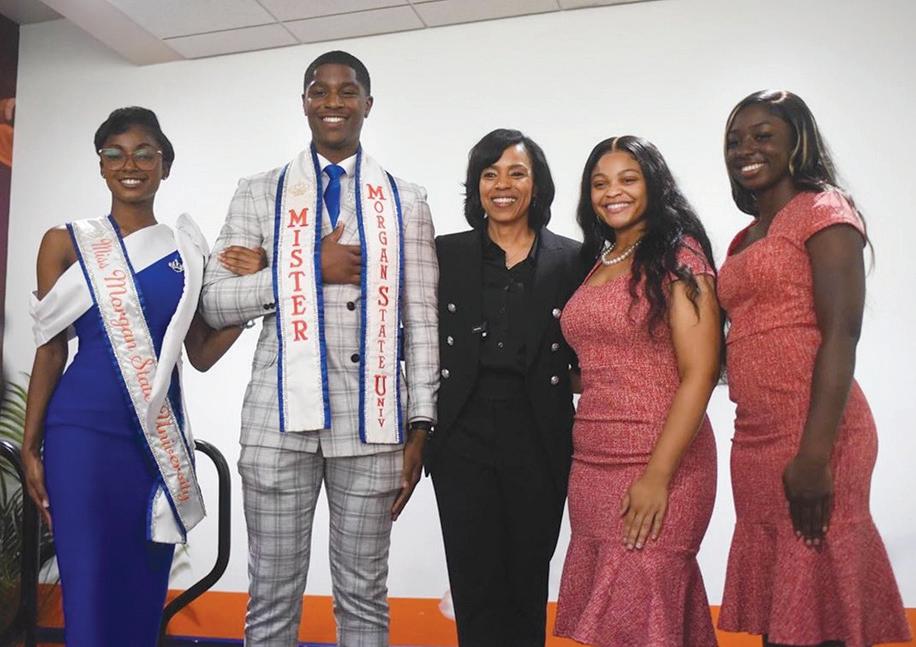
By Ariyana Griffin AFRO Staff Writer agriffin@afro.com
Prince George’s County Executive Angela Alsobrooks, the Democratic U.S. Senate candidate for Maryland, spoke at Morgan State University on Aug. 29 imploring students, alumni, faculty and staff to exercise their right to vote.
Alsobrooks won the Democratic party’s Maryland primary, garnering 357,052 votes – 53.37 percent of all ballots cast. The primary results led her Democratic competitor David J. Trone to drop out of the race, after he spent millions to receive 42.80 percent of all votes submitted. Alsobrooks is now running against former Maryland Governor Larry Hogan, a Republican candidate who pulled 183,661 votes, tallying 64.18 percent of votes in his category for the primary election. If elected, Alsobrooks would be the first Black senator–male or female – from the state.
students to get involved and learn more about Alsobrooks and her platform. He shared that he did a general knowledge quiz for his media literacy course to see who knew of her, and was surprised by the numbers.
“My class has sophomores, juniors and seniors,” Johnson told the AFRO. “Out of 25 students, only about two of them knew who Angela Alsobrooks was– only two out of about 25– which is especially amazing because four or five of those students came from the county where she was the county executive.”
“I am very hopeful for the next generation and really inspired by the fact that there’s a Black woman that looks like me running for Senate”
Morgan State University communications professor Dr. Jason Johnson expressed that this was a great opportunity for
“This is a great opportunity for her to explain and introduce herself to young people who should be a part of her base,” said Dr. Johnson.
Alsobrooks took to the historically Black institution’s campus, deemed a National Treasure in 2016 by the National Trust for Historic Preservation, to highlight the importance of utilizing the right to vote–especially this election season.
“I’m fighting for your future. It’s not one that you live on the margins. I’m fighting because I believe that our country owes
Continued on D2
Public Works employees, community members rally at Western Sanitation Yard for safer conditions
By Megan Sayles AFRO Business Writer msayles@afro.com
Community leaders and workers across Baltimore City gathered at the Western Sanitation Yard in Brooklyn on Aug. 28 to demand safer labor conditions for employees of the Department of Public Works (DPW).
The rally comes after the untimely death of DPW worker Ronald Silver II on Aug. 2. The 36-year-old died of hyperthermia, or overheating, on the job. That day, Baltimore
“There has been a gross failure—not an oversight— but a failure of leadership, human decency and integrity.”
was under a Code Red Extreme Heat Alert, an advisory issued when the heat index surpasses 105 degrees Fahrenheit.
“There has been a gross failure—not an oversight— but a failure of leadership, human decency and integrity,” said civil rights activist Linda Batts. “That indecency starts with DPW and ends with the leadership of the city of Baltimore.”
Following Silver’s death, Baltimore City announced that it would retain Washington, D.C.-based law firm Conn Maciel Carey to lead an independent investigation on DPW’s safety standards and practices.
Community leader highlights ongoing impact of food deserts in West Baltimore
By Tashi McQueen AFRO Staff Writer tmcqueen@afro.com And Lizzie Suber AFRO Intern lizziesuber@afro.com
Take a walk through certain parts of Baltimore in search of a full-service grocery store and you might be walking for a while. The issue of food insecurity is one that plagues communities across the country, and Charm City is no different. The Food Empowerment Project, a non-profit, defines food deserts as areas with limited or no access to healthy food options due to the lack of grocery stores within a convenient distance.
According to the Baltimore City Department of Planning, Black people are disproportionately impacted by food deserts, which the Baltimore City government refers to as “healthy food priority areas.” Activist Marvin “Doc” Cheatham is a persistent
champion of the effort to tackle food insecurity issues in West Baltimore for decades.
“I’ve been here all my life. I have seen the life expectancy of Black and Brown people in poor areas go in the wrong direction,” said Cheatham, 74. “In Roland Park life expectancy is 84. In Cherry Hill life expectancy is 70. What’s the significant difference? We have food deserts.”
Food access is a major source of inequality in Baltimore.
“Thirty-one percent of Black residents live in healthy food priority areas, the highest of any racial or ethnic group. By comparison, only 9 percent of White residents live in priority areas,” the Baltimore City Department of Planning said.
The Baltimore Office of Sustainability reports that “in Baltimore, approximately 25 percent of residential waste generated is food. Overall one third of the materials sent to our landfill and incinerator are compostable. At the same time, 138,150 people, 22.2 percent, in Baltimore are food insecure —
equating to an annual meal gap of 24 million.”
Cheatham, who lives in a food desert himself, maintains
“In Roland Park life expectancy is 84. In Cherry Hill life expectancy is 70. What’s the significant difference? We have food deserts.”
that the politicians who govern over the food deserts in West Baltimore are not solving the problem because none are directly affected.
“They don’t know what we’re talking about when we talk about being in a food desert,”
he said.
Cheatham hopes that Edmondson Village’s loss of their only grocery store this year, Giant, this year will encourage legislators to pay attention to the residents of all of Baltimore’s food deserts.
Cheatham’s activist efforts to combat the problem involve efforts from those who live in food deserts to make the issue impossible for politicians to ignore. His current movement involves a petition he plans to give to Maryland Gov. Wes Moore (D).
“We are trying to get at least 300 signatures of residents
that live specifically in our community, who have suffered for almost nine years without a food market,” Cheatham said. “We want to deliver those signatures directly to the governor. Let him see the faces of people that we think, for the most part, voted him in. We expect him to do something.” Community organizations such as 40 West are also working to address food deserts by holding monthly food drops, helping connect people with resources and assisting with
Continued on D3

Continued from D1
to raise these issues during the hearings, it was disheartening to see that some lobbyists and a number of my colleagues who pushed the bill, did not view this as a priority.
In Cedmont, a community in the 45th Legislative District that I represent, the transformation is unmistakable. What was once a tranquil neighborhood—where children played freely and neighbors exchanged greetings during leisurely walks—now contends with long lines of unfamiliar faces stretching around the nearby cannabis dispensary. When I sought clarity from the oversight agency, the Maryland Cannabis Administration, they candidly admitted that they lacked the necessary tools to address the neighborhood concerns being raised. Their authority, they explained, extended only within the walls of the dispensary; beyond that, they were powerless to intervene. This response struck me as both unsuitable and deeply unsatisfactory, underscoring a critical gap in the system that demanded immediate attention.
Despite my initial frustrations, I became more determined than ever to find a solution. I began building coalitions with the Prince George’s Delegation, who shared similar concerns, and worked closely with the Maryland Cannabis Administration during the interim to craft a solution that would provide my constituents with a meaningful path forward.
This collaboration ultimately led to the creation of Senate Bill 469, which was incorporated
into House Bill 805 and signed by the governor on April 25, 2024. This legislation ensures that cannabis businesses are held to the same standards of accountability as any other business operating within our communities.
In this journey, I must also recognize the tireless efforts of Cedmont Vice President Qiana Heckstall. Her dedication to finding a resolution between the business and the community was nothing short of remarkable. Not only did she help craft the legislation, but she also testified on the bill and made her way to Annapolis to speak on its importance from the perspective of a community leader. Her voice and commitment played a pivotal role in ensuring that the concerns of her community were heard and addressed.
Senate Bill 469, now a part of House Bill 805, empowers citizens to voice their concerns by protesting the renewal of a cannabis license with the Maryland Cannabis Administration, the agency responsible for overseeing all aspects of marijuana in our state. To ensure fairness, certain restrictions are in place—protestors must live within 1,000 feet of the establishment and cannot hold or be applying for a cannabis license themselves—but the bill provides a crucial platform for community voices to be heard. Moreover, the legislation guides the Maryland Cannabis Administration in establishing clear standards and requirements for dispensary license renewals, rooted in
community input.
Let me be clear: the goal of this bill is not to eradicate dispensaries from our neighborhoods. Rather, it is to ensure that these businesses act as responsible neighbors, contributing positively to the communities in which they operate. It is about striking a balance between embracing change and preserving the character of our neighborhoods. This process mirrors the way we consider community input and nuisance complaints during license renewals for bars and liquor stores.
As we navigate this new era of legalized cannabis in Maryland, we must remain vigilant and responsive to the needs of our communities. While the Cannabis Reform Act has ushered in positive change—from Governor Moore’s historic pardons to generating $1.1 billion in revenue for the state since legalization—we cannot ignore the voices of residents who are concerned about the impact these businesses are having on their neighborhoods. Senate Bill 469, now part of House Bill 805, represents a step toward ensuring that progress does not come at the expense of our community’s safety and integrity.
I encourage my fellow Marylanders to stay engaged in this ongoing conversation and to use the tools available to shape the future of their neighborhoods. Our commitment to progress must be matched by our commitment to protecting the places we call home.
The opinions of this article are those of the writer and not necessarily those of the AFRO. Send letters to The Afro-American ∙ 233 E. Redwood Street, Suite 600G Baltimore, Md. 21202 or fax to 1-877-570-9297 or e-mail to editor@afro.com
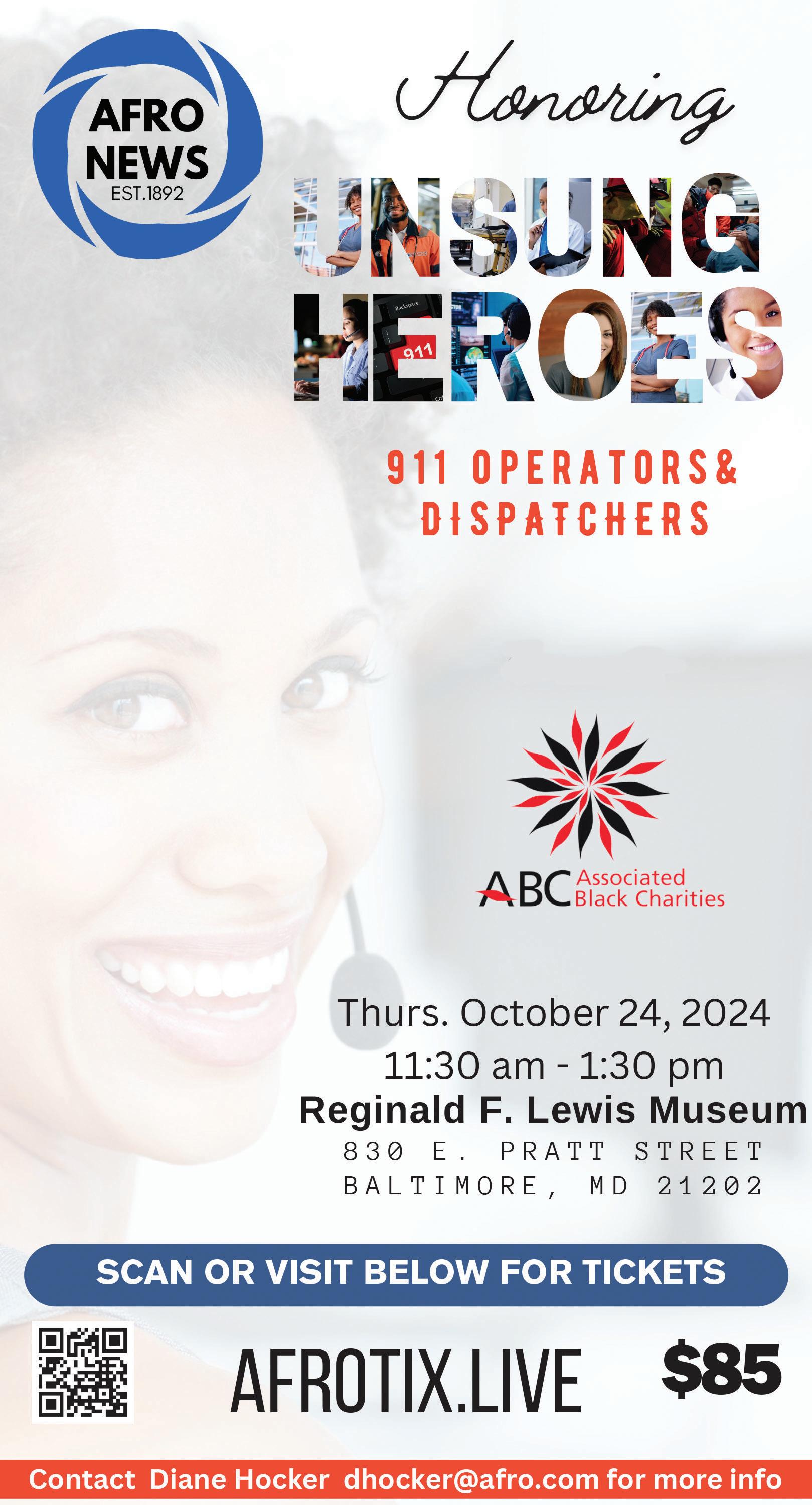
Continued from D1
it to you,” said Alsobrooks. “You should live beyond your wildest dreams. I believe that every one of you is owed by our country the real opportunity to have economic opportunity and to be able to buy homes for your families.”
“We want you all to have the technology, the jobs and innovation, all that you desire for yourself,” she said, adding that those present deserve to “ live in safe communities.”
For the young women present, Alsobrook said she’s running for senator to ensure they are able to make their “own decisions with privacy and freedom,” especially when it comes to issues regarding their bodies.
She spoke about the fight it took for African Americans to gain the right to vote in the United States and how she plans to fight against rights being taken away.
“I want you to have at
least as much freedom as your parents and grandparents. The voting rights that some of our foreparents fought for–they jumped in front of dogs and water hoses because they knew the importance of the right to vote.” Alsobrooks said. “We’re not going to let anybody take that right from us. We’re not going to have any right that belongs to us, taken from us. Be it the voting right, the right to control your body, the right to live in peace and dignity.”
Alsobrooks also said those in the LGBTQ community deserve “to live with dignity and to be treated with fairness.”
After speaking to the audience, she took time to speak to and take photos with attendees and members of campus organizations. Some students shared that they felt motivated after hearing Alsobrooks speak.
“I am very hopeful for the next generation and really inspired by the fact that there’s a Black woman that looks like me running for Senate,” Carlona Brevard, a senior political science major at Morgan State University, told the AFRO
“I am a political science major going into pre-law. Right now, I’m standing on this side of the fence, but one day I’ll be on the other.”
Tyler S. Dawkins, a freshman strategic communication major from Upper Marlboro, Md. spoke on what Alsobrooks’ senate run means to him and the Black community.
“I believe it’s important to elect Angela Alsobrooks into the U.S. Senate,” he said. “When people see her in the Senate, they [will] see their mom, their sister, their aunt, they [will] see themselves.”
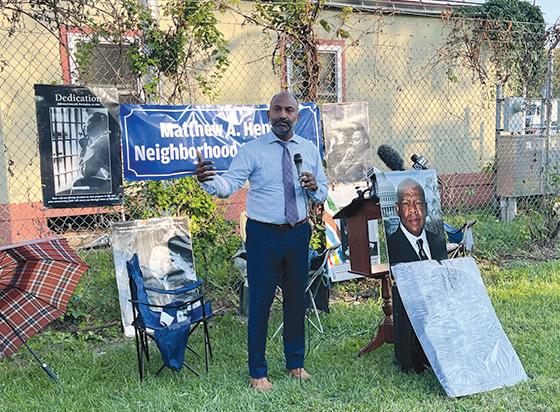
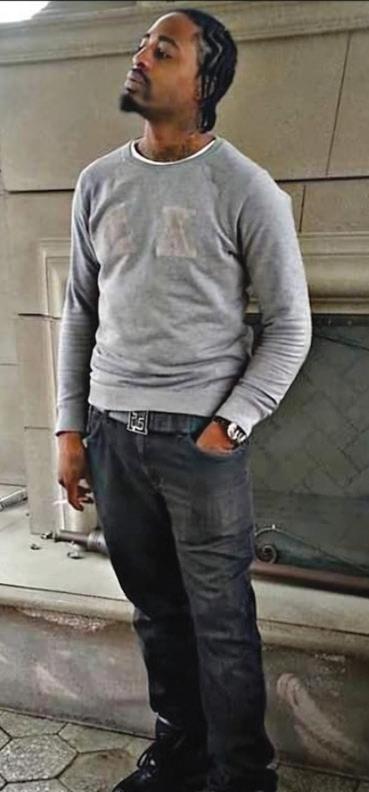
Continued from D1
The Baltimore City Council also held a hearing on the agency’s working conditions on Aug. 22. During that meeting, questions were raised about the decision to hire Conn Maciel Carey. Some council members asserted that the firm had a history of opposing Occupational Safety and Health Administration (OSHA) standards.
During the Aug. 28 demonstration, Batts and other speakers reproached the city for its response to the tragedy.
“It’s audacious for the city of Baltimore to appear at a city council hearing to report that they will address complaints by sending employees to the very human resources office that has violated their rights,” said Batts. “[It’s audacious] that they will use an outside law firm to review the cause and effect of lackluster management practices and failed oversight for safety that they had an obligation to correct with a sound system of
inspections, checklists, audits and accountability.” Thiruvendran “Thiru” Vignarajah, attorney for Silver’s family, said updates to DPW’s policies and procedures have been long overdue. Several speakers called attention to the 2019 death of DPW supervisor Trina Cunningham, who fell through a grated walkway into a wastewater treatment tank. An investigation by Maryland Occupational Safety and Health later revealed a number of hazards at the plant.
A July report from Baltimore Inspector General Isabel Cumming was also referenced. The review found dangerous working conditions in several DPW facilities. In some, workers did not have access to air conditioning or adequate water.
“Our inspector general responded to complaints that were filed two months before Ronnie died. Then, warning, after warning, after warning, and we still did nothing until

a man died,” said Vignarajah. “Then, all of a sudden, we all woke from our slumber and decided we suddenly cared.” He said that Silver’s family wants justice and to see meaningful change.
“I don’t know about you, but Ronnie’s mother, family, loved ones and children are not going to rest until every Ronnie Silver is treated with the basic decency and dignity that every worker, even the least among us, deserves,” said Vignarajah.
DPW worker Stancil McNair condemned agency supervisors during the rally. McNair has been vocal on Instagram about the unsafe and abusive working conditions he has encountered at the department for some time.
“You have supervision in place that doesn’t take you seriously,” said McNair. “They’re not scared because there’s no repercussions.”
He said, most recently, a co-worker called him seeking guidance after hurting his knee on the job. The co-worker said his supervisor did not believe him.
“The supervisor told him he couldn’t go to medical because she thought he hurt his knee at home,” said McNair.
He also called out AFSCME Local 44, a union that represents municipal workers in the city, for their perceived failure to address ongoing concerns from workers.
Union President Dorothy Bryant said that Silver’s death could have been prevented by agency management.
“Brother Silver’s death was entirely preventable, and his supervisor and manager did not do their job to protect the employee,” said Bryant. “At Reedbird and across the city, we have and will continue to fight for healthy and safe working conditions.”
housing costs.
“They have been for years, a beacon in their community to provide food even when Giant was there they still did a monthly food drop,” said Michael Hunt, an ongoing supporter of 40 West. “I got involved with them because personally I knew the struggle of my own family, my mom growing up. It was those types of places that provided what we needed, to survive and thrive.”
On the local level, presumptive councilmember of District 8 Paris Gray said he’ll make sure that he is connecting community members with employment opportunities, housing and food assistance through city services, while working with law enforcement and listening to concerns residents have.
Gray has worked under and will likely be replacing current councilman of District 8 Kristefer Burnett (D) on Nov. 5. Hunt applauded the work of current councilman of District 8 Kristefer Burnett and hopes Gray will follow suit. Gray said on day one he will continue efforts done under Burnett such as collaborating with grassroots organizations such as 40 West and work with the Maryland Food Bank to get fresh produce to residents in need.
Gray discussed one of the major issues impacting retaining grocery stores in Baltimore neighborhoods, theft.
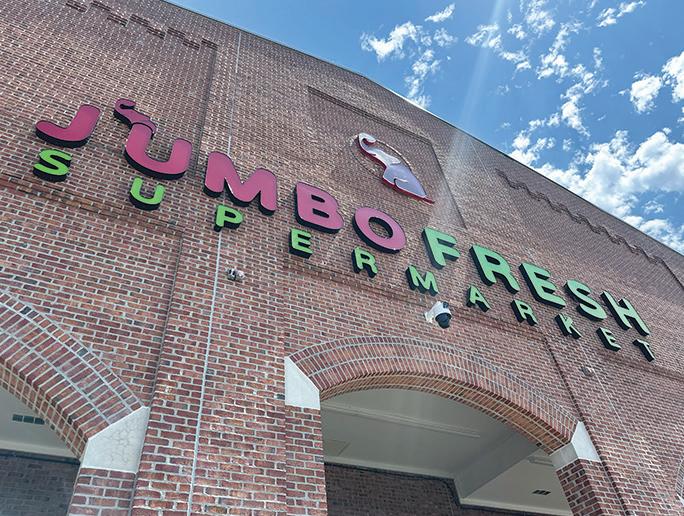
He believes the way to reduce theft is by ensuring people don’t go hungry.
“When people are coming in and taking food out of a
grocery store more than likely it’s because they need it,” said Gray.
When asked why he believes the food desert issue persists,
Hunt said he believes the issue is capitalism.
“It all goes back to money,” said Hunt. “Where politicians’ priorities are, particularly the
city council, is important to think about. I commend those who put food deserts on their minds as they support their communities, but I really feel
By Ariyana Griffin AFRO Staff Writer agriffin@afro.com
Coppin State University, a Historically Black University located in West Baltimore, has received $34,992 from the U.S. Department of State’s Increase and Diversify Education Abroad for U.S. Students (IDEAS) Program.
Coppin State is among 37 other colleges and universities selected to participate in the grant program. The funds will grow and diversify study abroad programs across the selected college campuses. According to information released by the United States Department of State, “Every year, more than 300,000 American students
study, intern, or volunteer abroad for academic credit on programs ranging from two weeks to a full academic year.”
These programs allow students to immerse themselves in another country’s culture and gain a new world perspective.
The U.S. Department of State created the IDEAS Program to allow American students to gain first-hand international experiences outside of the classroom and diversify study abroad programs.
“The U.S. Department of State is proud to support these U.S. colleges and universities as they build capacity for more American students to study abroad in diverse locations around the

like this requires our politicians to say ‘we are going to put finances toward this.’”
Hunt emphasized that people who are impacted by food deserts are taxpayers and that city funds in part come from them.
Hunt also highlighted the need for politicians to come together and work as a collective to invest in all of Baltimore’s food deserts.
“It requires local leaders to come together and figure out how they will progress,” said Hunt. “Elected leaders need to rise to the occasion as a collective.”
Some leaders and city officials in Baltimore are doing just that.
The Mount Clare community now has a Jumbo Fresh Supermarket at Mount Clare Junction. Councilwoman Phylicia Porter (D-District 10) collaborated with several officials and legislators throughout the city and state to raise more than $1.4 million to fight food insecurity.
The community lost its previous grocery store in 2022. Jumbo Fresh, which opened on July 31, provides residents with access to various meats, spices and organic produce.
Tavonia “Cookie”
a
told the AFRO she thinks adding the new store was a good idea. She believes the community needs both an option for “convenience and a market.”
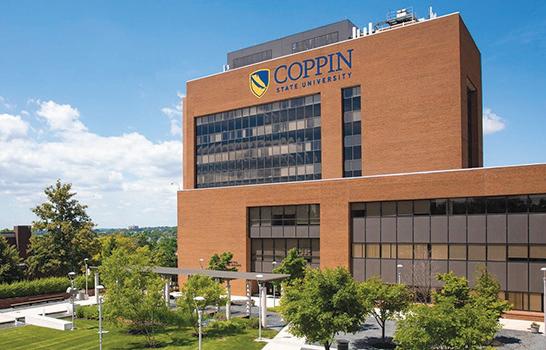
world,” said Heidi Manley, chief of USA Study Abroad, U.S. Department of State in a statement. “Increasing the number of U.S. students with international experiences is part of our investment in ensuring that our country’s future leaders have the skills they need in fields ranging from global health to technology and innovation.”
Students can look forward to the funds being allocated to a study abroad office, a resource portal specially for students, faculty, and staff who may be interested in available study abroad initiatives and a means to provide financial support to faculty.
“By leveraging these resources, Coppin State University will broaden its educational opportunities beyond campus borders, enabling students to
integrate into the global workforce through diverse learning and collaboration opportunities worldwide,” said Dr. Jale Aldemir, assistant professor, Coppin State School of Education in a statement.
Coppin State University looks forward to creating new international experiences for its student body while actively preparing students with the skills they need to make changes and an impact on issues that directly affect the diaspora.
The development of the study abroad office will begin in Fall 2024, allowing the institution to expand its international footprint for its student body. By Spring 2025, the institution is looking forward to students having the opportunity to apply for international programs.
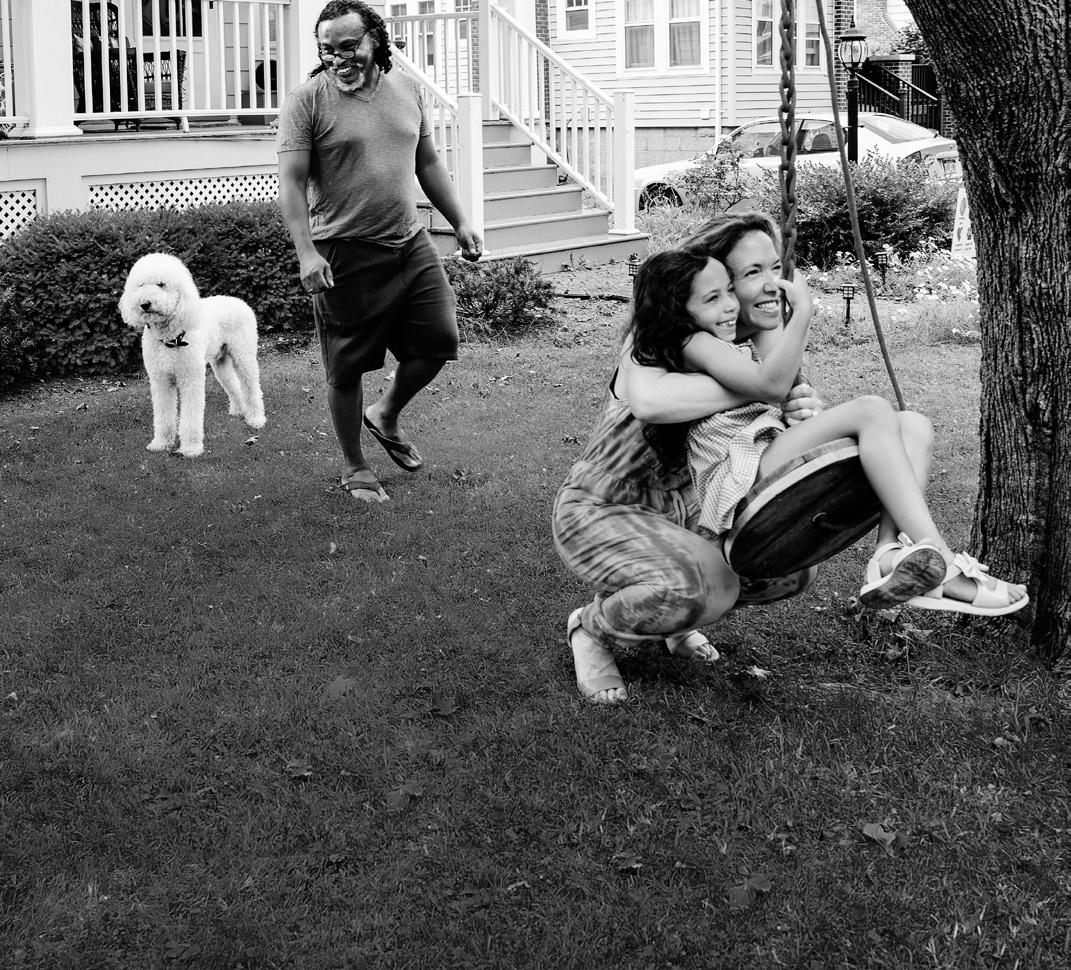

By AFRO Interns
On July 21, President Joe Biden shocked the nation with his decision to drop out of the presidential race and immediately endorse Vice President Kamala Harris for the role.
This summer, AFRO interns conducted interviews to ask two critical questions: “Do you think Kamala Harris will make a good president?” and “Can she beat out former President Trump to become the leader of the free world? Why or why not?”
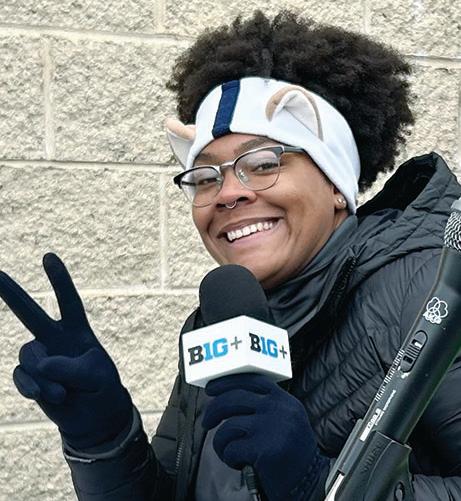
Q1: “I feel like she’ll make a great president– especially when you take into account women’s rights. It is important that we have a president that cares not only about women’s rights, but also human rights, which is most important.”
Q2: “Genuinely, yes, I do. A lot of people in this generation have been seeking a younger president. [With] her background, I think she has a really good chance, especially the Black vote.”
Alexa Henry, 23 North Campus Facilities Supervisor for the Baltimore Orioles, Commentator for B1G+ Mount Laurel, N.J.
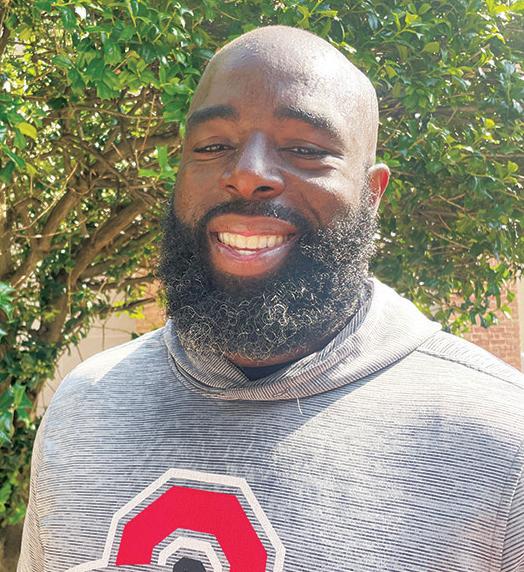
Q1: “I think anybody is better than the rightwing alternative.”
Q2: “No. I believe we have too many ignorant individuals out here, especially a lot that look like me – a Black man – with that slave master syndrome, who want to vote for Trump because it seems controversial, popular or whatever.”
Tarelle Baldwin, 42 Cyber Analyst Toledo, Ohio

The following AFRO Interns contributed to this report: Mekhi Abbott, Mackenzie Williams, Madeline Seck, Tierra Stone, Denim Fisher, Gabby Howard, Lizzie Suber and Saniyah Larkins.
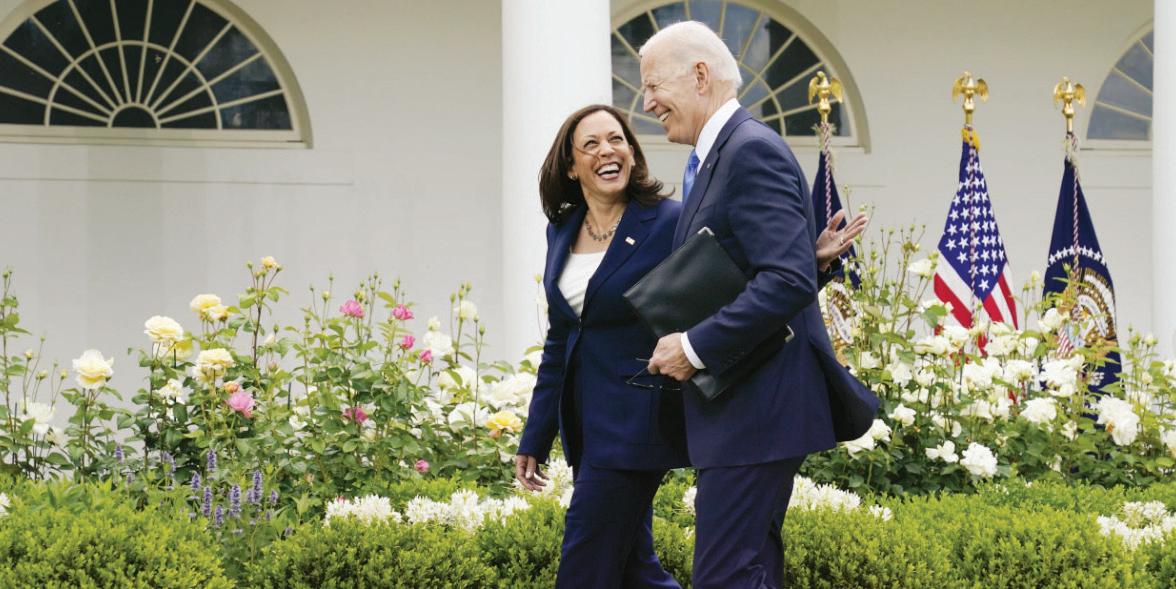
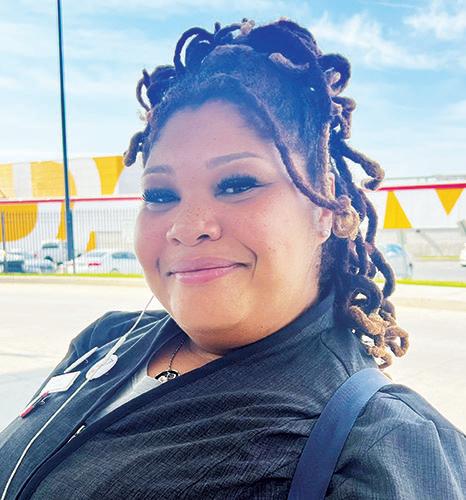
Q1: “It’s a lot of people that might speak and say ‘Oh she did this and she did that’ but where? If she’s going to be the president I need her to step up.”
Krystie Johnson, 34
Baltimore Native Housekeeper
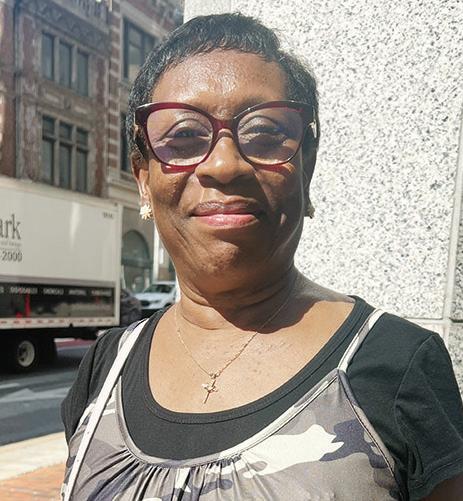
Q1: “I would hope so. I don’t know for sure but I hope she will.”
Q2: “I think she will make a good president because it would be nice to see a woman take the lead on something.”
Alice Eaton, 68 Baltimore Native Security Officer

Q1: “I hope she wins. I have a feeling.”
Q2: “She will be an effective president. I’ve heard her discuss a few things. She has my vote.”
Donald Comegys, 94
Baltimore native Retired City worker
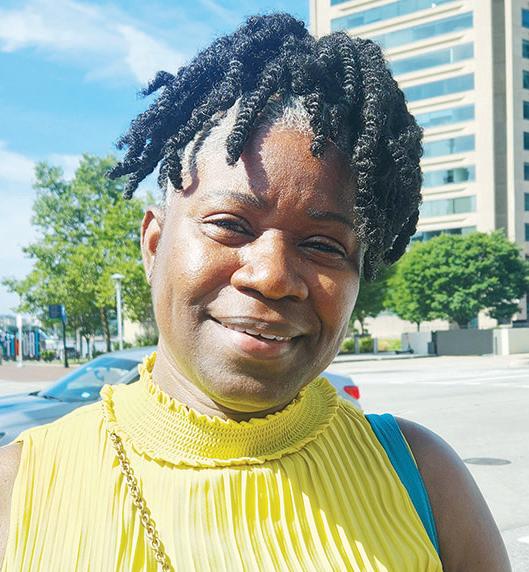
Q1: “I don’t know if Kamala will win, only because America is not ready for a Black woman. Is she capable? Yes, she is well capable. But is America ready for an AfricanAmerican woman?”
Q2: “Given her background, she is well educated and able to make choices that will be beneficial for the country. She is all about the people– not just one race– but all people.”
Susan Barber, 60 Charlotte, N.C.
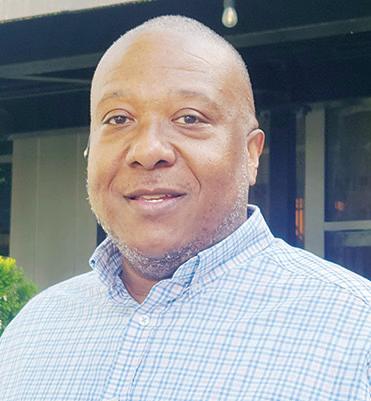
Q1: “This is not a slight on women, but I don’t know if our country is ready for a woman president. I don’t know if some of these White men will be ready.”
Q2: “Kamala had a lot of education. She’s a very intelligent woman. Her career speaks for herself. She’s done a lot of positive things in her career. She brings all of these things to the table. She’s qualified. If she does get it, they’re going to give her a hard time. It’ll be a big hurdle.”
Joseph Bowers, 54 Youngstown, Ohio Restaurant Owner
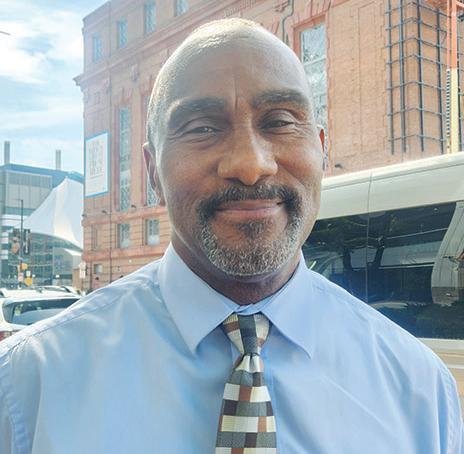
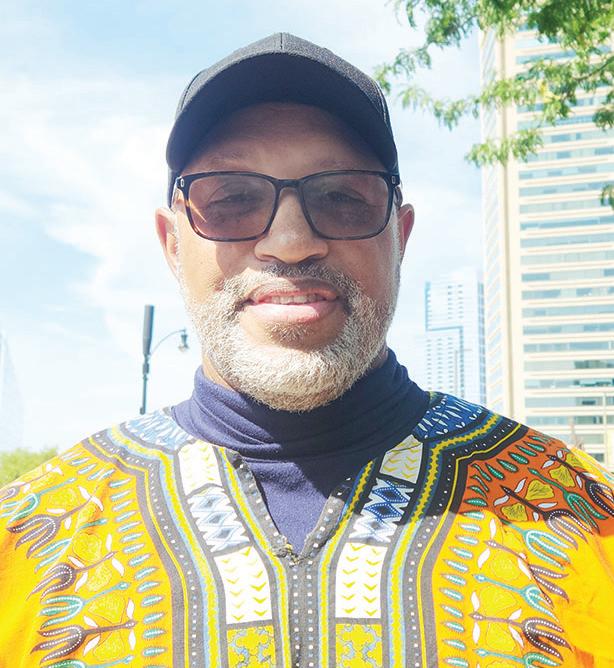
Q1: “Even though it looks good, right now we’re not ready for a female president. Right now, Donald Trump looks good, because he’s the only other man. Biden — another man — is not in there. If she gets a male assistant, a vice president that is strong on the Democratic side, she might be competitive. Right now, Trump has more push.”
Q2: “She doesn’t come across as being strong to me. When it comes down to military decisions, I don’t see her as a strong candidate for the United States right now. I could maybe see her as an assistant to Donald Trump.”
Walter Davis, 64 Seattle Retired
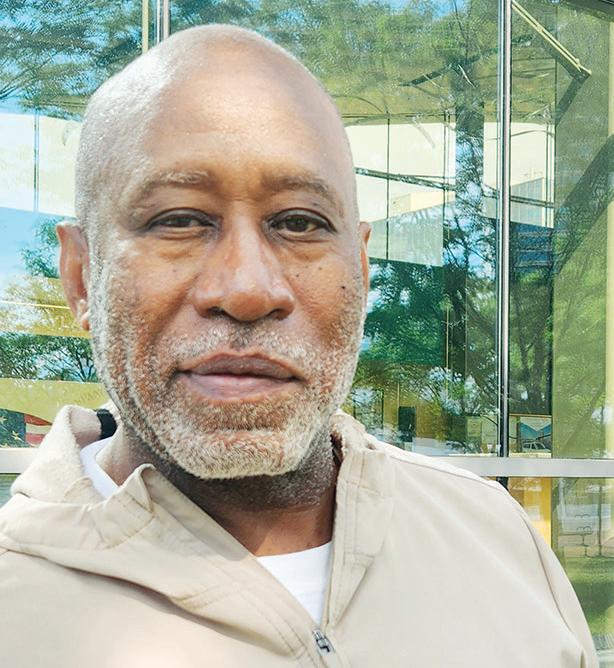
Q1: “She’s a lady. She had a good candidacy with Biden. She worked with Biden. She’ll win. I wish her well, we’ll see. I believe in her.”
Q2: “I sure hope so. It will be a good fight. She can win.”
Reginald Finney, 65 Baltimore native Retired
Q1: “It’s a no-brainer. She’s gotten 100 million dollars in donations.”
Q2: “Yes, Kamala would be effective. She has a legal background, and she’s already a vice president. The vice president does all the grunt work for the president — all the things the president doesn’t want to do, but the president gets all the credit. She’s already doing the job.”
Clarence Jones, 66 Harford County, Md. Accountant